You're currently viewing a custom sorting.

Star Trek Ent - 2x03 - Minefield
Originally Aired: 2002-10-2
Synopsis:
Enterprise becomes disabled by an alien orbital mine while trapped in hostile Romulan territory. [DVD]
Problems
- In TOS: Balance of Terror, Kirk and Spock had a conversation that explicitly stated that cloaking technology is "theoretically possible," and heavily implied that it had never been observed. The Suliban cloaking devices in this show have already complicated this, but given the likely presumption that the Suliban technology probably comes from the future, that's not that big a deal. But here we see the Romulan cloaking device itself depicted 100 years too early, forcing us now to assume that Archer didn't make a very thorough report to Starfleet after this episode, causing knowledge of Romulan cloaking technology to fade into the mists of history as quite uncommon knowledge so as to explain how Kirk and Spock could be so ignorant about it 100 years later. Honestly, would it really have been so hard to do this episode without featuring a cloaking device?
Factoids
- Reed suffers from aquaphobia.
Remarkable Scenes
- Reed's uneasy breakfast with the captain.
- Archer to T'Pol regarding the landing site for the planet: "Find a volcano with a gentle slope, preferably one that's not erupting."
- Enterprise slamming into a mine.
- T'Pol regarding why the beacons weren't revealing anymore mines: "They were designed to penetrate Suliban cloaking devices." Archer shoots her a quick highly annoyed look. T'Pol quickly says: "I'll try shifting the phase variance."
- Reed's spacewalk on the hull, examining the mine.
- The Romulan ship decloaking before Reed's eyes and firing warning shots.
- Archer: "Our friends seem anxious for us to leave. We're going to break orbit, nice and slowly." Reed: "Understood. If plan to go to warp, sir, you'll let me know?" Archer: "I'll try to remember."
- The mine impaling Reed.
- Reed: "I would consider letting you amputate but if chef got hold of it, he'd be serving 'roast Reed' for Sunday dinner."
- Reed regarding the painkillers: "Please sir... may I have some more?"
- Archer and Reed chatting while attempting to disable the mine.
- Archer saving Reed.
My Review
Romulans at long last. It's annoying that they're shown with cloaking devices when they were regarded as something new in TOS: Balance of Terror, but the problem existed since the first episode when the writers decided to give the Suliban cloaking devices. It's at least plausible that the Romulan cloak was defeated during the Earth Romulan war, and that in TOS: Balance of Terror they designed a more perfect cloak just as was done in TNG: The Neutral Zone to warrant the various reactions to the cloak seen over time. Anyway, enough of that. Minefield was the best Enterprise episode so far, besides of course Vox Sola which is an exception. I was hoping since day one that Enterprise would document the Earth Romulan war. This incident could very well spell the beginning of the said war. Besides the cloaking oddities, which really aren't that bad a continuity problem, the writers were true to TOS' portrayal of the Romulans. Spock said that in TOS: Balance of Terror that that was the first time the Federation had ever seen a Romulan. As unlikely as this may sound, the writers stayed true to it. There was no visual communication between the Romulans and Enterprise. I was also happy that first contact with the Romulans happened in this manner. The Klingons have been abused since the first episode, but this is just the abrasive first contact I would have expected to see with the Romulans. (The Klingons likewise, but oh well.) Finally, the interaction between Archer and Reed in this episode was great. Reed's interaction with Trip in Ent: Shuttlepod One was funnier, yes, but on the whole I found this episode to be vastly more entertaining and the Archer / Reed interplay was one of the reasons. Overall, most excellent. I want to see more like this!

Star Trek Ent - 2x22 - Cogenitor
Originally Aired: 2003-4-30
Synopsis:
Enterprise encounters a race called the Vissians who feature a third sex of "cogenitors" who are treated as second-class citizens. [DVD]
Problems
None
Factoids
- At this time, Earth has only discovered 92 naturally occurring elements.
Remarkable Scenes
- Trip asking T'Pol her age again when she admitted that in another 100 years she'd probably still be around.
- Trip discussing the cogenitor with Phlox.
- Phlox: "I imagine the cogenitor provides an enzyme, which facilitates conception." Trip: "What do you mean by provides?" Phlox: "Well, first the female has to..." Trip: "No... no, no. Don't tell me. I don't think I wanna know." Phlox: "Oh well. Hmm. I have pictures!"
- Trip: "They treat her like a pet. Kept in her room, not taught to read or write, no name. Porthos has a name!"
- Reed's cheese scene.
- Trip teaching the cogenitor to read.
- Archer: "I might have expected something like this from a first year recruit, but not you. You did exactly what I'd do? If that's true then I've done a pretty lousy job setting an example around here. You're a senior officer on this ship, you're privy to the moral challenges I've had to face. You know I've wrestled with the fine line between doing what I think is right and interfering with other species. So don't tell me you know what I would have done when I don't even know what I would have done!"
- Archer revealing to Trip that the cogenitor killed itself.
My Review
And Enterprise chalks up another winner. Multigender species is something Star Trek hasn't really covered, so the episode is refreshingly original. This episode was a joy to watch from start to finish. There are many quotable dialogs, more than I've marked. Nearly all the dialog was nicely pointed, showing intelligent writing. There were a few unnecessary details though. Similar to Ent: The Breach's climbing scenes, Archer's piloting extravaganza seemed to go on too long. We probably could have done without Reed's promiscuous behavior too. Finally, Trip seemed way too obsessed with the cogenitor. His constant changing of the subject in conversation got a bit tiresome. But these flaws are extremely minor. Archer's and Reed's more than positive first contact intensifies the magnitude of the effect Trip's actions had on relations. And while I probably wouldn't have been so hard on Trip if I were Archer, I can understand his reaction. Even if I don't agree with it. It's easier to understand Trip's position. The way the cogenitor was being treated most certainly looked like sexism. But then again, as the Vissian Engineer pointed out, and as T'Pol did in Ent: Broken Bow it's easy to incorrectly judge a culture which you don't understand. This makes the viewer come to his own conclusion. Were the Vissians practicing discrimination? Or were the humans making unfounded assumptions? These kinds of moral issues are exactly what make Star Trek so great.
The following are comments submitted by my readers.
- From Hkelukka on 2008-01-29 at 8:50pm:
I think archers whole argument imploder the second the cogenitor asked for political asylum. It became obvious that the starfleet of the day was not in the business of being a humanitarian, it was in the business of doing what archer wants. It is okay to stop a species from hunting another if the hunted gives Archer a vision of the girl of his wet dreams. But its not okay to grant political sanctuary to a creature who is kept solely as a sexual object with no rights and no education and when that person asks to be protected against his/her abusers she gets turned away as a indifferent "its not our problem, we just want the technology" and when that person then proceeds to kill him/herself archer gets angry at the one person in his/her entire lifetime to show compassion to him/her.
Personally i love this episode but archers charade about morality and all that made me see red. If i was Trip i would have decked archer by that speech even if i was to be cour martialed and shot. - From Bob on 2009-07-03 at 3:34pm:
Archer's decision was correct and followed the not yet constructed prime directive. The third gender makes up only 3% of the Vissian population. Imagine the effect on their population growth if this third gender did not spend all of its time aiding in reproduction. Human concepts of morality are not universal, and obviously a culture that obtained warp drive 1000 years prior to humans has carefully weighed its options, and humans have no right to judge and try to change their culture after meeting them for 3 days. - From carsonist on 2010-06-18 at 9:51pm:
I'm rather amazed no one seems to agree with Trip on this one. The cogenitors are slaves, pure and simple. The fact that they're necessary to reproduce doesn't mean they should be enslaved. Surely if there were only two sexes, and there were only three percent women, we'd object to treating them as property?
Just because it's a different culture doesn't mean they can't be wrong. - From Pete on 2010-08-06 at 1:45am:
The message that this episode seemed to promote was offensive to me. "Preserving culture is more important than basic human rights" seemed to be the gist of it.
Star Trek, and science fiction in general, has always been about allegory. To me, this episode was a defense of American slavery, radical Islam, and any other "culture" that impinges on human rights.
And to top it all off, Archer berates Tripp at the end to try and make him feel guilty for a suicide that could have been completely avoided had Archer saved the congenitor from a lifetime of slavery.
This episode was not thoughtful. It was not a discussion of "moral issues". The only character who even wanted to have a discussion about any moral issues was Tripp--portrayed as the naive, impulsive, stereotypical southerner, whose white knighting was quickly scoffed at by every other character on the show. Not what I have come to expect from Star Trek, but indeed, everything that I have come to expect from Bermaga. - From Jadzia Guinan Smith on 2010-09-02 at 5:32am:
I agree with the other commenters who found Archer's lecture troubling. It's fine to acknowledge the difficulties of navigating first contact situations and respecting alien cultures that present moral dilemmas, but why must he insist that those moral dilemmas shouldn't even exist? And to do it self-righteously, as though he had the moral high ground? It was painful.
By the way, taking a stance against the enslavement of a sentient being is not a species-specific "human" cultural preference. It's one of those few moral issues that really are universal. It really pisses me off when the yahoos that write this stuff dispose of these "human rights" questions with the tautological response that the relevant person is "not human." That's a cop out. This is about the rights of SENTIENTS. It would be much more interesting if the characters had the minimal sophistication to engage the question at that level.
It's true that a complex question developed with all its nuance intact can't be resolved in one episode. I think I speak for a lot of Tfans when I say that I would MUCH rather have an intellectually and morally satisfying LOOK into an issue and live with the lack of its resolution. I think Star Trek at its best does explore ideas that are too difficult to answer in an hour. To paraphrase what T'Pol once said to Hoshi: "if I hold you to a higher standard, Star Trek, it's because I think you're capable of achieving it."
By the way, why did T'Pol keep referring to the cogenitor as "she" after noting the error on Trip's part? It seems out of character. I think she stick to "the cogenitor" if not "it." This is really sloppy writing.
I would give this episode a 9 for addresing a very tantalizing topic but a 3 for executing it poorly. Final average = 6. - From siukong on 2011-01-31 at 9:06pm:
I agree that the cogenitor was having its rights as a sentient violated, but I also think that granting it asylum was the less ethical choice.
Sure, the Vissians are friendly to other species, but how do they treat each other? Have they had a past history of equality movements (between males and females, or between some other categorization)? How often do they reproduce, and what are the specifics of their reproductive cycle? If the cogenitors reproduced less often, would the population crash? Have the cogenitors always been such a minority, and have they always had such mental capabilities (maybe they had very small brains at one point)?
My point is that knowing so little about their society, granting the cogenitor asylum could have had many unforeseen repercussions. Perhaps doing so would have led to a backlash, with the cogenitors becoming even more oppressed. Perhaps there was already an equality movement in its infancy and this would have quashed it for another few decades. Perhaps it would have led to civil war, and the deaths of millions or perhaps even extinction. Would the freedom of one individual be worth the suffering of many?
I think by the time Archer had returned things had developed such that both alternatives were not particularly "moral" choices. If I had been in Trip's position I would have been much more gentle with the situation once it was apparent that the cogenitor's mental potential was the same as the other Vissians. Share the cognitive scans with them, and have an exchange on the relevant social history of both humans and Vissians (perhaps both could educate one another about gender politics). They seem like a enlightened, rational and compassionate species and would probably be open to a dialogue about it which could possibly nudge them towards change. Change rarely happens overnight (apart from revolutions, which are often chaotic and violent), so it would be necessary to overlook the inequality in the short-term in an effort to improve it in the long-term and on a broad scale. - From Tallifer on 2011-05-14 at 9:37pm:
I could understand the cold cruelty of T'pol, but Archer's passionate (!) defense of chattel slavery was infuriating. The writers also completely failed when they portrayed Tucker meekly accepting responsibility for the suicide: it is clear to any of us viewers that Archer was the one who could have prevented the suicide.
If the episode had portrayed the cogenitor in a more positive light, like a happy sentient puppy, it could have been argued that slavery was just another role in their society. But from the first scene in the dining room, it was clear that the cogenitor was dejected and hopeless. She was filled with joy and life once Trip intervened. - From -_Name_- on 2013-07-04 at 6:33pm:
I have another factoid for your enjoyment:
The Enterprise Motion Picture Library has "The Bride of Chaotica" in its Science Fiction database! Nice little throwback to Voyager. (pause frame at 29:03)
- - -
This was a rather stunning and unexpected episode... I'm not even sure what to add to the discussion. It *is* a little troubling that the episode seems to steer the viewer into cultural relativism... The message does seem to be: "don't do what compassion clearly tells you to do, b/c there may be things you don't understand and unforeseen consequences." On a gut level I have to disagree with this, but the interesting thing about this episode is that it is not entirely clear cut, at least not in this case...
As others have pointed out, there may be an almost biological necessity to this morally iffy situation... I'm reminded a little of how the males of cats and some other species have barbed penises (to make sure the sexual act is completed once initiated) and basically have to force the female into submission (the sexual struggle being one means of selecting for stronger genes). It seems cruel and unnecessary but this is what evolutionary adaptation has arrived at in some cases - it's what's required for the perpetuation of some species.
The analogy isn't by any means perfect, but nevertheless... That the cogenitors make up such a tiny percentage of the population and are necessary for the propagation of the species does make one pause, the biological issue does complicate the moral one.
The one thing I would've liked was more uncertainty and inner conflict on Archer's part... This very complicated issue gets a a very simplistic and unambiguous last word. Trip obviously questions his assumptions by the end of the episode, and it would've been nice if Archer did the same, at least a little bit. - From OmicronthetaDeltaPhi on 2015-11-01 at 6:22am:
It would have been a much better episode, easily worthy of a "10", if it somehow hinted at Vissian reproduction actually being dependent on cogenitor discrimination.
For example, after Trip taught the cogenitor to read, the Vissians could have told him that stimulating the cogenitor's brain in this manner destroyed its reproductive abilities. Naturally neither Trip nor Archer would believe them, but then Phlox would come in and confirm it.
Now *that* could have been a truly incredible episode. And it could serve as a nice "Prelude to the Prime Directive" background story, too. - From Zorak on 2016-10-04 at 11:36pm:
Though it was a somewhat predictable episode (you could tell from the second they showed a side view of the progenitor sitting at the table that the entire episode would be about "it"), it didn't quite go in the ultimate direction I expected. I expected Archer to impose his will on these people like he always does.
It seems lately that the writers have decided to keep the same theme of imposing Archers will on the galaxy, but injecting it into other characters. First Travis, then Phlox and Trip, and now entirely Trip.
If anything this makes Archer look like even more of a twat as they've now turned him into a complete hypocrite. He basically chewed out Trip for acting exactly like Archer himself acts in every previous episode.
I did not like this episode. By the end though, it wasn't as bad as I was expecting it to be. The writers simply shouldn't try tackling an issue they are completely unable to do any justice for, as they so often do.
The only real saving grace for this episode is that it didn't end on the typical grandstanding "happy go lucky, we are Archer, savior of the universe and all knowing guiding hand of all things righteous and good, all hail the great and holy Archer and praise be his name, Amen" ending we often get with these ridiculous morality plays the writers insist on.
Have I mentioned I don't like Archer?

Star Trek Ent - 3x08 - Twilight
Originally Aired: 2003-11-5
Synopsis:
A spatial distortion leaves Archer unable to form any new long-term memories. Years in the future, he wakes up one morning and is stunned to learn the outcome of the human-Xindi conflict. [DVD]
Problems
None
Factoids
- The human refugees settled on Ceti Alpha V, which is the same planet Kirk dumped Khan on in TOS: Space Seed. Sure would've sucked for them in a hundred years or so, if they were still around, when Ceti Alpha VI exploded!
Remarkable Scenes
- The teaser, depicting the sight of Earth's destruction... wow.
- Archer: "I suppose there's not much point in thanking me. A few hours from now I won't remember."
- The Xindi attacking Enterprise. I loved the scene when Archer fought the reptilian in his quarters, stabbing him with the statue of Zefram Cochrone.
- T'Pol's collision course maneuver.
- Trip laying into T'Pol for her collision course maneuver.
- Trip and Reed interrogating the Yridian. Nice connection with TNG and DS9.
- The space battle with the Xindi.
- The bridge of Enterprise being destroyed.
- Phlox' and T'Pol's death.
- The destruction of Enterprise.
- Phlox: "How do you feel?" Archer: "Like a shuttlepod landed on my head."
My Review
This episode is kind of a hybrid of TNG: All Good Things, DS9: The Visitor, and Voy: Before and After. There's a little Voy: Year of Hell in there too, regarding Archer's sacrifice. Yes, the episode is a conceptual rehash, but easily forgiven. I'd say episodes like this are less a rehash and more a tradition. Besides, the four episodes I previously mentioned were all spectacular, two of them even receiving a rating of ten. Well, one thing's for sure. T'Pol and Trip sure made bad captains! T'Pol permanently wrecks a warp nacelle and Trip gets the ship destroyed! Gold star! ;) We've seen Earth in jeopardy many times, even destroyed offscreen. But we've never seen Earth downright explode in an episode before. An interesting stunt to pull. Additionally, I was fascinated to see the bridge of Enterprise shot off during this episode, much the same way the viewscreen of the Enterprise E was blown out and the bridge was exposed to space in Star Trek X: Nemesis. Indeed, this episode features a myriad of wonderful visual effects. Aside from that, an obvious discussion point about this episode concerns the Archer / T'Pol relationship. We know, painfully, from Ent: A Night in Sickbay how much Archer is attracted to her, but this episode presents the information much more tastefully. Their relationship isn't elaborated a great deal though. It's hard to get someone to fall in love with you if they can't form any new long term memories. My one complaint about this episode is that it doesn't end the way DS9: The Visitor does in the sense that Archer did not retain a memory of the events. If he had, this episode could have easily been worth ten points.
The following are comments submitted by my readers.
- From Pete on 2011-01-05 at 3:25am:
Eh, a 9 is a bit generous for a Reset Button Episode. I think this was mainly an excuse for them to blow up Earth and the bridge of Enterprise. I would not put it in the same category as The Visitor (DS9). - From Zorak on 2016-10-09 at 9:28am:
It took the destruction of Earth, the near genocide of the human species and what is truly one of the most heartbreaking of medical conditions to make me feel some level of sympathy for Jonathan Archer.
I have always been fascinated and quite moved by cases of loss of long term memory formation. I was pretty shocked to see them explore it here. I was even more shocked that the story centered around it was actually quite coherent, not to mention interesting and moving.
It's a nice change of pace to see Enterprise tackling an issue other then "-ism's are bad" and do something challenging.
The only thing that really bothered me was the (inevitable) use of the only way to make Archer seem like a good captain, which is to make the people around him incompetent by comparison. This is why T'pol and Trip had to be "bad captains". I understand they had to lose to the Xindi and I don't even blame them for writing this into the episode. It's just a reminder in a great episode that I am still watching a poorly (often, not always) written series.
I agree though, this was a great episode. I don't even mind that it is a "reset button" episode. They tried to make "The Inner Light" and "The Visitor", and for Enterprise, they did a good job of it. I also agree that it would have been nice to have Archer retain some shadow of a memory of what happened. A total reset was uncalled for (a bit ironic though, now that I think about it.. given the premise).

Star Trek Ent - 3x23 - Countdown
Originally Aired: 2004-5-19
Synopsis:
With help from Xindi allies, the Enterprise crew attempts to stop the arming of the Weapon aimed toward Earth. [DVD]
Problems
None
Factoids
None
Remarkable Scenes
- Dolim explaining to Hoshi why he needs her.
- Dolim injecting Hoshi with neural parasites.
- Archer meeting with the aquatics.
- Hoshi trying to kill herself rather than help the reptilians.
- Trip: "Can you imagine the look on Soval's face when he sees her in a Starfleet uniform?" Heh... I can. Remember Ent: Twilight?
- The battle at the weapon.
- The destruction of the aquatic vessel.
- Hayes: "I could use a change of scenery!"
- Hayes taking injury during transport!
- Hayes' death.
- The reptilians betraying the insectoids.
My Review
Ent: Countdown is an amazing action thriller, a wonderful climax to the Xindi arc. Yet another great character dies... Hayes. And we're left with yet another cliffhanger. But overall, I didn't really care because the episode was just so much of a fun ride. I complained in my last review about the reptilians and insectoids being shown as too stereotypically evil with the single exception of the one reptilian officer who questioned the sphere builders. I was pleased to see that the insectoids were beginning to question the sphere builders as well at the end of this episode. This means that only Dolim is a ridiculous, overzealous, arrogant moron and not the entire reptilian and insectoid Xindi species. The Xindi arc comes to a head here, of course. The space battle shown here is even more spectacular than any of the previous ones. We don't know the aquatics very well, but the destruction of their ship was downright sad. As much a loss as Hayes and Degra were. There were two scenes in particular where (good guy) Xindi ships were destroyed that were unbelievably visually impressive. And of course the way that Hayes died is an interesting point of discussion as well. It's always nice to see that 22nd century technology isn't infallible. I was annoyed that the transporter was sufficient to beam in four people at once, but the episode kind of redeemed itself when Hayes was able to be shot during transport. I'm not sure how all the mechanics of that work out, but I'm sufficiently convinced it's at least possible, even if the same thing happened to Archer (among other people) earlier in the series and he wasn't hurt. A final remark, Linda Park did an excellent job playing Hoshi in this episode and I thought it was an excellent use of her character, for once.
The following are comments submitted by my readers.
- From Pete on 2011-01-11 at 12:55am:
Hmmm...Major Hayes was killed in a similar manner as the character Dobby was killed in Harry Potter and the Deathly Hallows. Did J.K. Rowling plagiarize from the great Brannon Braga? We will never know!

Star Trek Ent - 4x07 - The Forge
Originally Aired: 2004-11-19
Synopsis:
Earth's embassy on Vulcan is bombed, and the ensuing investigation puts Archer and T'Pol on the trail of a Vulcan religious faction hiding in a treacherous desert. [DVD]
Problems
- So if it took Vulcans 1500 years to recover from their wars and begin space travel and Surak lived 1800 years ago, it can be inferred that Vulcans have been in space for 300 years. This is a far too short period of time, why, even the monastery on P'Jem is supposed to be 3000 years old, which is before the time of Surak! Maybe Vulcans had space travel many years before their great wars, then fell into a bout of war, and Surak returned them to their original golden age?
Factoids
- T'Pau is 32 years old in 2154.
Remarkable Scenes
- Soval and Forrest discussing Vulcan's relationship with humanity.
- Soval: "We had our wars Admiral, just as Humans did. Our planet was devastated, our civilisation nearly destroyed. Logic saved us, but it took almost 1,500 years for us to rebuild our world and travel to the stars. You Humans did the same in less than a century. There are those on the high command who wonder what Humans would achieve in the century to come. And they don't like the answer."
- Phlox... the natural at basketball.
- Reed and Travis discovering another bomb in the Earth embassy on Vulcan.
- Soval vouching his support for Archer beginning his own investigation.
- Trip referring to the Forge, a Vulcan desert, as a "hell hole."
- T'Pol: "Over the centuries his followers made copies of his teachings." Archer: "Let me guess, With the originals lost whatever's left is open to interpretation." T'Pol: "You find this amusing?" Archer: "I find it familiar."
- Archer and T'Pol being chased by a sehlat.
- T'Pol regarding domesticated sehlats: "They're smaller, slightly." Archer: "How slightly?" T'Pol: "You have Porthos." Archer: "Porthos doesn't try and eat me when I'm late with his dinner." T'Pol: "Vulcan children are never late with their sehlat's dinner." Archer: "I can believe that."
- Archer regarding the sehlats: "Sounds like that Klingon opera that Hoshi made us listen to."
- T'Pol telling Archer about her lack of need for water for several more days and about her inner eyelid, a nice connection with TOS: Operation: Annihilate. I like her little quote, justifying these physical qualities... "My species evolved on this planet." As if to say, why didn't you know these things about us?
- Arev: "What is Kiri-kin-tha's first law of metaphysics?" Archer: "I'm familiar with Newton's first law of motion. I imagine they're pretty much the same!"
- Soval performing a mind meld on the comatose witness to the bomber.
- Arev giving Archer Surak's katra.
- Archer finding the Syrranites.
My Review
This episode is the culmination of the odd Vulcan behavior arc that Enterprise started and never went anywhere with since the pilot. The new showrunner, Manny Coto has become the loose thread man. We learn in this episode that the root of the "evil Vulcan syndrome" is not just a conservative vs. liberal societal clash like we were led to believe in episodes like Ent: Fusion and Ent: Stigma, but in fact has more to do with the Vulcan religion centered around Surak (which is somewhat similar to Buddhism) and the two different interpretations of it. This nicely parallels human history and serves as a marvelous explanation for the behavior of the Vulcans over the last few seasons. The bombing of the Earth embassy on Vulcan and the handling of the situation couldn't have been more perfect. The tragic loss of Admiral Forrest brings out the true loyalties in Soval, and we finally get to see the guy stand up for what he believes in, performing a mind meld against the High Command's wishes. It can be inferred that sometime between now and TOS that the Syrranites will prevail over the Vulcan High Command--this may perhaps have something to do with why the Federation is formed--for all Vulcans will believe as Arev and T'Pau do. In fact, we know T'Pau from the previous Star Trek episode TOS: Amok Time. She performed Spock's wedding ceremony and was a respected figure at that time. (And very old!) Indeed, this episode is a continuity gold mine. Firstly, when Archer received Surak's katra from Arev, Arev spoke the same words Spock did to McCoy in Star Trek II: The Wrath of Khan... he said "remember," albeit, in Vulcan. We also get to see a sehlat for the first time since TAS: Yesteryear. We get another mention of the Vulcan inner eyelid that was first revealed by Spock in TOS: Operation: Annihilate. We get to see the T'Karath Sanctuary again, which was last featured in TNG: Gambit, Part II. A Surakian artifact was discovered there 12 years prior to this episode. This detail is fascinating seeing as how it was stated in the TNG episode that one of the last conflicts of the Vulcan civil war was fought there. A marvelous site for the discovery in this episode. Finally, the two questions that Ariv asked Archer regarding Vulcan philosophy were taken directly from the questions that Spock was asked by the Vulcan computer in Star Trek IV: The Voyage Home during his re-education. Obviously, Manny Coto has done his homework. Bravo.
The following are comments submitted by my readers.
- From EvanT on 2011-06-24 at 8:51pm:
I think it's fair to say that Vulcans already had warp travel during the Awakening. After all this is the time that the Romulans leave Vulcan ("those that marched beneath the raptor's wings"?) and obviously they didn't reach Romulus on sub-light speeds.
It's reasonable to assume that Vulcans suspended their deep space exploration until they could rebuild and 1500 years is what? 30 something generations? (perhaps less) It's not that much time to rebuild a society and restructure it around an entirely new philosophy, working out the problems as they went. And I DO believe that the general tone in Star Trek is that Vulcans take things slow and don't rush (similar to D&D elves) simply because they can afford it due to their lifespans. - From Mitch89 on 2013-01-04 at 11:38am:
The parallels to the DS9 two parter "Homefront" and "Paradise Lost" is astounding, right down to the actor playing the crazy power hungry leader trying to take control of everything!

Originally Aired: 2005-2-4
Synopsis:
Archer tries to unify the Andorians, Tellarites and Vulcans in a plan to capture a marauder ship threatening to destabilize the region. [DVD]
Problems
- The pale skinned Andorian pilot was clearly a "pinkskin" type alien when you viewed his neck in this and the previous episode. He was not turned into a blue skinned alien until his helmet was removed at the end of this episode.
Factoids
- This episode features two Reman guards. The Remans were featured for the first and only other time in Star Trek X: Nemesis.
- The drone prototype ship is a modified warbird.
- The Kumari was named after the first ice cutters to circumnavigate Andoria.
- Andorian metabolism is higher than that of humans.
- Antennae take nine months to grow back.
- It would seem given Shran's reaction to losing an antenna, that the antenna are necessary for balance.
Remarkable Scenes
- Archer getting the Andorians and Tellarites to work together.
- Reed saving Trip from the Romulans.
- Reed blowing up a power conduit disabling the Romulan link to the drone ship.
- Archer taking
- Reed: "You're good at building things, I'm good at blowing them up."
- Travis and Hoshi looking for a loophole.
- Archer receiving fighting advice from Hoshi, Gral, and Phlox.
- Archer's fight with Shran.
- Archer cutting off one of Shran's antennae!
- Enterprise battling the drone ship.
- The drone ship performing some crazy maneuvers.
- Trip and Reed diving out of the drone ship so they can be beamed aboard.
- Alliance ships arriving to continue the battle against the drone ship.
- Enterprise rescuing Trip and Reed.
- Trip pulling Reed's leg. Trip's taking out what Archer did to him in Ent: Babel One on Reed. ;)
- The sight of Shran and Gral making up in the end and the joint fleet.
My Review
This episode is one of the best ones shown yet on Enterprise, and certainly one of the most memorable. It's fairly obvious that this episode is supposed to serve as a precursor to the alliance that humans, Vulcans, Andorians, and Tellarites will one day form as the founding members of the Federation and it was done well here. What I liked most was the fight between Archer and Shran. I was thoroughly convinced one of them would die and was pleasantly surprised when Travis and Hoshi found a way for that not to happen. Additionally, I was glad to see Travis and Hoshi play a real role in the story for once as well. Archer cutting off Shran's antenna is of course an homage to TOS: Journey to Babel in which we saw the antenna of a fake Andorian break off, which was nicely clever. The whole incident served as marvelous character development for Shran and Archer. I really like the relationship those two have forged. Besides that, Trip's and Reed's escape from the Romulan drone ship was extremely exciting to watch. I loved how they just dived into space like that, and finally the special effects depicting the arrival and departure of some of the alliance ships were just spectacular. Ent: United is showing us a pattern of writing not present in seasons 1-3. Manny Coto is taking this show exactly where it needs to go, but too little too late. Maybe if we could have had Coto as the showrunner from the beginning, Enterprise would have more than 4 seasons. Season 4 has been excellent so far, but it's too little, too late.
No fan commentary yet.

Star Trek Dis - 1x02 - Battle at the Binary Stars
Originally Aired: 2017-9-24
Synopsis:
Face to face with Klingon vessels, the U.S.S. Shenzhou prepares for the possibility of war if negotiations fail. Amidst the turmoil, Burnham looks back to her Vulcan upbringing for guidance.
Problems
- Just when we think the Klingon forehead problem is solved, it turns out that just a decade before every Klingon is shown to be human-like, the entire Klingon high council is shown to have bumpy foreheads and no hair. At this point the best rationalization is to say that Klingon fashion is mercurial...
- In keeping with our fashion problems, the uniforms shown in this series are quite problematic. This series takes place two years after TOS: The Cage, and yet the uniforms look nothing like either The Cage or any of the material aired in later TOS episodes. To rationalize this one, we have to assume that like the uniform confusion in ST VII: Generations, Starfleet was playing around with different uniform designs and different ships got different uniforms...
- Which brings us to the ship interiors! Like the uniforms, we have to assume that Starfleet was experimenting with different industrial designs along with different uniform fashions. Notably, the Shenzhou is stated to be an older design. Indeed, it looks more like Star Trek: Enterprise than TOS. Perhaps all the ship interiors seen on this series are the older design along with the uniforms too?
- A member of the Klingon high council was depicted as female. This seems pretty unlikely given that in DS9: The House of Quark it was established that Klingon females cannot lead Klingon houses without a special dispensation. Likewise, the Duras sisters on TNG used a puppet male heir to control the House of Duras, as females were not allowed to lead a great house. It's possible the Klingon female in this episode did indeed possess a special dispensation though. It's also possible that Klingon culture was less sexist during this time period.
- Burnham's chance of survival for that decompression was probably much higher than 43%. So long as she exhaled first to prevent injury caused by holding her breath, there was little reason to doubt her survival absent perhaps the radiation concern from the binary stars.
Factoids
- Burnham arrived on the Shenzhou in 2249, seven years prior to the start of the series.
- This episode establishes that Burnham is the only human ever to attend the Vulcan Learning Center and the Vulcan Science Acadamy.
- The Shenzhou is stated to be an old ship.
- This episode establishes that T'Kuvma invented the modern Klingon cloaking device.
Remarkable Scenes
- Burnham's flashback to her awkward first meeting with Georgiou.
- Georgiou relieving Burnham of duty for insubordination.
- T'Kuvma summoning the entire high council to the beacon.
- The Klingons attacking.
- Connor: "Why are we fighting? We're Starfleet. We're explorers, not soldiers."
- Connor being suddenly blown out into space by battle damage.
- Sarek rescuing Burnham with a mind meld in a flashback. One wonders if Picard acquired Sarek's memories of Burnham from TNG: Sarek?
- Burnham observing the space battle through the brig forcefield into open space.
- The Shenzhou being rescued by the Europa.
- The Europa being bisected by a kamikaze strike from a Klingon vessel.
- The Europa self-destructing to take out the Klingon ship that rammed it.
- T'Kuvma leaving survivors only to serve as witnesses to his victory to spread fear throughout the Federation.
- Burnham talking the computer into letting her jump through a vacuum. While Kirk talks computers to death, Burnham talks computers into saving lives!
- Georgiou bombing T'Kuvma's ship using a dead Klingon body being retrieved.
- Georgiou and Burnham attempting to capture T'Kuvma only to see Georgiou killed by T'Kuvma and T'Kuvma killed by Burnham.
- Burnham being court martialed, convicted, stripped of rank, and sentenced to prison.
My Review
Star Trek: DiscoveryShenzhou kicks into high gear in this thrilling followup to the pilot's cliffhanger at the end of the first episode. It's nice to see lasting, painful consequences result from Burnham opening pandora's box with the Klingons. Georgiou is tragically killed, T'Kuvma is martyred, and Burnham is in prison for starting a war! Having the main character's life permanently upended in this way sets the stage for a kind of drama never before seen on Star Trek, a welcome change of pace.
This skillfully-written episode makes good use of foreshadowing and parallelism. Burnham's character is shaped by a traumatic attack by the Klingons which killed her parents, leaving her a ward of Sarek. While not depicted in as much detail, it turns out a parallel story played out for T'Kuvma as well, as he apparently lost his parents at a young age too and likewise engaged in a process of self-discovery after "discovering" his father's ship and vowing to restore honor to his house.
Their similar childhoods ironically make them particularly hostile to each other: Burnham fears the Klingons as much as T'Kuvma fears the Federation. Burnham is afraid that the Klingons could take something or someone else dear to her and T'Kuvma sees the Federation as an existential threat to Klingon identity.
Indeed, both of them suffer exactly that which they fear most. T'Kuvma succeeds in provoking a war with the Federation, but in addition to costing him his life, we know from other Star Trek productions that the war doesn't end well for the Klingons. Likewise Burnham watches Georgiou die at T'Kuvma's hands. Then in her moment of grief with her self-esteem at perhaps an all time low, she declares, "We are at war and I am the enemy," shortly before being stripped of rank and sentenced to prison. All this was nicely foreshadowed in the previous episode when Georgiou said to Burnham, "I trust you with my life, but it doesn't change the fact that you're lost." Georgiou's trust was misplaced and Burnham is even more lost now than she may have been before.
Another interesting piece of perhaps unintentional foreshadowing from the previous episode is when Georgiou asked Burnham in the desert how long the storm would take to come crashing down on them. She estimated one hour, 17 minutes, and 22 seconds, or roughly 77 minutes. If you think of the coming of a storm as a metaphor for the battle with the Klingons, the grimmest part of the battle for our heroes is roughly 77 minutes into the screen time of the Star Trek: DiscoveryShenzhou series so far.
While this episode is terrific overall, there are some flaws to take note of. Aside from the copious continuity problems introduced here and noted above, Sarek's mind meld across a thousand light years of space due to some kind of subspace katra bond strains suspension of disbelief pretty hard. And what was with that ridiculously dark room the court martial was conducted in? Shadowy figures convicting our hero isn't dramatic, it's dumb. Do judges in the real world turn off all the lights for dramatic effect when sentencing criminals? No. So turn on some frigging lights!
Those are small nitpicks for the most part though and by and large this was a fantastic piece of drama. Putting Burnham in such a dark place (the figurative part anyway...) is an incredibly compelling way to set up a gripping story about how she grapples with both her personal losses and her responsibility to Federation society for having started the war with the Klingons. It seems clear that Star Trek: DiscoveryShenzhou is not at all interested in repeating Star Trek: Enterprise's mistake of failing to depict the single most important event in the historical canon of the era that it is depicting. Enterprise failed to depict the Earth-Romulan war even with four seasons. But this series started the war with the Klingons in episode two. And that's awesome.
The following are comments submitted by my readers.
- From Mike Chambers on 2017-09-25 at 2:57pm:
Here I am the morning after Discovery debuts, thinking "I wonder if there's a review on kethinov.com yet", and of course there is! You're definitely on top of things.
I've had my worries about how this show would turn out for multiple reasons, and I'm happy to report that so far, my fears have largely been allayed! I am extremely impressed with the first two episodes. It feels very much like Star Trek, but perhaps with a bit of a darker tone than previous series. I may be disappointed in the future if it turns out that the entire series is this dark, as Star Trek is supposed to be optimistic overall.
There is excellent drama here, and they have done a fantastic job so far with building these characters. I'm looking forward to seeing how their situations evolve from this point, and I am now officially excited to see future episodes.
My only real problem is political in nature. They appear to be using the Klingons as an allegory for nationalists, but are mishandling it. They seem to be ascribing a bit of a racial purist motive to it, rather than the cultural and civic nationalism ideals to which the vast majority of nationalists actually adhere to. It's annoying, but this is a product of the entertainment industry, after all. It would be asking a bit much for them to understand the country outside of their bubble, so I'm not letting it ruin my experience.
I have thoroughly enjoyed Discovery so far, and I want more! - From Rick on 2017-09-25 at 9:56pm:
Star Trek being all about war is not Star Trek to me. It appears that this series will be about as far from Roddenberry's vision as possible, as all new productions since Enterprise have been. I understand that these type of stories are the modern tv way, but that way is not for me and apparently Star Trek no longer is either. - From Matthew on 2017-09-26 at 7:16pm:
I found this gripping, particularly the last act of this part which sums up both my excitement and concern for how this series could go.
It features principle and bravery plus the protagonists' plan not going their way with (crucially) very real consequences - that feels quite liberating in that it opens up a rich seam of story-telling. Even 'In the Pale Moonlight' (DS9) doesn't quite go that far (though that's a great episode and I bet the writers took some inspiration from that great 'It's a FAAAAKE' moment!) That could be the foundation of a great series. On the other hand, I worry slightly about the world-building and tone being undermined by aesthetic choices about it being a 'darker' show. That crass scene with the judges' faces in shadow was seriously grating and I'm glad it didn't just bother me.
We'll see how it evolves - I'll definitely be watching (and I'm glad that we don't have to pay 6 dollars a month on top of Netflix to get it in the UK - my other big worry is that the economics don't work out for CBS and that it dies a death nothing to do with its creative merits!) - From Graham Bessellieu on 2019-07-14 at 7:50am:
All about flash; lacks the heart of the best of Trek. - From Mike Chambers on 2020-08-22 at 2:01am:
I happened to be browsing this site again three years after I made that comment up above, and I think I need to officially retract everything I said about Discovery.
I couldn't make it past around halfway through the first season. The depressing darkness and violence just never let up, and I ended up not really caring about the characters.
I agree with Rick and Graham. This is not Star Trek as it should be. The Star Trek we've all come to love. Some might say that things can change. Yeah? I guess, but if this is how it's going to be, CBS can count me out as a continuing fan.
Picard isn't good either, and a lot of the reasons overlap. Kurtzman's gotta go. - From Azalea Jane on 2021-09-06 at 4:25am:
It's weird having it stated/assumed that Burnham somehow started this war. No she didn't. T'Kuvma was determined to start a conflict. He damaged that relay to lure the Federation out to the beacon and attack them. I don't think Burnham's "shoot first" strategy would have worked either; that would have just convinced T'Kuvma even more that the Federation was out for them. The Klingons were going to start shooting either way. No, I think that, short of the Shenzhou high-tailing it out of there immediately, there was nothing that was going to prevent a conflict. Burnham is just a scapegoat. Moreover, despite various comments I've read that accuse her of this, Burnham isn't responsible for Georgiou's death; Georgiou is. As the captain, she made the call to take Burnham's advice of attempting to capture T'Kuvma. She knew the risk and took it.
Life in prison seems super harsh! I could understand being dishonorably discharged, and perhaps face some other consequence, but life in prison?? That's for premeditated murder or something. Burnham didn't murder anyone; she accidentally killed the torchbearer and then she killed T'Kuvma in battle. Mutiny isn't a life offense. Neither is a Vulcan neck pinch. You'd think that, 250ish years into humanity's future, we would have moved beyond such blatantly punitive "justice". Life in prison or quarantine should really be reserved only for people who truly cannot be rehabilitated or reintegrated into civil society without posing a danger. Well, maybe subsequent episodes will help this make sense more. So far I've only watched these two. (And yeah, the shadowy courtroom was cheesy as hell.)
I thought the connection to Sarek was interesting. In 2256, Sarek would have been 91 and Spock 26. I agree the thousand-lightyear telepathic phone call was stretching it, but I suppose stranger things have happened in Trek.

Star Trek Dis - 1x09 - Into the Forest I Go
Originally Aired: 2017-11-12
Synopsis:
Bypassing Starfleet's orders, Lorca uses the U.S.S. Discovery crew's ultimate asset, the ship itself, in an effort to end the war with the Klingons once and for all.
Problems
- Since It seemed clear that Lorca didn't know there was anyone aboard the ship of the dead who needed rescuing, then if Lorca's intent was to destroy it rather than take it over, why not just beam a bomb onto the ship instead of an away team? Some technobabble about the ship having explosion suppression tech would've been nice here.
Factoids
- The title of this episode is a reference to a quote by John Muir: "And into the forest I go, to lose my mind and find my soul."
- The writers chose 133 spore jumps as an homage to the Battlestar Galactica episode "33."
- At one point in the episode, Stamets offers to take Culber to see a performance of the opera La bohème. The writers chose that specific opera because the actors Anthony Rapp and Wilson Cruz had both previously performed in a musical called Rent, which is based on La bohème.
Remarkable Scenes
- Tilly idiotically blowing Stamets' cover to Culber.
- Discovery engaging the ship of the dead.
- Burnham discovering Admiral Cornwell still alive while Tyler encounters L'Rell again.
- Burnham revealing herself to Kol to distract him to prevent him from ordering the ship of the dead to go to warp.
- Burnham provoking Kol into a duel.
- Discovery destroying the ship of the dead.
My Review
A fantastic story from start to finish with only minor things to quibble with. The most important thing this episode needed to clarify was just what was going on with L'Rell and Cornwell in the last episode and we thankfully got that clarification. Well, mostly. Was Cornwell really dead? Nope. Did L'Rell intend to deceive Kol and revive her after staging the fight where she killed her? Probably. Did she succeed in deceiving Kol about Cornwell being dead? Unclear. Also unclear is how exactly she managed to revive Cornwell. The most interesting revelation in this episode though was that Tyler was repressing the trauma he experienced from L'Rell's prior torture and that she continues to have some sort of hold over him. At the end of the episode, she says to him, "Do not worry, I will never let them hurt you. Soon..." which strongly implies that she has some kind of plan for him.
Given the conspicuous absence of Voq since L'Rell informed him he would have to sacrifice "everything" in order to go on and then the sudden appearance of Tyler directly afterward who also just so happens to seem to have some deep connection to L'Rell, either there is some kind of connection between Voq and Tyler, or the narrative is deliberately misleading us. We should hope for the former. Even so, unfortunately the exact nature of this connection if it exists is still being withheld both from the audience as well as the characters, a weak narrative choice.
While we can't know the precise nature of any such connection yet, a reasonable guess would be that Voq was surgically altered to look human and brainwashed into thinking he is Tyler. Tyler is thus just Voq acting as a sleeper agent, waiting to be activated by L'Rell. But if that is the case, Discovery would have done well to learn from how Battlestar Galactica did this. In BSG's pilot, we learned that Boomer was a sleeper agent at the start of the series. This information was withheld from the characters, not from the viewers. That narrative approach would've made the drama in Discovery much more satisfying. Instead, Discovery's approach of hiding this from both the audience and the characters too is just a recipe for cheap surprises down the road rather than great storytelling with true replay value.
Regardless of what ends up happening there, another weak beat in the story was L'Rell's insane luck. Whatever her plan really was aboard the ship of the dead in the previous episode, it failed miserably. Kol saw through her deception and she was imprisoned, presumably with no hope of escape. Sure was handy that Discovery showed up to blow up the ship and then rescued her by accident without at all planning to! If L'Rell really does turn out to be some mastermind sleeper agent puppeteer, she will also simultaneously only survive long enough to activate her sleeper agent due to incredibly dumb luck. There is no way she could've possibly planned to end up aboard the Discovery in this manner. And if all this was planned, subsequent episodes are sure gonna have to do a lot of work to fill in the gaps. Either way that's weak storytelling.
But all that said, this was otherwise a spectacular episode. Discovery battling the ship of the dead was cool. The military tactics leveraging the spore drive were clever and exciting to watch. And Burnham's duel with Kol was even cooler than the space battle! Overall a very satisfying episode that seems to have gotten the story back on track for the most part. The jump-to-the-middle-of-nowhere cliffhanger was a bit anticlimactic after such an otherwise strong episode though.
The following are comments submitted by my readers.
- From Matthew on 2017-11-15 at 7:25pm:
I am feeling much better after this one - it's starting to come together, after a rather abrupt start.
The cliffhanger is more meaningful where you consider where they probably are - i.e. the mirror universe, as covered around the web. I am completely convinced Lorca is actually Mirror Lorca, and that this will make sense of a number of things, like his sleeping with a phaser (consistent with the mirror universe love of shipboard assassination), praising the warrior aspect over science and exploration (his valedictory speech on the bridge was a weird bit in this episode, even taking the fact they're at war into account) and the fact that Cornwell finds him a stranger to her (with some unexplained scars).
I've found myself thinking back to stuff he says in previous episodes in this context. What really strikes me is his attitude to Burnham. You can see that he's overridden the spore drive in a screengrab of his captain's chair console from this episode, so he clearly wants to get to one of the alternate dimensions that he talks Stamets through. But he clearly also wants Burnham, above all, to come with him. Nothing else explains his extraordinarily protective attitude to her in this episode - if he just wanted her on his team to help win the war, then her going over to the ship of the dead would just be her fulfilling that mission. But he doesn't want her there, he wants her safe until they jump dimensions. Also go back to the episode where he gets her on board and she's saying "I'm Starfleet, you can't break my principles" and he says "I know who you are, Michael Burnham" - my take is that while she obviously takes it as a figurative character assessment, he's being completely literal. He does know Burnham, very well, from the Mirror timeline. Tyler too, possibly, though who knows. A lot of his other random man management can be put down to him just being a bit of a do-whatever-it-takes merchant.
My guess is that they have jumped to the Mirror universe but he's been out of stream for a while so is genuinely confused by what he's seeing when he gets there, rather than just putting it on.
Maybe we are in for some juicy flashbacks with what actually happened with Lorca and the Buran - could have been Mirror Lorca engineering Prime Lorca's death then passing himself off as surviving Prime Lorca. BSG Razer style full episode flashback, anyone? Chance to bring BSG Tory back from the dead (also dead suspicious on the Mirror Universe front - would redeem her ridiculous death slightly if she was an aggressive xenophobic Terran Empire type). Also it would pay BSG back for giving us more Ro Laren!
The whole Tyler/Voq thing is coming good, fingers crossed. L'Rell is just a fantastic actress and great character. Tyler appears totally confused and to have a split personality. I am inclined to think the nightmare flashback is not quite what it appears. Wild guess - L'Rell snatched Tyler and somehow implanted Voq's consciousness into him, which is now warring with the native mind. The flashbacks could imply an actual physical transformation (instead of torture) but I don't really see how that would pass the inevitable medical scans.
Also let's not forget those weird black badges. I'm still hoping that's Section 31 though their role in this - who knows. Put themselves there to monitor Lorca given immense potential of the ship's technology; or even they are actually behind getting him from the Mirror universe because they saw the Federation might otherwise lose the war?
Anyway - however these are resolved there is plenty to look forward to next season. There was some better character stuff in the later part of these episodes, particularly this one and Lethe. And I hope they keep variety - it's all a bit frenetic, and while the planet one before this was flawed in some ways I enjoyed the change of pace and tone.
- From tigertooth on 2017-11-21 at 3:05am:
The "just one more jump" thing was painfully bad. So, so obvious - almost a parody. And they didn't even have a particularly good reason for it. Lorca didn't insist on it. They could have just used warp, but no -- we'll just do this incredibly dangerous thing ONE more time.
Lorca was trying to unlock the secret of the cloak, not merely destroy the Ship of the Dead. If he beams a bomb over, that takes care of the one ship, but not all the others in the Klingon fleet. So that worked for me.
Did they show how Burnham got onto the bridge? It seemed implausible that she could get on the bridge undetected and set up the machine. Then again, that huge bridge is quite unlike the small, simple bridges we're used to seeing on Klingon ships.
So the Klingon ship cloaks and prepares to warp away. Then Burnham shows up and the entire bridge forgets that there's a Starfleet vessel popping from place to place all around them. Seems that would raise some alarms, but instead the entire bridge crew ignores their sensors and turns into the thunderdome. Ridiculous.
I didn't like the "Tyler is the Manchurian Candidate" idea, but assuming that Voq is indeed related, I might come around on it.
I hope they can start making the characters, especially the Klingons, act in ways that show some common sense. - From T. Buchholz on 2017-11-28 at 7:39pm:
Hi there Mr Kethinov! Have you considered reviewing The Orville? I think it captures the spirit of classic Trek quite well though it can be a bit silly at times. is there any particular reason not to review it other than time constraints? - From Kethinvo on 2017-11-28 at 9:54pm:
Time constraints is the only reason.

Star Trek Pic - 1x01 - Remembrance
Originally Aired: 2020-1-23
Synopsis:
At the end of the 24th Century, and 14 years after his retirement from Starfleet, Jean-Luc Picard is living a quiet life on his vineyard, Chateau Picard. When he is sought out by a mysterious young woman, Dahj, in need of his help, he soon realizes she may have personal connections to his own past.
Problems
None
Factoids
- The opening song is Bing Crosby's cover of Irving Berlin's "Blue Skies." Bing Crosby is TNG actress Denise Crosby's grandfather. Denise Crosby played Tasha Yar.
- We see the Daystrom Institute for the first time, which is established to be located in Okinawa, Japan.
- Based on information presented in the story, it appears Data painted "Daughter" in 2369, during TNG's 6th season.
Remarkable Scenes
- Seeing the Enterprise-D again in Picard's dream about Data.
- Picard: "The dreams are lovely. It's the waking up that I'm beginning to resent."
- Picard having a more hostile interview than he expected, then going off on a rant about how Starfleet has lost its way after the attack on Mars and the destruction of Romulus.
- Picard finding Dahj's image in one of Data's old paintings; painted before she was born.
- Dahj sacrificing herself to save Picard just as Data did.
- Picard: "I haven't been living. I've been waiting to die."
- The Romulans taking up residence inside the wreckage of a Borg cube.
My Review
In TNG: All Good Things, the closing line is from Picard saying, "Five card stud, nothing wild, and the sky's the limit." In Star Trek: Picard, we pick up where he left off with the opening lines from Picard: "See. And raise." And Data: "Hmm. Call." The opening song is "Blue Skies," mirroring the same song closing Star Trek X: Nemesis. Data performed it in Nemesis and his brother B4 began to sing it at the end of the film as a clue that Data's attempt to transfer something of himself to B4 might have succeeded.
Now decades have passed. Picard isn't as sharp as he once was. Or as nimble. He is sometimes loopy and meandering. His once signature drink has transitioned from "Tea, Earl Gray, Hot," to "Tea, Earl Gray, Decaf." He's a sleepy figure both figuratively and literally. He drifts in and out of consciousness and his engagement with the present moment similarly wavers. His mind wanders to days gone by and it free associates between dangling thoughts, feelings, memories, and regrets.
Like the laundry list of dangling threads of Picard's life that his mind drifts to, the 24th century itself was never buttoned up as cleanly as Star Trek fans might've preferred. Star Trek: Picard sets out to course correct that on many levels by working a series of loose ends from previous stories into a new story that adds yet more depth to the already rich character of Picard and resumes the truly stellar world building of 24th century Star Trek that wound down with a whimper leaving so many questions unanswered at the conclusion of Voyager along with the airing of Star Trek X: Nemesis and Star Trek XI (2009).
Geopolitical disaster and national tragedy have now led the Federation to become fearful, tribal, and nationalist. Decades of these politics apparently consuming the Federation to some degree have caused Picard to become disillusioned with Starfleet itself, which he believes has lost its way. While it would've been nice if the story spent more time unpacking the political situation (that interview went by way too fast!), what appears to be going on is a decision was made at the highest levels to abandon a project to rescue hundreds of millions of Romulans from Romulus on the eve of its destruction from the supernova Spock told us about in Star Trek XI (2009). This errand of mercy was called off after an attack on Mars carried out by a group of androids destroyed a large chunk of the planned rescue fleet and killed tens of thousands of Federation citizens, including presumably the parents of the children seen in the previous episode Children of Mars.
It isn't terribly clear why the sentiment that the Federation shouldn't try to redouble its efforts to save as many lives as possible became so popular, but this retrenchment disgusted Picard, who resigned from Starfleet in protest. He then became a public symbol of dissent from what is presumably a relatively popular anti-foreign aid political attitude among a broad swath of Federation citizens, thus the confrontational tone during the interview. Plus Picard's long friendship with Data further smeared his public image in the minds of Federation nationalists committed to Othering androids, who pushed for a ban on their entire existence and succeeded in getting it enacted by the Federation legislature.
This is a much better approach to critically examining the rise of nationalist tribalism in the real world's early 21st century through allegory on Star Trek than Discovery's clunky first season was with the Klingons desiring to "remain Klingon." Aside from the fact that it leverages canon directly in smart ways unlike Discovery which stumbled through canon making a mess as though it were in a drunken stupor, the idea of portraying the Federation itself as flirting with reactionary politics is both chilling and an eerily familiar extension of hints the story had already given us in previous series. It was established already that the Federation previously banned genetic engineering in the same reactionary manner that creating android life has now been banned. The wisdom of this ban too has been questioned in the story, though not nearly as forcefully as it ought to have been. DS9 examined it a bit through the lens of illegally genetically enhanced Dr. Bashir, but the best exploration of it arguably came from Enterprise's 4th season's "augments" arc.
Recall the following conversation between Dr. Arik Soong—an ancestor of Data's inventor Dr. Noonian Soong—and Dr. Phlox in Ent: Borderland. Soong: "I didn't realize you shared humanity's reactionary attitude toward this field of medicine." Phlox: "On the contrary, we've used genetic engineering on Denobula for over two centuries, to generally positive effect." This line implicitly admits that genetic engineering—if properly regulated like most technologies—can be a net positive to society. Later in Ent: Cold Station 12, Archer laments that the ban on genetic engineering was the ultimate cause of his father's death, who died of a disease that genetic engineering could've cured. Archer and Phlox muse that maybe Dr. Soong had a point, but conclude that the ban was sensible because humanity's instincts hadn't caught up with its intellect.
But it turns out Dr. Soong did have a point. Now this reactionary attitude towards technology or perhaps towards change itself has come for Arik Soong's progeny's life's work as well: androids. And it of course remains to be seen whether or not sentient holograms will be caught up in the reactionary anti-artificial life fervor too. Whither Voyager's doctor? And for that matter, were the other EMH Mark I holograms we saw in Voy: Author, Author ever granted humanoid rights like Data too? While it's certainly true that humanity's instincts haven't caught up with its intellect if reactionary politics are winning the day, the right answer isn't Archer's and Phlox's resignation to the status quo. The right answer is Picard's staunch resolve to defeat the reactionaries. To reclaim the Federation and Starfleet for the cause of exploration, scientific inquiry, and cosmopolitanism. As Picard once said in TNG: The Measure of a Man, defending Data's right to self-determination: "Starfleet was founded to seek out new life. Well, there it sits. Waiting. You wanted a chance to make law. Well, here it is. Make a good one."
It is truly gratifying that a new Star Trek show is kicking off by tackling deep questions raised by some of Star Trek's best episodes, like TNG: The Measure of a Man. But rather than such questions being resolved in a bottle show in a single episode, we're dealing with an epic sweep of history here. Things turned dark decades before this episode, and the plot wasn't at all be resolved by this pilot of course. Nationalist tribalism will remain the central theme running through this entire serialized drama, not unlike how DS9 masterfully explored how a prolonged war would tear at the fabric of the otherwise utopian Federation society. Rather than the story centering on a forgettable war in a prequel that Star Trek's history barely or never recorded which ultimately turned out to be a shallow, pointless diversion with nothing of substance to say like Enterprise season 3 and Discovery season 1, the Picard show is focusing on the most profound existential questions that Star Trek has raised before and digging into them even deeper. The contrast is quite striking.
Even the scoring takes care to establish Star Trek: Picard as thoughtful and reflective about its place in the vast Star Trek universe. From the calm, pleasant opening theme relying heavily on flutes, evoking TNG: The Inner Light, to the final scene's score majestically echoing TOS: Balance of Terror in its closing melodies, this series is showing us it's putting serious effort into playing well in the sandbox of Star Trek's epic canon in a way that too much prior material by now has not measured up to. All things considered, this is without a doubt Star Trek's finest pilot episode for a series so far.
The following are comments submitted by my readers.
- From Mike C on 2020-02-02 at 7:12am:
It's not horrible, but the writing and script is not great so far. It's better than Discovery, but all I want is a return to the classic episodic, alien-of-the-week format that Star Trek is known for. I also want less dramatic fluff/filler.
I suppose streaming has killed that format, though. The media corporations are addicted to producing binge-watching material now. If everything in an episode is tidily wrapped up in 45-60 minutes, there's less incentive for the viewer to immediately watch the next episode.
It would also be nice for there to be a more overall hopeful feeling to it, rather than constant conflict. That's why I loved Star Trek while growing up. There was always some kind of conflict, but it also always wrapped up in a way that filled me with optimism and faith. That doesn't seem to exist in modern Trek. It's all bad, all the time.
Oh, and there's way too much verbal exposition so far. That's one of the hallmarks of lazy/inept writers.
Rating: Meh/10

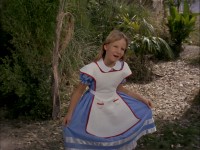

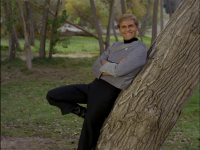
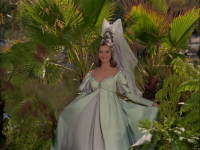
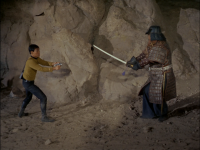
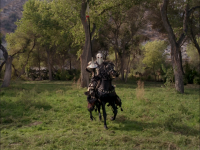
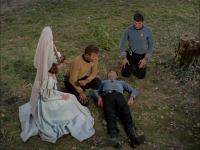
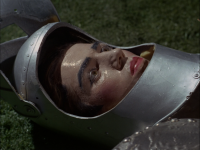
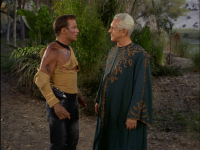
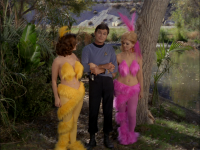
Star Trek TOS - 1x15 - Shore Leave
Originally Aired: 1966-12-29
Synopsis:
On shore leave, the crew's thoughts come to life. [Blu-ray] [DVD]
Filler Quotient:
2, filler, but an enjoyable episode nevertheless. You can skip this one, but you'd miss out on some fun.
- This world is revisited in TAS: Once Upon a Planet, but it is not necessary to see this episode before watching that one.
Problems
- The yeoman's broken uniform was broken on the wrong side after she changed back into it after taking off the Medieval dress.
Factoids
None
Remarkable Scenes
- Kirk getting a massage from his yeoman thinking it was Spock.
- McCoy to Sulu regarding Kirk: "You've got your problems, I've got mine. But he's got ours, plus his, plus 430 other people."
- McCoy seeing things from Alice in Wonderland come to life.
- McCoy describing what he saw to Kirk and Kirk believing he was joking.
- Spock maneuvering Kirk into taking some time off.
- McCoy and Kirk joking about the rabbit and reminiscing about Finnegan followed by Finnegan appearing out of nowhere and starting a fight with Kirk.
- Sulu's fight with the samurai.
- McCoy's apparent death.
- Spock and Kirk running through a set of dangerous illusions.
- McCoy's reappearance in the company of some 23rd century playboy bunnies.
My Review
This silly, whimsical episode manages to do humor better than any other so far. For most of the episode the unusually light hearted tone serves as a nice change of pace and the nonchalant way in which the crew investigates the strange things they're seeing is amusing. It was nice to see the characters get lost in some mostly harmless fascinations without the need for the plot to manufacture some danger to justify the aside. Unfortunately, things got considerably less entertaining after McCoy's apparent death.
Granted, it was a fantastically shocking moment when McCoy suddenly died while refusing to believe what he was seeing was real, but the shock's implications weren't taken quite seriously enough as the episode seemed to stubbornly refuse to change its tone once McCoy had seemed to die. The most annoying example of this is that Kirk's immediate reaction to McCoy's apparent death is to start chasing down imitation Finnegan so he can delight himself with an irreverently prolonged brawl with his imaginary friend.
I find it beyond irresponsible that Kirk would choose to focus on this rather than getting some answers. Sure, he tries to ask Finnegan for some answers, but Kirk should have known better than to expect Finnegan to give them to him. After a while Kirk seemed to give up on answers anyway and just enjoy the fight at which point Spock restores some sanity to the plot by deducing the cause of these manifestations.
Another unsatisfying aspect of the plot is the alien race which owns the planet who refused to identify themselves and the purpose of their seemingly uninhabited planet until after the crew was sufficiently traumatized. This omission of such a basic courtesy to foreign visitors to their world was rationalized by the idea that this alien race is so intelligent that they're unable to think the way humans do; a weak excuse. Overall though these critiques are small flaws in what is otherwise a highly entertaining story that is predicated on well executed comical absurdity.
The following are comments submitted by my readers.
- From technobabble on 2010-11-23 at 12:03am:
I enjoyed this episode very much as well, lighthearted romp in a pastoral backdrop after a tense space battle.
Only explanation for Kirk's Finegan reaction after McCoy's death is the fantasy world's hallucinations may had an affect on psychologically distracting the crew. Like Sulu shooting the firearm and fascinated with it without being cautious.
- From CAlexander on 2011-04-23 at 5:24pm:
The main plot is effective if you accept the premises. Not an episode of great significance, but memorable.
- The episode is sort of a variant of the Naked Time, revealing the hidden fantasies of the characters.
- I came to the same conclusions as the previous comment. The crew acts irrationally from the very beginning, paying little attention to the peculiar inconsistencies of the planet. Everyone acts like they are intoxicated by the visions they see. The show seems to imply that this is a normal part of being a humor episode, but if you want to look at things logically, it makes a lot more sense if you assume that the planet can influence minds as well as read them.
- From Mike Meares on 2012-04-10 at 7:44am:
A highly entertaining episode of Star Trek, which I thoughly enjoy. And still enjoy watching it, despite the many, many, many flaws in the script.
I loved the concept of the show. And much like the Enterprise crew I become mesmerized by what I am seeing appearing right before my eyes.
But if we take a step back and look at this episode "logically" it is really a very weak story, filled with a lot of mistakes.
I rate this episode a six because of it's entertaining value. But it could have been produced much better.
Over the years some of the writers have admitted that this episode, as well as many other episodes, went though so many re-writes that the flow of the story suffered greatly. It is said Roddenberry was re-writing scenes as they were actually being shot. Not sure how true that is, but it would explain some of the problems in the story.
The biggest problem in the script is the death of Dr. McCoy. The story explains that this race is so advanced that it can "repair" or bring someone back to life who is stabbed to death in the chest! REALLY? And we are suppose to beleive this just because they say so! I am sorry the explaination leaves something to be desired!
And while we are on the subject, this knowledge is something the Federation is not really interested in? Give me a break please! No one seems to care that this race can actually bring back the dead! I get more reaction from somebody when I show I can open a bag of bagels.
To make matters worse, this "advanced" race doesn't realize that the crew of the Enterprise doesn't understand what is going on the whole time! You have to ask yourself: why doesn't this advanced race show themselves after McCoy's death? Instead they "sneak" away McCoy's body without explaining to the rest of the crew what they are doing! The race continues with their illusions even though it is clear to a two year old human ( we must assume their two year olds are smarter than our two year olds! ) that at that point the crew of the Enterprise had abosolutely no idea what the hell was going on around them.
And the crew's communications were interferred with because of transmissions of this "advanced race". Even the transporter power aboard the Enterprise. REALLY? And this "advanced race" doesn't realize this at all? You have got to be kidding me?
Spock even says that the power was so strong that he reasoned that they only enough energy to beam down one more person before they lost the use of the transporter. Gee how lucky for them. I ain't buying it.
And as Spock is beaming down Sulu makes a staement that I am still scratching my head about. Sulu says, "Someone beaming down from the BRIDGE." Oh really? And how does Sulu know where the person is beaming down from? Spock could be beaming down from the Sick Bay for all Sulu knows. Correct me if I am wrong, but if you saw someone beaming down wouldn't you just assume they are beaming down from the.... eh.... oh I don't know.... THE TRANSPORTER ROOM!
All of these mistakes are due to the writing and should have been corrected before fliming. And they are all weak plot devices used to make the story workable, but they are just not every creative.
Everytime I watch this episode I have to ignore these aspects of the story or else I can't enjoy the show.
It is very odd but this episode can be summed up in three words. Enjoyable but flawed!
- From Scott Hearon on 2014-03-05 at 11:48pm:
Just watched this episode, and I agree with much of what "Kethinov" has to say. It gets annoying to see the downed crew members give Spock so much flack. It was a bit overdone (presumably in the name of selling this particular element of the episode), but I liked the basic premise and dynamic.
Yeah, that ambassador was a real jag-off. Could have been much less heavy-handed with that character.
The choice of giant, hairy primitives seems odd. I can't help but think that this was a bit of dumbing down, possibly by the network, so things didn't get too (gasp!)...intelligent or creative!!
Overall, though, it's a decent enough episode. Nice job touching up the visuals, too. What year did they do that, anyway? They look damn good. - From Yonagonaf on 2016-04-23 at 7:07pm:
There is a word in the sentence “The yeoman's broken uniform was broken on the wrong side after she changed back into it after taking off the Medieval dress.” that needs to be changed.
The word “broken” is incorrect.
The words “torn” or “ripped” are used when describing damage done to material.
In this case a uniform.
- From Kelly on 2017-08-17 at 11:15am:
A very fun and scenic episode, that is not really deep, but simply meant to be a getaway fantasy episode. Just watched it 2 times in a row, over the last few days, but found several small but still irking mistakes!
On a planet with supposedly no life or animals or bugs, a few close ups show flies around the faces of characters, especially the scene with Ruth.
There are tree stumps, and logs on the ground that are obviouly chainsaw cut.
The grass is freshly cut and there are even trails leading around, and one thing no one seems to ever catch, a BUILDING in one scene with Kirk and Spock walking around the glade. Look again its a hut that appears to have a natural look made from maybe logs and plant material, but none the less an actual building. I Know the crew was all excited, but no one saw any of this??
Most likely obvious mistakes, but could have been better hidden!
- From Jake on 2019-11-23 at 2:04am:
I think some take this episode a bit too seriously. But if you watch the show closely you can catch all sorts of little things. Like the chain on the tiger's paw. Or that the strafing plane is one time a Navy Corsair, and then suddenly a Japanese Zero. Or the changing dress tear. But this, like many others, just needs to be watched for entertainment which it did provide.
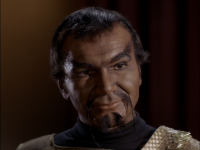
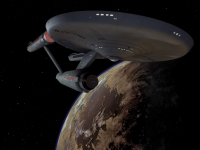
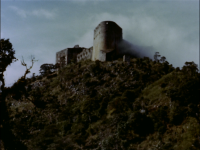
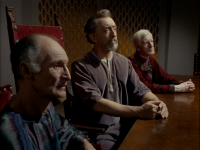
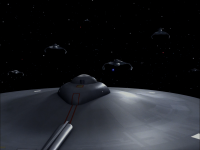
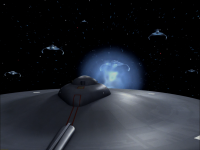
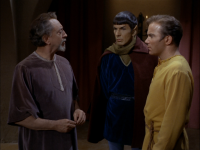
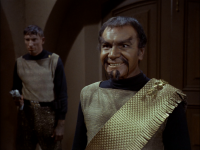
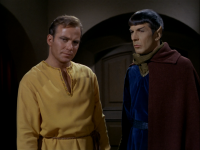
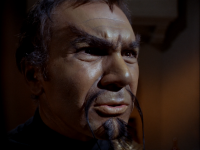
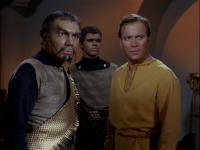
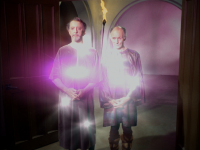
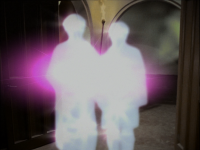
Star Trek TOS - 1x26 - Errand of Mercy
Originally Aired: 1967-3-23
Synopsis:
Kirk and Spock battle Klingons to free Organia. [Blu-ray] [DVD]
Filler Quotient:
0, not filler, do not skip this episode.
- This is the first episode to feature the Klingon Empire.
Problems
- Kor tells Spock, a Vulcan, and Kirk, an Organian (as far as Kor knew at the time) that the mind probe on its highest setting leaves something not at all "human." As far as Kor knew, no one in the room was human. Why would he say that?
- Vulcans are inexplicably referred to as "Vulcanians" in this episode.
Factoids
- Kirk mentions in this episode that the Federation invested a great deal of money in his (and Spock's) training. While the line could merely be hyperbole, it could also indicate that the training of Starfleet officers comes at great cost to whatever resources in the Federation are nonrenewable and thus precious.
Remarkable Scenes
- The Enterprise being attacked by a Klingon ship and destroying it.
- Kirk describing the horrors of the Klingon Empire to the Organians.
- Kor appearing, taking over the planet, and declaring himself governor.
- Spock passing the lie detector even though he was lying.
- Kirk's private discussion with Kor after Kor discovered Kirk's true identity.
- Kirk: "Gentlemen, I have no great love for you, your planet, your culture. Despite that, Mr. Spock and I are going to go out there and quite probably die in an attempt to show you that there are some things worth dying for."
- Kirk: "What would you say the odds are on our getting out of here?" Spock: "Difficult to be precise, captain. I should say approximately 7824.7 to 1." Kirk: "Difficult to be precise? 7824 to 1?" Spock: "7824.7 to 1." Kirk: "That's a pretty close approximation." Spock: "I endeavor to be accurate." Kirk: "You do quite well."
- Kirk, after infiltrating the Klingon base: "Well, what are the odds now?" Spock: "Less than 7000 to 1, captain. It's remarkable we've gotten this far." Kirk: "Less than 7000 to 1. Well, getting better. Getting better."
- The Organians stopping the fight between the Klingons and the Federation.
- Kirk and Kor arguing with each other, justifying their positions for war.
- The Organians telling Kirk and Kor that in the future the Klingons and The Federation would become friends.
- Kor briefly proposing to work together with Kirk to defeat the Organians.
My Review
A proxy war between two large inter-stellar nations which takes place on a (seemingly) backward planet is an intriguing premise for many reasons, not the least of which are the parallels to the many similar proxy fights during the Cold War which doubtlessly inspired this story. It's somewhat annoying that the writers didn't take this opportunity to reuse the excellently characterized Romulan Empire from Balance of Terror, choosing instead to create the never before seen Klingon Empire for this installment's Cold War allegory, but that said, there's no reason why there couldn't be multiple inter-stellar nations battling as cold warriors during Star Trek's 23rd century. Indeed, the Klingon Empire's foreign policy toward the Federation heats up rapidly in this story as after negotiations break down, the Klingons declare war and launch an exciting surprise attack on the Enterprise! Though it wasn't much of an attack. For all that the battle seemed intense at the time, a few (lucky?) shots from Sulu pulverized the surprise Klingon attacker with only trivial damage to the Enterprise.
Thankfully the Klingons are characterized far more successfully the very moment Commander Kor walks onto the screen. The delightful actor John Colicos cultivates an impressive presence for an antagonist not seen since Khan from Space Seed. Kor single handedly exposes us to the Klingon Empire's apparent warrior culture, demonstrating that their ambition for conquest is not merely a means to an end for them, but an end unto itself. This is made most clear when Kor expresses disappointment over his various easy victories in this story, instead preferring a victory that is hard fought and thus, from his perspective, better earned. Even more intriguing is Kor's reverence for the autocracy he lives in. Rather than merely considering it a necessary evil, he instead sees it as the ideal form of government as it rewards the strong at the expense of the weak, an extension of his warrior ideology. This nicely contrasts the crew of the Romulan flagship from Balance of Terror who experienced deep cynicism about their government.
The terrific premise of this story is sullied by a number of imperfections in the story though. For instance, while John Colicos' performance as Kor was excellent, the less said about the other actors playing Klingons the better. Also, why was Sulu placed in command of the Enterprise instead of Scotty? It was established in A Taste of Armageddon that Scotty is the ship's second officer. Was Scotty off the ship at the time? Another wrinkle in the story is the recurrence of the "mysterious aliens slow down the plot" cliche. Once again we have alien guests whose true nature is conspicuously withheld simply to give the plot more time to unfold, as the Organians spend much of the episode saying what basically amounts to, "we have no defenses! Nor do we need them! We're not going to explain why!"
The climax of absurdity here is that their superpowers are revealed about twelve minutes into the story, but Kirk and Spock remain oblivious for a considerable time thereafter despite obvious evidence presenting itself before their eyes. They do wonder how the Organians can know things like the presence of ships in orbit, but do not bother to speculate or consider the possible implications. Though perhaps maybe the reason Kirk and Spock remained so oblivious for so long is because they're soldiers, not diplomats, as Kirk so emphatically stated at one point during the episode. This statement annoyed me because it seems to fly in the face of Star Trek's stated premise which is to peacefully explore the galaxy and to make contact with new civilizations.
Those are minor nitpicks though compared to a few considerably more serious issues with this episode's story. Once again we have an alien race, the Organians, that looks identical to humans and our heroes don't even blink. The profound similarity is even acknowledged in dialog by Kirk and Spock when they admit that Kirk can reasonably pass as an Organian with a mere costume change as if human-looking aliens with no noticeable physical variations are accepted as common throughout the galaxy. If this is indeed the case, I sure would like to know why. Even the Klingons had rather unambitious makeup in this respect. Darker skin and different hair isn't even as creative as the already lazy pointed ears of the Vulcans. As for the Organians, even though it is later established that they could have chosen to appear in any form they wished, the fact that neither Kirk, Spock, nor Kor found the Organians' similarity in appearance to humans conspicuous is most odd. Worse yet, Kirk's orders to establish a base on Organia and share technology with what at the time seemed to be a primitive society would seem to be a blatant violation of the Prime Directive.
But the Organians were indeed more than they appeared to be and while the slow unfolding of this fact by the plot was a bit irritating, it was quite amusing to observe the rather nonchalant way in which they dealt with the invasion of their planet. Perhaps the best part of the story was when the Organians insisted that one day the Klingons and the Federation would become friends and even work together. Given the highly advanced nature of the Organians, we can't simply relegate this statement to the territory of an idle optimistic prediction. On the contrary, they may very well be in a position to know! More importantly though, they may also very well be in a position to influence events in favor of their preferred outcome. They appear to have single handedly stopped the war in this story. Will they prevent further conflict between the Federation and the Klingons?
This question opens up a larger problem that has been slowly climbing its way to the forefront of Star Trek's storytelling which is to what degree do all these god-like aliens actually control the fates of our heroes? Kirk expresses awareness of the conundrum caused by being unambiguously relegated to that of a lesser species in his final lines of the episode when he states that it's unsettling to learn that he and his comrades are not the most powerful beings in the universe. He further expressed dismay that the Organians "rigged the game." Kirk has good reason to express dismay. If the galaxy is truly filled with god-like aliens interfering with the events of the lower planes, then the relevance of our heroes is seriously undermined. At any moment, a deus ex machina can suddenly change the course of their history arbitrarily and for no apparent reason. Let's hope that in the future Star Trek reins in the use of these god-like aliens considerably, or it may become difficult to take the show seriously anymore.
The following are comments submitted by my readers.
- From technobabble on 2010-11-23 at 7:16am:
But they do have a form of currency in called Federation credits but they don't seem to have any physical money. The various series & movies touched upon that the economics of the Federation are vastly different than the capitalist model. With no hunger, disease or poverty they live in a post scarcity society. Check out the wiki writeup under "Federation credits".
It is still odd that Kirk would refer to efforts expended to train Spock in a monetary sense though.
- From John on 2011-02-17 at 2:28am:
Kirk is such a fathead in this one. This episode is a prominent example of the differences between Kirk and Picard. I'm not saying one is better than another, but Picard would never have tried to foist his own view of "the way things should be" on an independent world the way Kirk does here. These people don't want his help, because ultimately they don't need it, but that doesn't stop him from forcing himself upon them.
He learns a valuable lesson for his trouble -- things are not always what they appear to be. But he promptly forgets it and goes back to being the same old Kirk for the rest of the series.
The other thing that doesn't click for me is the brain scanner. I guess it's because I'm used to the "non-Soviet" Klingons from TNG and DS9, but this certainly seems more like a Romulan weapon than a Klingon one. - From ChristopherA on 2012-07-04 at 1:48pm:
A classic. This is the TOS episode that puts the Klingons in the best light, in the sense of them being worthy enemies of the Federation. I love Kor's combination of ruthlessness and philosophy, and the concept of the wolves among sheep. And the episode has a great sense of wartime excitement. I quite like this episode, even though it does have some weaknesses.
- I agree that it is very odd how Kirk and Spock fail to react to the Organians’ demonstration of knowledge they should not have. The episode would make more sense if they simply couldn’t overhear the weird conversation between the Organians.
- It is funny that the first time I watched the episode, I never really noticed how the attitude of Kirk and Spock towards the Organians after the Klingons arrive is quite irrational. They constantly berate the Organians for not fighting back. Yet the Organians, as far as Kirk and Spock know, have no military and are vastly technologically inferior to the Klingons. The Klingons are totally ruthless, a fact which Kirk himself tells the Organians. They have announced massive retribution for any deaths. Even if the Organians pull off some sort of incredible resistance on the ground, the Klingons can obliterate their society from orbit if they so choose. Obeying the occupation force costs them their freedom but allows their culture to survive. It is understandable that Kirk and Spock would want the Organians to assist them, but it is puzzling that both of them, even Spock, act as though the Organians are fools for not doing so. And blowing up the munitions dump seems like a somewhat callous act, given the likelihood of Klingon reprisal. I assume they justify it by military necessity, and a feeling that life under Klingon rule is worse than death and thus anything the Organians do to increase the chance of Federation victory would be good for them in the long term. Apparently the Prime Directive is so totally overruled in time of war that Kirk feels no need to respect the Organian culture of pacifism and can simply make decisions for them.
- Kor's decision to wait 12 hours before mind-sifting Kirk makes little sense to me. If Kirk is a worthy foe, he will not cave in to Kor’s demands; if he is not worthy, why give him the extra 12 hours? I'm wondering if the Organians are playing with Kor's mind. Or perhaps the success rate of the Mind-Sifter is not really very good; that could explain why it never shows up again. Or perhaps Kor just wanted to see how Kirk would react if given some time to think about his impending horrible demise, just to gauge what kind of man he is and understand the mind of the enemy.
- It is interesting to compare the ruthlessness of Kor to the recharacterized TNG Klingons. The later series spend a lot of time painting the Klingons as a proud, honorable warrior race with a culture that seems strange and violent to the Federation, but is very worthy in its own way. Conveniently, they don’t really mention what happens to the losers when the Klingons actually win a war; the Klingons would seem a lot less like fun, good-hearted frat boys if you knew about the horrors of Klingon occupation, as Kirk describes here. Come to think of it, maybe the Cardassians are the real spiritual successors to Kor’s Klingons.
- I love the Organian gesture of greeting. I should start using that myself.
- From Strider on 2012-07-25 at 5:28am:
I think this episode has some strengths. Kor is awesome. Kirk is frustrated into anger, and even Spock accepts the necessity to try to persuade the Organians to fight. I like to see the heroes kicking ass, but really, nobody stops to wonder if there's more going on here than meets the eye? And in another episode, they claim that they can't violate the Prime Directive on pain of death or whatever, but where the heck is it now? Why do they assume that the Organians (as they understand them at this point) haven't thought about the implications of their pacifism? They would rather be conquered than use violence-- their choice. People who are truly committed to pacifism have thought these things through.
But my greatest irritation is with any episode or movie of any kind where a short explanation could resolve the misunderstanding. I realize it would have made the episode about 6 minutes long, but why won't the Organians just say, "Look, we've got some powers you don't know about, and these guys can't hurt us. It's all good." Then maybe showed them that hot-weapons trick or something? A simple misunderstanding just isn't enough to hang a whole plot on.
Strider - From Glenn239 on 2012-10-01 at 1:58pm:
‘7’. The Prime Directive obviously does not apply to strategically located Class M planets in key sectors bordering a dangerous enemy. By the time of the NG the Federation is apparently able to allow its enemies all the advantages in battle, and then pull it out at the end with the Boy Wonder and Filter Face issuing some embarrassing technibable while reconfiguring the deflector into a time machine or whatever. (So what are those hippies back at Starfleet design academy doing? Didn’t anyone notice that the deflector array can be changed into a new handy device by a 15 year old marketing device?) Anyways, by NG the Federation might be strong enough to act weakly, but in the original series the Federation clearly has to watch out for the possibility of being conquered, and that must mean the Prime Directive is not universal.
This one looks to be a French resistance story from WW2 crossed over to science fiction. It’s a pity Spock’s interrogation took place off screen; that would have been a strong scene. Spock and Kirk play the role of incompetent British operatives, (Kirk, I’m pretty sure that you should be hiding you Vulcan from the Klingon occupation army rather than parading him around in front of the governor). The Klingons emerge as a solid, well conceived opposition for the Enterprise, but then a promising premise is squandered by yet more advanced entities deciding to finally do their godlike duties in enforcing decent principles and prevent war. Nice, but where have you been for the past 10,000 years and why did you show up just in time to wreck a great ending?
This episode may have contained the single biggest error in judgment pertaining to the longer term survival of the series. If they had let the war just starting play out over the course of following seasons, then the writers would have had a strong ‘fall back’ story arc they could draw upon to replace or pump up future turkeys like ‘The Apple’. Since Organia is a key sector, just have the Organians prevent the war within their area, but what happens further away than that they do not care about. So the war continues, but the logistics of it are difficult for both sides hence it becomes drawn out. Star Trek stories in a war background in science fiction are inherently stronger pieces: Exhibit A, Wrath of Khan. Exhibit B: The Undiscovered Country. - From Scott Hearon on 2014-03-31 at 10:52am:
A really strong episode, mainly because of Kor.
Instead of giving us a 1-dimensional "evil invader," the story gives us a fully-developed antagonist who brings out the most aggressive side of Kirk. The characterization of Kor could have been horribly oversimplified, which would have made for an extremely boring episode. As it was, it was one of the best ones that I've watched so far.
I, like Kethinov, grow very tired of unimaginably powerful beings in the series. Sure, the mystery of their true nature lends a certain air of suspense and wonder through most of the episode. But the eventual revelation that they are virtually omnipotent and omniscient is rather dull.
Still, it's good to see that one of the most iconic alien races that Star Trek produced had such a strong introduction.
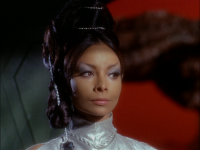
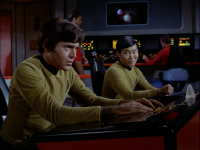
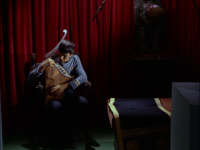
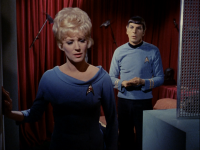
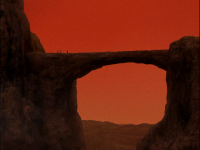
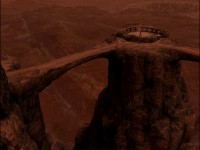
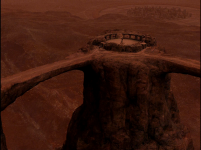
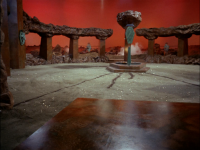
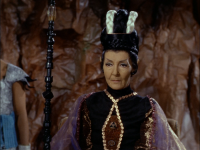
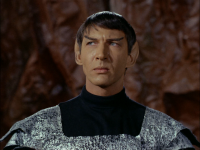
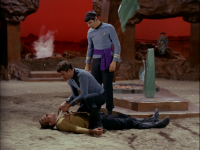

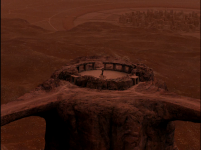
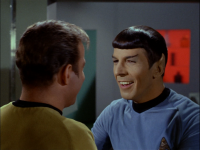
Star Trek TOS - 2x01 - Amok Time
Originally Aired: 1967-9-15
Synopsis:
Spock undergoes the Vulcan mating ceremony. [Blu-ray] [DVD]
Filler Quotient:
0, not filler, do not skip this episode.
- Aside from being one of Star Trek's most famous episodes, this episode also contains a great deal of crucial exposition about Vulcans and is Chekov's first episode.
Problems
None
Factoids
- A slightly revised opening theme debuted in this episode.
- This episode establishes that the Enterprise can do "warp 8 or better" under extreme circumstances. This is up from warp 7 in the first season.
- It is mentioned in this episode that T'Pau turned down a seat on the Federation Council and that she is the only person ever to do so.
- This episode was nominated the 1968 Hugo Award for Best Dramatic Presentation.
Remarkable Scenes
- McCoy describing Spock's behavior to Kirk.
- Spock freaking out at Nurse Chapel.
- Sulu and Chekov discussing the abrupt course changes.
- Spock: "How do Vulcans choose their mates? Have you ever wondered?" Kirk: "I guess the rest of us just assumed it was done... quite logically!"
- Spock bashing his computer monitor. The effect was cheap and cheezy, but hilarious nevertheless.
- Kirk and McCoy expressing awe over the fact that Spock knows T'Pau, a revered Vulcan celebrity.
- Kirk and Spock fighting.
- Spock "killing" Kirk.
- T'Pring explaining her motives for the death match.
- Spock to T'Pring's new husband: "She is yours. After a time you may find that having is not so pleasing a thing, after all, as wanting. It is not logical, but it is often true."
- Spock and T'Pau to each other: "Live long and prosper."
- Spock's reaction to seeing Kirk alive and well. Gotta love Spock's brief smile.
My Review
This episode skillfully dramatizes the secret mating ritual of the Vulcan people. Known as the pon farr, it is a time honored tradition that the Vulcan people seem to pour their entire emotional core into; the one exception to their rigid culture of emotional purging. Since Spock is half human, his emotional control has always been somewhat weaker than the average Vulcan and Spock had hoped in vain that his unusual ancestry would spare him the full effect of the pon farr. Like clockwork, Spock's marriage to T'Pring, arranged at childhood and consummated with a mind meld, reasserted itself at a most inconvenient time, causing Spock to experience the "blood fever." It is stated in this episode that had he not returned home to participate in the ceremony with T'Pring, the emotional trauma could have actually killed him. All of that exposition and so much more coalesces into what is easily the most nuanced and interesting depiction of an alien culture on Star Trek so far. Combined with great writing, good plotting, and even an excellent score, this episode is strikingly original.
Only minor blemishes diminish the storytelling. For instance, when Kirk spoke with Starfleet Command, he failed to mention that Spock's life was in danger. Although the conversation was cut short by the terse commodore, it still seems like Kirk should have mentioned that. The next most annoying detail was the unusual speech patterns of T'Pau. All of that "if thee this" and "thyself that" was pretty awkward stuff to listen to; definitely not the best aesthetic choice. Although I will confess to greatly enjoying her line questioning Spock "art thee Vulcan or art thee human" in spite of the old timey vocabulary. The ceremony itself slowed down the pace of the plot considerably and the episode probably could have benefited from being five or ten minutes shorter in general, but overall the episode was way above average. Everything from the smart inclusion of a Nurse Chapel subplot dealing with her unrequited love for Spock to T'Pring's chillingly logical explanation of her scheming to Spock was excellent drama.
The following are comments submitted by my readers.
- From Thomas on 2009-08-03 at 9:33am:
I found it a bit disturbing and inconsistant with the other series that the Vulcans here have such a barbarous and illogical ritual. i mean fighting to death for a woman. - From Orion Pimpdaddy on 2010-03-31 at 8:12pm:
I just watched this on Blu-Ray last night. I have a few nitpicks.
There's a pretty nice new part that was added. When the Kirk, Spock, and McCoy beam down, it now cuts to a far away shot of the temple. It looks pretty nice. The problem is that when Spock beams back up, they cut to the shot again, but it does not show the wedding party standing inside it, even though they were standing near Spock as he beemed back up.
Also, when Spock's future wife appears on the view screen, she starts talking to him ("something something never parted"). I just would like to know where the echo is coming from. She sounds like she has supernatural powers!
There's also a lot of unnecessary stunt doubles used in the slow moving combat scenes. I'm pretty sure Nimoy and Shatner had the skills to wield plastic sticks.
Otherwise, this is a pretty good episode.
- From John on 2011-02-18 at 5:20am:
This is a funny episode: I love it, but there are a lot of things about it that tick me off:
1. Why does T'Pau have such a strong accent, while no other Vulcan ever presented has an accent? I realize that this is the first "Vulcan" episode of all time, but still. Her accent is annoying and unnecessary.
2. What's up with the constant use of "thee"?
3. I would have liked to see Spock take T'Pring as his wife anyway, just to wreck her plans. Logical or not, as far as he knew, she forced him to kill his best friend and captain. In a short time he can divorce her, and make her look like a fool. Seems like justice to me. Of course, Spock would never do this -- revenge is illogical -- but it would be entertaining nonetheless. - From Robert Koenn on 2011-03-24 at 5:11pm:
This was another favorite overall episode from the Trek universe for me. And that partially makes sense as two of my favorites were written by acclaimed scifi writers, this one by Theodore Sturgeon. It was quite interesting to learn more of the Vulcan culture. I didn't find the "illogic" of this violent death match for a woman to be out of place. As was stated, Vulcan suppress their emotions, they are not genetically non-emotional. So at that point in time when the Pon-far occurs this pent up strain is released resulting in years of suppression getting out into the open. And for a Vulcan this is not only personally devastating but embarrassing as well. I also found the effects quite good for the budget and time period they filmed this episode. Finally it went quite a ways in developing the Kirk/Spock/McCoy relationship. - From Wes on 2011-04-19 at 8:08pm:
I too really appreciated the development of the Kirk/Spock/McCoy relationship.
I also thought the addition of one or two of the little "extra" scenes was great. The one that stands out to me is the little back and forth between Sulu and Chekov when they ask the other if they think they'll make another course change. Those types of little scenes really added to TNG, DS9 and Voyager for me. It helps you see other sides of characters. It adds more of a human element. The first season of TOS really lacked those types of scenes. I'm really glad the writers decided to add this. I hope it continues.
Overall, I enjoyed how this episode seemed to really take a big step forward from the first season. Well done. This is what Star Trek is made of and I am beginning to see why people enjoyed TOS. After only watching the first season, I wondered what was so great about TOS, especially in comparison to the other series. - From steve on 2012-07-08 at 8:40am:
One nitpick. How is it that Kirk and McCoy didn.t know about ponfarr until Spock tells Kirk. In Managerie,its stated that the events on Talos IV took place 13 yrs previously,and this episode takes place about 1 yr later so 14 yrs at least have gone by with Spock on the Enterprise. Given that ponfarr occurs every 7 yrs Spock would have gone thru 2 under Pike . No medical records, no Captains logs of them were made, two unscheduled trips to Vulcan are made but ponfarr is not known? Just asking. - From Strider on 2012-07-27 at 7:29am:
I've also wondered why this seems to be Spock's first pon farr. Actually, I have a lot of questions about pon farr.
Pon farr happens every 7 years to mates who are bonded, right? So, Sarek, for example, would not have experienced it, because he didn't have a bond mate...as evidenced by his being able to marry Amanda.
But Vulcans can still have sex if they are strongly enough attracted to someone, right? I mean, they don't have to wait 7 years--I think one of the writers said as much. Pon farr is not regular sex; it's the drive toward the bond mate...right?
Someone (somewhere) said they found it unbelievable that Spock suddenly gets over the blood fever when he realizes he's killed Kirk. I didn't have a problem with that--he goes through the ritual of "marriage or battle," his body must release the hormonal tension one way or the other, and he ended up doing it through battle. Makes total sense to me.
I didn't have a problem with T'Pau's use of extremely formal archaic language--this is a very formal, ritualized occasion, and such things often use formal and archaic language. It did bug me that Vulcans seem to use "thee" when they should properly say, "thou," but I'm assuming they're not actually speaking Elizabethan English.
Some of the TOS novels seem to indicate that if you're away from your bond mate when you hit that 7 years, you can relieve the pressure with someone else. So...when Christine comes into Spock's room and he's nice to her and asks her to make him some soup, did he just feel bad that he had been a jerk to her earlier, or was he coming on to her? He reached out and touched her cheek, but then quickly put his hand behind his back. Was he trying to keep his hands off her because he just needed "it" so bad, rather than T'Pring specifically? Frankly, I think she'd have helped him out and the whole fake-Kirk-death thing could have been avoided.
- From Alan Feldman on 2013-03-06 at 8:28am:
AMOK TIME
Has its fun scenes. Here are my comments:
While parents wanting to choose their children's mates, and children wanting to choose their own mates themselves are both understandable, the rituals here are silly and the fight to the death, barbaric. Even animals often size each other up to see if a fight would be pointless.
People complain about sexism in Star Trek, but I've never heard it mentioned with regard to this episode. Check out this dialog:
T'PAU: He will have to fight for her. It is her right. T'Pring, thee has chosen the kal-if-fee, the challenge. Thee are prepared to become the property of the victor?
T'PRING: I am prepared.
And a short time later:
T'PAU: Here begins the act of combat for possession of the woman, T'Pring.
Property? Possession? On the other hand, if Spock hadn't freed her, she'd get his name and property -- and instant estrangement! And Stonn.
So when does the clean-up crew come around to clean the soup off the wall outside Spock's quarters? You really want to do it before it dries on.
I'm okay with T'Pau's accent; however, the misuse of 'thee' and such is a little annoying.
What's with the humongous nose mask on the guy with the big blade? How do you breathe with that thing on?
Continuity error: At 29:27 Spock starts walking toward the gong. Once Spock is almost there, T'Pring begins walking and makes it about half way there. Then in the very next shot she's standing still, near Stonn again. She starts off toward the gong again and gets there a little too fast. I'll chalk this up to a screw-up they didn't have the time or resources to fix.
Look at Kirk's pose when T'Pring is about to choose him (32:29). Words escape me.
Pretty amazing timing for the neural paralyzer to kick in just before Spock's choking Kirk would have really killed him. Let's see: how many times does Kirk "die"? Here, in "The Enterprise Incident", and mistakenly declared dead in "The Tholian Web" and "Space Seed". And he "partly died" in "Return to Tomorrow".
Yep, pretty good logic on the part of T'Pring. And she had to have thought it up right on the spot, as she didn't know until then that Kirk, an "out-worlder", would be there. Pretty good! But what if Kirk had declined? It would have been tough luck, and Stonn would have had to fight. But that was her starting point anyway. Oh, and this also explains why Stonn was surprised by her choice of champion, which added a nice twist. In the end, she and Stonn lucked out big time.
In the remastered version we see our heroes walking across a huge arch with a Vulcan city in the background. I'm sorry, but it just looks out of place. It's a totally different look. Switching to and from this scene almost looks someone's changing channels. There is also a lack of continuity in their walking. And why would they beam down so far from the temple in the first place?
Near the end, Uhura relays Admiral Komack's approval of T'Pau's request to divert to Vulcan. Sorry if I missed it, but I don't recall her ever making such a request.
AEF, aka betaneptune - From Tooms on 2013-09-14 at 8:50pm:
Great episode. Warp 8 isn't new, though. The Enterprise went to warp 8 during the space chase in Arena (season 1). - From Scott Hearon on 2014-04-05 at 2:42pm:
Really good episode. I gave it a 7/10.
I had some of the same unresolved questions and nitpicks that the other commenters here have, mostly concerning the Enterprise crew not knowing anything about pon farr. Surely they would have had some indication from the past. Secret or not, would it not have been "logical" for Spock or some other Vulcan to inform the Federation of a ritual that would possibly endanger the crew? Especially when a Vulcan is in a position of power such as First Officer?
And yes, the fight sequence, as with all of the others I've seen on TOS, was pretty laughable. Based on what we know of Spock's strength, added to his blood rage and a climate that was inhospitable to Kirk, Spock most likely would have mopped the floor with poor ol' Jim in a matter of seconds, long before McCoy can enact the ruse that saved him.
Still, there's a ton to admire and be entertained by in this episode. Being the first episode to focus so heavily on not just Spock but his home culture is fascinating, and handled quite well. It shows just how effective it can be to have a character fall out of type temporarily. Unlike Star Trek Into Darkness, throughout which Spock was a virtual emotional wreck, this episode of TOS gets it right. Have Spock a slave to his emotions for a single story, and then return to his usual, logical self.
Odd to see Chekhov added without any mention of exactly why he's part of the crew now. Even a slight recognition of this new crew member would have been a nice little touch. - From jd _juggler on 2015-04-01 at 6:02am:
This is indeed a good episode for the relationship of the three principles. In the turbo lift, Spock asks for McCoy to be his guest at the ceremony, basically saying that McCoy is one of his closest friends. The doctor's short response says volumes: "It would be an honor, sir." Never in the entire series did McCoy show that kind of formal respect to Spock.
I agree with an earlier commenter that Spock should have been able to easily defeat Kirk, but let's face it: Spock did not want to kill Kirk, no matter what kind of altered state Spock was in.
As to Pon Farr, it is absurd to suppose it would have remained a mystery to men from earth. Vulcans were known to earth men for at least 150 years (recall that in "metamorphosis" zephram cochrane recognized Spock as a Vulcan). Spock himself was the product of a "mixed marriage". And stories about sexual practices tend to spread.
And here's something else to think about; Spock has obviously gone through this before. Wouldn't he know when this strange thing is happening to him sufficiently in advance, so he could make the proper arrangements to be on his home planet? And why didn't this whole t'pring thing happen seven years earlier, at which time Spock was already an adult, and serving aboard the enterprise?
That said, this is still a very good episode. Certainly among the top ten, and maybe among the top five. - From Emil on 2016-01-22 at 9:31am:
I have not seen that many ST:TOS episodes but I had to see this one because of T'Pau, one of my favorite ST character (the others being Q and Wynn Adami). I have read many comments on T'Pau's "heavy" accent and her "awkward" use of archaic pronouns. I personally have no problems at all with these. The heavy accent was perhaps inevitable as the actor who played the part was from Austria-Hungary (Celia Lovsky). Her German accent was quite obvious. I think this was quite apt, actually as T'Pau is supposed to be an ancient Vulcan. It's like an old Chinese woman from China who speaks English with a heavy Chinese accent. The use of the archaic pronouns could be because we see T'Pau presiding over an ancient ritual. The occasion may have necessitated the manner of speaking. When we see a younger T'Pau in ST Enterprise, she had no such accent and neither did she use archaic pronouns so the original T'Pau's doing so may indeed be due to age and the occasion. - From Chris on 2018-08-31 at 4:36am:
As always... late, by years! To the debate!
This episode is kinda cool but could have been better in a hundred ways?
- Pon Farr should have been spaced better to make it logical.
- Why no mention of how Spock's dad ended up with a human wife? A little TOO Pon Farr for me! Or maybe Too Pon Nearr...
- Why would they throw Chapel under the bus and break her heart after all the tender and loving dialog between the two? Straight up hurtful!
- Her logic was hardly flawless and made little sense! With Kirk accidentally appearing or not!!!
- Why wouldn't T'Pring give the LOGICAL option of advising Kirk the fight was to the death?!?
- Spock is living in an Earth ship with their O2 levels and general temps. Yes, he warms his cabin but it he is hardly acclimatized to Vulcun and he is also in a depleted state... unlike Kirk! Kirk should have wailed on him!
Ok, 6 ways...
I have no other problems with this episode... :-)
I dug the dialog etc, and loved Kirk throwing all in for his friend!
Awesome!
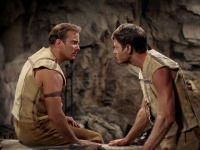
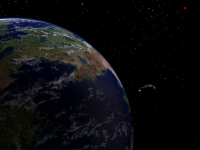
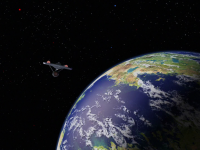
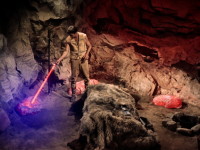
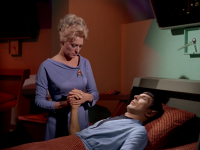
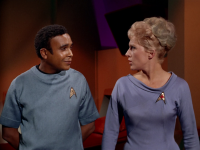
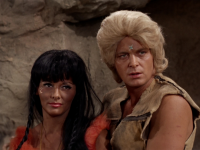
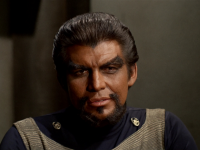
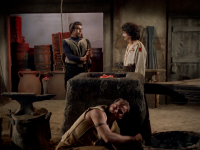
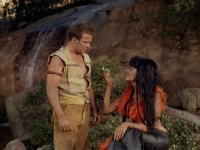
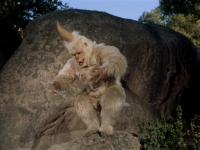
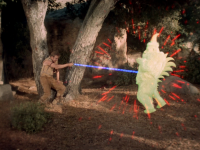
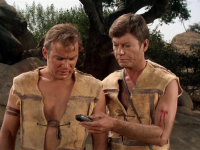
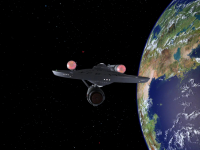

Star Trek TOS - 2x19 - A Private Little War
Originally Aired: 1968-2-2
Synopsis:
The Klingons provide arms to a peaceful planet and disrupt the balance of power. [Blu-ray] [DVD]
Filler Quotient:
2, filler, but an enjoyable episode nevertheless. You can skip this one, but you'd miss out on some fun.
- Despite the apparent cliffhanger at the end of the episode, none of the events depicted here are ever followed up on. As such, this episode can be regarded as filler. However, it's a great story and well worth a viewing.
Problems
- When McCoy fires his phaser to heat up rocks, the phaser fires without him pressing the trigger!
Factoids
None
Remarkable Scenes
- McCoy regarding Spock: "Lucky his heart is where his liver should be or he'd be dead right now."
- Kirk and McCoy attacked by a strange alien animal.
- Nurse Chapel holding Spock's hand, and then being informed that Spock probably knew she was doing that.
- Kirk: "We once were as you are. Spears and arrows. There came a time when our weapons grew faster than our wisdom and we almost destroyed ourselves. We learned from this to make a rule during all our travels never to cause the same to happen to other worlds, just as a man must grow in his own way and his own time."
- The revelation that the Klingons are feeding gradual technological improvements to the aliens in exchange for loyalty.
- Spock asking Nurse Chapel to hit Spock repeatedly and Scotty stopping her.
- McCoy debating the ethics of giving technology to more of the aliens with Kirk.
- Kirk fighting another one of those white-furred aliens.
- Nona stealing Kirk's phaser.
- Nona getting herself killed. What a moron.
- McCoy knelt over Nona's body watching in horror as Kirk and the hill people fight the villagers.
My Review
Yet another proxy war episode featuring the Federation and the Klingon Empire manipulating a primitive planet as a power play in their their everlasting cosmic cold war. However unlike The Trouble With Tribbles and Friday's Child, neither of which very deeply explored the issue, and unlike Errand of Mercy whose exploration of the issue was cut short by interference from godlike aliens, A Private Little War is perhaps the most poignant exploration so far of the terrible impact a proxy war can have on the subjects of said manipulation.
Right from the beginning this episode is packed with great pacing and effective drama. Spock is badly wounded and there are Klingons in orbit! Kirk must focus on maneuvering the ship out of view of the enemy without knowing if his friend will live or die. As the episode moves forward, it makes it clear in no uncertain terms that it's a satire of conflicts like the Korean War and the Vietnam War, as a direct reference to such conflicts is made in the terrific ethical debate between Kirk and McCoy. The two characters wrestling with their morality is the centerpiece of the story, a rare treat afforded by the conspicuous but amusing incapacitation of Spock early on.
By taking Spock out of the picture at the beginning of the episode, the story was able to explore unusual character dynamics such as the oft-neglected plot thread involving Chapel's unrequited love for Spock while giving McCoy a chance to spend some quality time being Kirk's wingman in Spock's place for a change. McCoy's unique and highly emotive perspective on the issue served as a wonderful contrast to Spock's typically cold, logical analysis. This time Kirk gets to play Spock's role by making the logical argument for escalating the conflict while McCoy gets to play the idealist, instead making a principled argument against arming less advanced civilizations.
Accompanying the great ethical debate are a few nice, smaller details that certainly enhance the story's overall effectiveness, such as the inclusion of the hostile alien animal that attacked Kirk, along with the fact that Kirk's injury seriously incapacitated him in a way not usually seen among the lead characters. I also enjoyed Kirk's fretting over whether or not the Klingons had broken the treaty they signed in Errand of Mercy as well as the quirky form of medicine that was required to heal Spock. The scene where McCoy sarcastically(?) accuses Kirk of being under the influence of some kind of mind control induced by the roots used to heal him based on the local superstition was also a nice touch.
As usual there are imperfections though. While the hostile alien animal was delightfully alien, the intelligent inhabitants of the planet once again looked exactly like humans. Also, Spock's curious tendency to make biblical references reared its ugly head once again and the conspicuous presence of a doctor who just so happened to be an expert on Vulcan physiology was a bit too convenient. However, the most annoying detail was the inability of the Klingons to detect the Enterprise in orbit despite the clear ability of the Enterprise to monitor the Klingons the entire time. I'm at a loss to understand why this tactical advantage wasn't exploited more readily by the Enterprise.
The ending is perhaps the most notable aspect of the story though. In an unusual twist, there is very little closure to this story despite no indication that this apparent cliffhanger will ever be picked up on again. Kirk resigns himself to arming "his" side in this proxy war with advancements equal to those given to the other side by the Klingons; with the plot clearly implying that this will soon develop into an arms race without an obvious end in sight. In short, our heroes have failed. And that's the story. The ending is bold, but in this case I think a better story would have featured more closure or at least the promise of a further installment. Nevertheless, as written it's still a great story.
The following are comments submitted by my readers.
- From rhea on 2008-04-27 at 10:17pm:
in this episode, the Vulcan Healing Trance was established (factoid) - From Scott Hearon on 2014-04-09 at 1:47am:
I think this is the episode where TOS's collective shortcomings, as seen in hindsight, are starting to get to me.
The basic premise and even many of the situations are very thoughtful and put together well. However, I think I'm just growing weary of extremely weak dialogue, acting, and shoddy costumes. It's a good thing that Nancy Kovacks is so incredibly hot, since that was the only thing slightly distracting me from that hideous orange fur drapes around her neck and shoulders. And those blonde wigs? Horrendous.
Yes, I have to concede that the allegory to the Cold War is interesting and the ethical questions are still relevant. But honestly, that's not really what I'm looking for from science fiction, especially not 25 years after the Cold War has ended. The most science fiction part of this episode was Spock's alien physiology as his body repaired itself. There's something fascinatingly Zen-like about it that I feel could have been explored more, though probably not in this episode, as it clearly had no place.
I just hope that some of the next few episodes I check out are a little more like Amok Time or The Doomsday Machine, rather than this one.

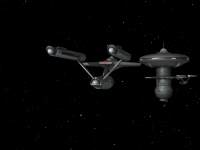
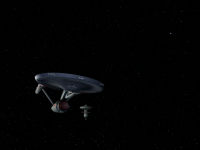
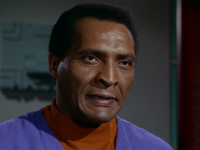
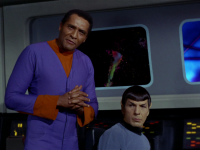
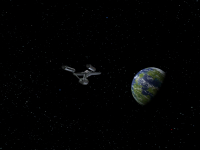
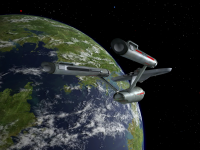
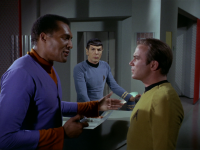
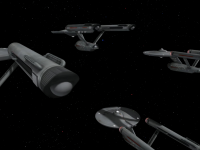
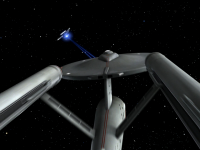
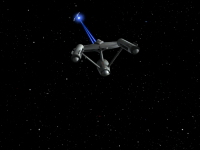
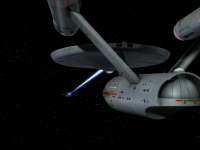
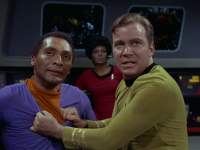
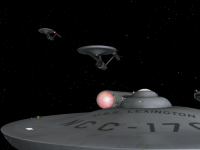
Star Trek TOS - 2x24 - The Ultimate Computer
Originally Aired: 1968-3-8
Synopsis:
Enterprise is used to test the new M-5 computer. [Blu-ray] [DVD]
Filler Quotient:
2, filler, but an enjoyable episode nevertheless. You can skip this one, but you'd miss out on some fun.
- There's no essential plot or exposition in this episode that renders it unskippable, but it's definitely a fun ride!
Problems
None
Factoids
- This episode establishes that Spock holds an A7 computer expert classification.
- James Doohan, who plays Scotty, is also the voice of M-5 and Commodore Enwright.
- Barry Russo, who played Lieutenant Commander Giotto in The Devil in the Dark, also played Commodore Robert Wesley this episode.
- Sean Morgan, who played Harper in this episode, also played Brenner in Balance of Terror and O'Neil in The Return of the Archons.
Remarkable Scenes
- Kirk: "There are certain things men must do to remain men. Your computer would take that away."
- Kirk questioning himself about whether or not his hatred of M-5 is because he doesn't want to lose his job.
- M-5 declaring Kirk and McCoy to be non-essential personnel for the away mission.
- M-5 performing excellently in a war game.
- Kirk: "Machine over man, Spock? It was impressive. It might even be practical." Spock: "Practical, Captain? Perhaps. But not desirable. Computers make excellent and efficient servants, but I have no wish to serve under them. Captain the starship also runs on loyalty to one man, and nothing can replace it, or him."
- Kirk: "20th century Earth. 'All I ask is a tall ship, and a star to steer by.' You could feel the wind at your back in those days. The sounds of the sea beneath you. And even if you take away the wind and the water, it's still the same. The ship is yours. You can feel her. And the stars are still there, Bones."
- M-5 going psycho on the autopilot ship.
- M-5 murdering one of the Enterprise crewmen.
- McCoy: "Please Spock do me a favor and don't say it's fascinating."
- M-5 going psycho on a fleet of four Federation ships!
- Daystrom pleading with M-5.
- Kirk talking M-5 to death.
My Review
This is the best "Kirk-talks-a-computer-to-death" episode yet. The themes of luddism in Starfleet along with the superiority complex of an insecure genius are nicely explored by this well paced and reasonably deep story.
At first I groaned when the act out to the teaser closed on the apparent notion that the very idea of letting a computer control a starship should for some reason be considered scary, as the plot itself in that moment seemed to be exuding luddism. But as the episode progressed it became clear that this luddism, while common among many of the main characters, was regarded by the characters themselves as a character flaw. They all struggled with it and their ambivalence added a delightfully human counterpoint to a story about increased mechanization and automation leading to the obsolescence of certain jobs.
As for Daystrom, I was pretty disappointed by his character. My disappointment stems largely from the fact that as a concept, his character was terrific, but the execution left much to be desired. The basic theme of the story is that as a computer engineering genius and a prodigy at a young age, Daystrom is struggling to top the achievements of his youth by distinguishing himself yet again with an even better invention. That Daystrom's ultimate achievement turns out to be crucially flawed because he invested too much of his tragically flawed character into it is beautifully poetic writing.
Having Daystrom overestimate his own perfection in such a tragically public way by surmising that the best method for making the ultimate computer is to make it exactly like himself is a well written tragic irony and ends up being the centerpiece of the story. Daystrom is flawed. M-5 is a reflection of Daystrom. Hence, M-5 is flawed. But once we examine the details of how such a great concept unfolded in the actual storytelling, it starts to come off as somewhat less profound.
For starters, it's not clear why Daystrom required so much of the crew to evacuate the ship in the first place. Why not leave them aboard in case something goes wrong? Likewise, how could M-5 make such an obvious mistake as going out of its way to attack an ore freighter for no apparent reason or confusing a wargame with a real battle? These are no minor software bugs. You'd think Daystrom would have the resources at his disposal to test these very basic functions in a simulation before the field test with an actual starship. The only reasonable explanation at this point is that Daystrom was incompetent and that this incompetence was a result of his striking personal hubris.
That said, despite Spock's assessment otherwise, M-5's actions did conform to a certain logic, if you assume its motivations were the paranoia and megalomania imprinted onto it from Daystrom's personality. Erecting a forcefield around itself was certainly evidence of this, and a number of Daystrom's own statements lend credibility to this idea as well. At one point, Daystrom mentioned that M-5 was like a child to him and nearly came to blows with the Enterprise crew when they tried to shut it down after it so severely malfunctioned.
Likewise, when the fleet of four Federation ships attacked the Enterprise, Daystrom's only reaction to that was fear that M-5 could be destroyed in the battle, rather than acknowledging that many people could die, including himself, in the ensuing battle. Finally, the plot's resolution revolving around Daystrom's belief in god and the Federation's imposition of the death penalty on murderers doesn't paint Federation society in the most progressive of lights.
While the storytelling isn't perfect, with a few small tweaks and a better ending it could have been worth at least one more point. With the ending as written, Daystrom just suffers a nervous breakdown, Kirk saves the day, and we never hear from the poor man again.
A better version of this story would have omitted the attack on the ore freighter entirely and focused on a longer, more protracted wargame with the Federation fleet. I would also have had Daystrom talk down M-5 rather than have Kirk do it. A suitably profound climax scene would have featured Daystrom outlining to M-5 the flaws in its judgement while beginning to realize the flaws in his own judgement which led to his flawed creation in the first place. By confronting the flaws in his creation, Daystrom would finally begin to confront the flaws in his personality, leading both to the safe cessation of hostilities and a moment of profound personal growth for Daystrom.
Personally, I find that alternate ending a lot more touching than what we saw instead. However, as written, the episode is still terrific and one of Star Trek's best so far.
The following are comments submitted by my readers.
- From Glenn239 on 2012-09-27 at 7:23pm:
'9'. Picking up on the idea of ditching the destruction of the freighter scene and substituting more military exercises with the starship fleet, I think that’s a good idea. Have two military exercises instead of one. M5 loses the first engagement outright, and because M5 is patterned off the egotistical Daystrom, the computer concludes the humans must have cheated the first time.
Anyways, the Enterprise "pooper scooper" effect is demonstrated in this episode. Enterprise just phasered 430 guys deader than doornails aboard the Excalibur not just ten minutes ago, but now the episode is over and Kirk and the boys have no time for that. Lexington…you and Potemkin go scrape that one off the pavement.
I also find it curious that none of the forces trying to take over the Enterprise ever realized that the easiest way to do so would be to open the hanger bay doors with all the internal doors open too. "No one can hear you overact in the cold, dark vacuum of space, Kirk."
- From penguinphysics on 2013-01-10 at 9:06pm:
I think that this episode should have a better rating in the 'filler' category, considering that the Daystrom Institute is so frequently mentioned in later stories. - From Kethinov on 2013-01-10 at 10:46pm:
Occasional casual mentions of the Daystrom Institute are little more than trivia. Such is not an adequate justification to regard this episode as nonfiller. - From Paul Bonzulac on 2013-01-14 at 5:12am:
Great review. I disagree about one thing, though: you have to have Kirk talk the machine into killing itself. Otherwise, the hero is just standing there while the guest-star does all the work. The star of the show has to save the day, after all.
Great point about making the show more about a protracted war-game, but they didn't have the budget for that. They could barely afford Blackula. - From Scott Hearon on 2014-04-10 at 2:09am:
Very nice review, and one I agree with very much. I gave this episode a 7/10 - a really good one, but with a few relatively minor flaws.
I do like your idea for an alternate ending. And to the poster above me, I understand that it's more "Hollywood" to have the "hero," Kirk, be the one who saves the day, but having Daystrom do the talking would have been far better. And Kirk still would have needed to make the decision to leave the deflector shields down, which gives him a chance to use his human intuition and experience to save the lives of his crew. This kind of tag-team action between Daystrom and Kirk would have been more fulfilling to me.
Excellent pacing in this one. The premise grabbed me rather quickly. Once it was clear that this was not merely some social ommentary on machines making humans obsolete and taking away jobs, I was right on board. - From McCoy on 2016-11-02 at 4:10pm:
Sorry, guys, but you don't know many scientist, do you? 90% of them are just megalomanians with no distance to themselves. Your concept of alternate ending is illogical... According to historical sources - most of nazis scientists didn't realised they were doing wrong. They've keep talking about science and progress in turning people corpses into useful things (i.e. making lampshades from human skin). Daystroms "ilumination" would be too utopian happy end for my personal taste. Kirk was the one, who needed to do talking. Well, maybe Spock in that role would be interesting. - From Chris Long on 2017-11-13 at 5:59pm:
Late to this party as usual, but I agree with most of the review.
The death penalty for murder was standard in 1960's USA along with most of the rest of the world.
When the episode first aired, it made perfect sense, in that light... at least to this youngster!
It's easy to armchair quarterback the lack of progressiveness in this episode with regard to that except that... In the episode, 'The Dagger of the Mind', there are "clean hospitals for sick minds!" implying that psychos and murderers were treated rather than executed. Same with 'Whom Gods Destroy'.
Another episode where the Federation shows it has a death penalty is of course, 'The Menagerie'!
TOS can be all over the place when it needs to be.
P.S. I really enjoy your reviews and having a place to spout off! ;-) Thanks!
- From Chris on 2019-02-24 at 9:13pm:
One more comment, late as usual...
I didn't understand why the other ships didn't raise their shields when the Enterprise hit them with full phasers. Surely four fully armed and shielded starships should have handled the Enterprise, super-computer or no!
I can only surmise that the reason for setting the crew ashore was for security reasons since the whole operation was classified.
Then, in the end, as Glenn239 pointed out, there are close 500 dead spacemen and Kirk, Spock, and McCoy as usual, are yukking it up!
I didn't mind the ore-ship bit but a double episode would've been great!
BTW, what do your spam robot checker mean? "OMG Kethinov The Holy Cross" or something? ;-)

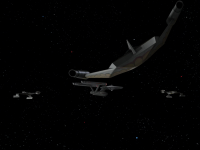

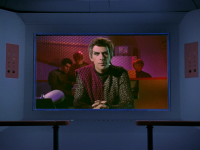
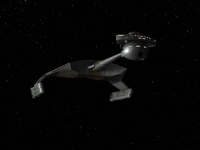
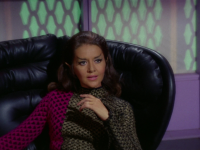
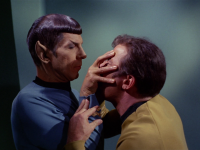
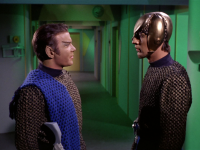
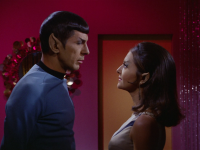
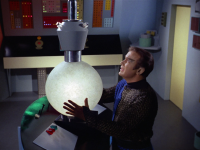
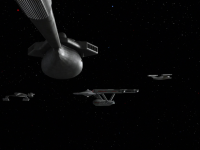
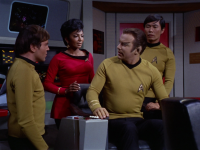
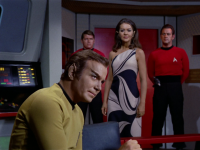
Star Trek TOS - 3x02 - The Enterprise Incident
Originally Aired: 1968-9-27
Synopsis:
Disguised as a Romulan, Kirk steals a cloaking device. [Blu-ray] [DVD]
Filler Quotient:
2, filler, but an enjoyable episode nevertheless. You can skip this one, but you'd miss out on some fun.
- There's no essential plot or exposition in this episode that renders it unskippable, but it's definitely a fun ride!
Problems
- It's mentioned that it would take three weeks to get a message to Starfleet from the Neutral Zone. However in Balance of Terror, it took only a matter of hours.
Factoids
- Spock's rank is mentioned to be commander in this episode. He also mentions having served in Starfleet for 18 years.
- This episode establishes that both the Enterprise and the Romulan ships are capable of warp 9.
Remarkable Scenes
- Cranky Kirk.
- Kirk inexplicably ordering the ship into Romulan territory.
- The Enterprise surrounded by Romulan ships.
- Spock confronting Kirk about the craziness of ordering the Enterprise into the neutral zone in the first place.
- Kirk lying to the Romulan commander.
- Spock evading the Romulan commander's questions.
- Spock betraying Kirk's statements.
- Kirk repeatedly professing that he will kill Spock.
- Scotty threatening to suicide bomb the Romulan ships before complying with their order to follow them back to Romulus.
- Spock maneuvering with the Romulan commander.
- Spock "killing" Kirk.
- Nurse Chapel: "There's no such thing as a Vulcan death grip!" Kirk: "Ah, but the Romulans didn't know that!"
- Scotty's reaction to seeing Kirk as a Romulan.
- Kirk: "Just don't put me inside a bulkhead. Energize."
- Romulan commander: "Why would you do this to me? What are you that you could do this?" Spock: "First officer of the Enterprise." The Romulan commander slaps him. Spock: "What is your present form of execution?"
- The Enterprise cloaking.
- Spock: "It is regrettable that you were made an unwilling passenger. It was not intentional. All the Federation wanted was the cloaking device." Romulan commander: "The Federation. And what did you want?" Spock: "It was my only interest when I boarded your vessel." Romulan commander: "And that's exactly all you came away with." Spock: "You underestimate yourself, commander." Romulan commander: "You realize that very soon we will learn to penetrate the cloaking device you stole." Spock: "Obviously. Military secrets are the most fleeting of all. I hope that you and I exchanged something more permanent. "
My Review
An exciting episode packed with intrigue and several layers of deception. Throughout the story you're left wondering who is playing who and only midway through the episode do we finally learn that Kirk's confusing array of behaviors were all part of an act designed to deceive the Romulans and that only Kirk, Spock, and McCoy had foreknowledge of the details of the mission. And what a bold mission indeed! The Federation ordered them to steal technology from the enemy. This is only the second time we've seen Romulan characters on screen and it's been two years since their first appearance. Since then, much has changed in the political landscape. The Romulans' shared ancestry with the Vulcans has been unmasked and since the cat is out of the bag the Romulans make no attempt to avoid visual contact any further. In fact, the Romulan commander openly discussed her shared ancestry with Spock, referring to his people as "distant brothers." That leaves me wondering which planet the two species evolved on. Vulcan? Romulus? Or somewhere else?
One curious oddity was the brief mention that the Romulans are now using Klingon ship designs. This hints at a possible alliance between the two empires, but there is no mention of that and outside of that quick one liner the concept isn't explored at all. Other oddities included the mention that English is a difficult language for Romulans to learn which seems strange seeing as how the universal translator would seem to mitigate the need for the Romulans to learn English in the first place. Also it seems unlikely that Kirk could walk around the Romulan ship and especially interact with the crew without being recognized as Kirk, despite his altered appearance. Likewise it seemed rather convenient that the Romulan ship's shields just so happened to be down, allowing Kirk and Spock to be beamed off the ship at just the right moment. Finally I found it a bit strange that the cloaking device could be so easily plugged into the Enterprise, despite Scotty's whining about its alien oddness.
On top of that, the whole idea of a hostage exchange seemed like a poor thing for the Romulans to agree to given that they had the Enterprise completely surrounded and quite frankly held all the cards by that point. But in any case, Kirk and Spock's time aboard the Romulan vessel was the centerpiece of the story. It's a bit annoying that the Romulan commander falls in love with Spock so quickly and easily without much of a substantiation, but despite the strangeness of her obsession with winning him over, the whole plot point is well played. I was intrigued by how well the story played on Spock's half human and half Vulcan nature, as the fact that Spock's human ancestry makes him more like a Romulan than a Vulcan is distinctly ironic. The Enterprise Incident is a fine piece of storytelling overall with only minor flaws. More episodes of Star Trek should be like this one!
The following are comments submitted by my readers.
- From rhea on 2008-04-27 at 8:55pm:
It is hard to find things to criticize about this episode. The plot is for once entirely believable. The story unfolds gradually, which adds just the right amount of suspense. A wonderful spy story - a blend of suspense, humor and action - yet not lacking in depth, because unlike many action based spy stories it does deal with the emotional implications that such missions often must include (for Spock and the Romulan Commander).
For once it is not Kirk who gets the girl. There is a beautifully subtle yet captivating eroticism to Spock's encounter with the commander, which is very sensual and essentially mind-based, as opposed to Kirk's usually very physical approach. And it's all the better for it. As a result the short exchange between the two in the end of the episode is very touching and very believable (much more believable than many of Kirk's supposed "true loves"). The not-yet love affair ends not in hatred, but in an honest acknowledgement of something that might very well have been were it not for the circumstances.
Kirk is again in con man mode, something I always love to watch. Both Kirk and Spock seem to have a remarkable talent for espionage and acting, it is a joy to watch them lay the trap. And even McCoy and Scotty get a little screentime. An outstanding episode indeed.
- From Rising Isis on 2012-07-08 at 6:44am:
I came to know Star Trek TOS and instantly became a Trekkie as a child. Because of the blessing of the Internet, I am reconnecting with what feels like old friends, by endeavoring to methodically watch all the episodes of all three seasons. The Enterprise Incident is one I must have missed.
Perhaps it's as a result of reviewing the Star Trek storybook now through the eyes, heart, mind and physicality of adult experience. But what I find to be the most memorable episodes are those that deliver a relationship story with universal themes of love and intimacy that touch my soul with a lasting impression. In this episode, yes, there is the intrigue of espionage. But what I find most intriguing is the character development of genuine admiration, cultural kinship and intellectually seductive intimacy between Spock and the Romulan Commander.
Plus, I knew the taciturn Mr. Spock truly has a gift with words worth listening to when he does speak. But I did not know that Spock was such a deft Mack Daddy with a mind blowing rap for a lady! I agree with Rhea that their interaction displayed "beautifully subtle yet captivating eroticism." As a nerd myself, I found their encounter, intellectual exchange and sensual touching of the hands to be hot!
Very importantly, Spock skillfully navigated his espionage role in what turned out to be a mind field of intimate deception with his principles intact. When you look back, he remained a truthful gentleman through it all. This made Spock's final assurance to the Commander, when she was in doubt, that their encounter deeply touched him in a meaningful way which he would never forget believable, tender and loving. Consequently, he provided a means whereby the Commander could look back in review fondly, and he supported her ability to go forth with her dignity intact. This made Spock's closing presentation to the Commander in the finale a generous, healing and honorable act of compassion.
The writers did real good here, in my opinion. The role for Spock is an outstanding character study on a high-caliber balance of duty, personal integrity and respectful relationship intimacy. This episode left this audience member with an unforgettable impression and a warm place in my heart, indeed! - From Alan Feldman on 2012-11-18 at 6:42pm:
The Enterprise Incident
Definitely a fun episode, but it does have some problems. It was indeed well executed, and starts out great, but then goes down to only good.
The Romulan commander always sound a little nervous, no? Maybe it's just me.
During the meeting in the briefing room, after being asked how the Romulans could so easily sneak up on them, Spock says, "I believe the Romulans have developed a cloaking device". But we, and the entire crew, already knew that from "Balance of Terror", two seasons back. On top of that, Star Fleet knew, too. They were the ones who initiated the plan!
How did Star Fleet know that there was enough of a chance to pull this off to be worth taking such a big risk? To have Spock all but seduce the Commander (and to know her gender!), to find the device, get past the guards (all two of them), quickly remove the device, know it was light enough to carry, get back to the ship with it, install it on the Enterprise in only a few minutes and know it would work, seems like a rather unlikely sequence of events to me.
And this gives the Romulans a good excuse to start a war -- based on "Balance of Terror", anyway.
Why did the Romulans wait for Spock to recite his "statement" before attacking? They could have destroyed the Enterprise and then done the statement bit.
Why were the ships of Klingon design? I read that it was because the designer of the Romulan "bird of prey" ship got pissed off about something and destroyed all the models!
AEF - From Scott Hearon on 2014-04-11 at 1:19am:
I thought this was a great episode. Although it did become clear, even before the big reveal, that Kirk and Spock were playing at something, it really wasn't clear exactly what it was. This kept me thoroughly interested.
When we DID learn that it was all a ploy to steal the cloaking device, we then had the interesting interactions between Spock and the Romulan commander (I love the fact that it was a woman - I'm guessing that was a bit progressive for the 1960s).
Like most of the very best episodes that I've seen, this one features an antagonist who is fleshed out much more clearly than the many 1-dimensional villains that we've had to deal with. The mutual respect offered between the commander and Spock and Kirk is extremely satisfying.
Great episode, no doubt. - From jd_juggler on 2015-03-23 at 11:56pm:
I will admit that this was one of the better episodes, but it did have its problems. As someone here already wondered, how did they know that the romulan captain was a woman? If they didn't, what was the plan?
In the deadly years, we are told that romulans do not accept surrender, and we are led to believe that the enterprise and its crew would be completely destroyed. But in this episode, apparently the capture of the enterprise intact would have a great career move for the romulan captain. In addition, she seemed sincere in her offer to spare the lives of the crew of the enterprise. Was she lying? Surely she couldn't have expected Spock to be her ally (and more) if the enterprise crew was put to death.
This episode makes it clear that Spock CAN tell a lie; speaking of Kirk, Spock said: "he is not sane".
Again, someone already mentioned this, but it bears repeating: the enterprise plan required the assumption that the cloaking device was portable, and could be carried by one man. More importantly is the assumption that Scotty could figure out how to install it so that it could work for the enterprise. "Mr. Scott, even though this is alien technology, developed completely independently of earth technology (and most likely independent of ANY technology known to ANY member of the federation, we expect you not only to figure out how it works, but also to make it work for the enterprise in what might be a matter of minutes. If you can't, then probably you and everyone else on this ship will die. No pressure."
Wouldn't the romulan ship have its shields up, so that the transporter wouldn't work to beam Spock off the ship? And when the romulan captain grabbed Spock when she realized he was being beamed off the ship, what did she THINK would happen? Either she would become a captive (if the enterprise escaped) or she would be killed (if the enterprise was destroyed). For that matter, why hadn't romulans already taken over the enterprise, ejecting all members of the crew from the bridge, engineering, auxiliary control, and anywhere else they could regain control of the ship ? - From Chris on 2019-01-13 at 12:34am:
Most of these comments are spot on so I need not rehash my take of the episode... much.
My biggest complaint is Kirk, as a Romulan, still had his hair quaffed like Kirk, and not like a Romulan at all. His hair should've been dyed black and combed down etc. etc...
He looked stupid IMO.
I would surmise that Starfleet had actionable intel on the cloaking device to make the mission worthwhile in the first place.
To risk a starship and its crew for this without rock-solid knowledge of the device they intend to steal, would obviously be insane.
I imagine that the Romulan intelligence services were thoroughly thrashed after the Enterprise got away and lots of spy suspects were executed or sent to gulags for the fun of it.
Obviously, this device is a massive refinement of the one in Balance of Terror. It does not consume massive amounts of energy and is capable of cloaking huge ships like Klingon Birds of Prey instead of those puny little Warbirds with their massive weapons.
The Romulans were far more magnanimous than Kirk and his crew as far as negotiations went. They offered (sacrificed) two of their crew for no good reason and that made me cringe even as a child. Then suddenly Scott declares that they are no longer hostage exchange pawns but are now prisoners to be sent to the brig. These two guys have done nothing! I dunno, it just bugs me.
The Romulans should have just blown the enterprise out of the sky.
As an adult, the notion of a part of space to be avoided for the 'Next, however many, Solar Years' due to Corbamite contamination seems beyond preposterous. We know that Space is a VERY deadly place, to begin with! That Corbomite stuff must be some seriously bad radioactive Juju! - From Alan Feldman on 2022-08-26 at 12:46am:
Round 2: Starfleet sticks it to Kirk yet again: KIRK: That's what this whole masquerade was about. To keep the Enterprise and the Federation off the hook.
Yes, it's very accommodating of Kirk to take 100% of the risk. But it does make for a great opening, with Kirk going mad and such. Only works once, though. Perhaps the all-time winner of the scene to spoil.
And this isn't the only time Starfleet was dick-ish: A Taste of Armageddon (the dick-ish diplomat), The Alternative Factor (for not giving Kirk any reinforcements), Amok Time, The Ultimate Computer (for the stupid idea of insisting most of Kirk's crew leave the _Enterprise_), For the World Is Hollow and I Have Touched the Sky, The Way to Eden (for one Tongo Rad's father being in high places), Turnabout Intruder (for not allowing women to be starship commanders).
I like the way Tal talks.
Joanne Linville is a most welcome guest star.
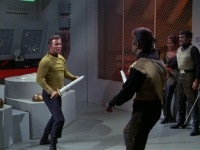
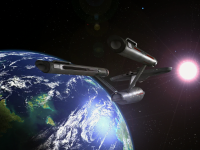
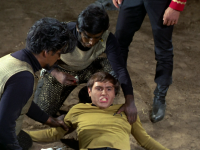
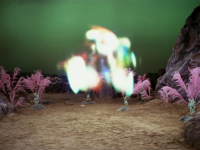
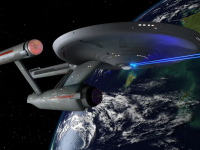
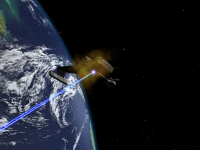
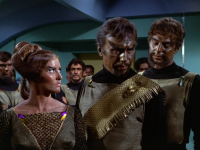
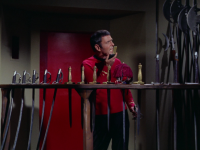
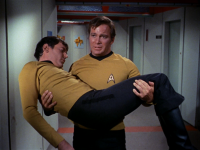
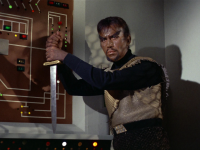
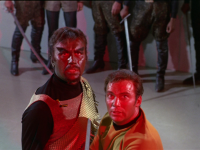
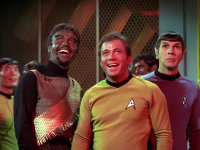
Star Trek TOS - 3x07 - Day of the Dove
Originally Aired: 1968-11-1
Synopsis:
A malevolent entity pits Klingons against the Enterprise crew. [Blu-ray] [DVD]
Filler Quotient:
1, partial filler, but has important continuity. I recommend against skipping this one.
- Kang's character will recur in DS9: Blood Oath and Voy: Flashback. However, it isn't absolutely essential to watch this episode first in order to fully get his character in those later appearances.
Problems
None
Factoids
- This is the first episode to feature a Klingon woman.
- This episode establishes that beaming from one point in a ship to another point in a ship is extremely dangerous.
Remarkable Scenes
- Chekov's outburst against Kang for having killed his brother.
- Scotty freezing the Klingons in the transporter buffer.
- McCoy and Chekov expressing unrestrained bias and hatred toward the Klingons.
- The Enterprise destroying the Klingon ship.
- The sword fight between the Klingons and the Enterprise crewmen.
- Sulu claiming Chekov is an only child and that his "brother" was fictional.
- Kirk: "What about the armory?" Scotty: "I'm in there now, sir. And you've never seen such a fine collection of antiques in your life!" The camera pans out and a massive sword collection is displayed.
- McCoy freaking out about Kirk and Spock planning a truce.
- Kirk and Spock discovering the alien entity.
- Scotty, Spock and Kirk freaking out too.
- Kirk trying to convince Kang's wife to team up against the entity.
- Kirk, goading Kang to stab him: "In the heart, in the head, I won't stay dead!"
- Kirk and Kang calling a truce, thus robbing the entity of its power over them.
My Review
A great idea for an episode with only a few flaws. The central success of the story is pitting the Klingons and the Federation against a common enemy. A similar theme is hinted at in Errand of Mercy when Kor briefly proposes to Kirk that they work together to defeat the Organians, but this episode takes that idea and crafts an entire story out of it; quite a good one at that.
Aside from simple pleasures like watching Kirk outmaneuver the Klingons using the transporter buffer and taking in the ridiculousness of sword fights on a starship (Sulu always seems to find a sword to go rampaging with, doesn't he?), the story has some measures of intelligence and depth as well. I was particularly fond of the hints of propaganda influencing bias of both sides against the other and I was fond of the characterization of Kang's wife in that she would not trust Kirk until he proved by not executing her that not everything she believes about the Federation is true. Likewise, the moment Kirk and Spock both briefly questioned whether their own judgement could be trusted due to the entity's mind-altering nature was a nice touch.
The biggest flaw in the story, not unlike so many other Star Trek episodes, is that it takes them all so long to figure out that the entity is responsible for their conflict. The climax of absurdity here is the moment when swords start appearing in the rec room and nobody questions it at all. Everyone just picks up a sword and starts fighting. Even after the Klingons have a moment to reflect on that event, they don't bother to question their good fortune. They just keep plotting against the Enterprise crew seemingly oblivious to the fact that something was terribly wrong.
But it wasn't just the Klingons who were slow on the uptake there. Not long after that scene, Kirk starts rattling off a hypothesis about how the Klingons could have transformed ordinary objects into weapons. Spock quickly brings some sanity back to the discussion by pointing out that it's ridiculous to assume that the Klingons could have done that. One of my favorite lines was when Spock said "if they had such power, would they not have used it to create more effective weapons and only for themselves?" Thanks Spock for stating the obvious. Apparently Kirk needed to be slapped around with elementary logic today.
There are a few other smaller groan-worthy details in the story too. Scenes when characters talk to the computer are almost always annoying and Spock's conversation with the computer analyzing the entity in its shrill, monotone voice and drawing obvious conclusions was no exception. Kirk also had a few choice awkward lines in this episode too, such as telling Kang to "go to the devil" and declaring (sarcastically?) that it's "stardate armageddon" at one point.
Though this sort of awkwardness is not uncommon for Star Trek by this point and it's easily forgiven. With more polish, better plotting, a faster pace, and perhaps a more compelling common enemy for the Federation and the Klingons to engage, this episode easily could have earned a perfect score. Certainly one of the better installments of the series thus far.
The following are comments submitted by my readers.
- From Orion on 2011-05-08 at 4:51am:
Silly and over-the-top, but we like that in an old episode of Trek. You also get a possible moral lesson; the episode may be alluding to the Vietnam war, as well as racial tensions of the time. We even see Spock almost go into a racial rage. These kind of moral components in Trek can sometimes be too obvious, but this episode keeps the issues just under the surface.
Regarding the high def release:
The outside-the-ship shots near the beginning of the episode have been improved quite a bit. - From Alan Feldman on 2012-09-03 at 6:04am:
This is a fun episode.
Michael Ansara is great as Kang, no?
Walter Koenig does some great screaming, no?
The scene where the alien entity changes the ship's course to exit the galaxy (starting at 12:12) is great! It starts with Uhura getting all worked up over her trouble making outside contact while telling Kirk about it. Then the boom and the ship starts shaking. I love how Shatner plays this. Look at the fear in his face as he backs away from Sulu. At one point you can even see him swallow. Very well done!
I think the alien special effect was also well done. When it goes down the corridor and goes down into the hole, it looks like it's really at that distance (well, pretty damn close, at worst). It looks pretty good the rest of the time, too.
Right about 21:24, Sulu gives a quick karate chop to a shoulder of one of the Klingons. This knocks him unconscious. Is it really this easy to bring a man down? (Hey, who needs the Vulcan neck pinch when a simple karate chop will do?) This type of thing happens a lot in Star Trek TOS.
At about 35:23, the alien entity shows itself to Kirk, Spock, and Mara. Why? How can an all-powerful entity make a simple blunder like this? Overconfidence, I guess. And what does it take to convince Mara that the alien entity, which is in plain sight, is responsible for all the violence? On top of this, Lt. Johnson enters the scene all agitated by the alien entity, all charged up, ready to kill all the Klingons -- "It's them or us, isn't it?" -- thereby providing a clear example of what's going on. Then Kirk and Spock figure out the whole schmear, explain it clearly with Mara right there, with all of them staring at the entity, and _still_ she doesn't believe.
I love seeing everyone getting so worked up seeking vengeance (losing it, so to speak). Everything is normal and then an individual suddenly gets angry, agitated, and vengeful (or enters the scene this way). It's always a trip when our heroes get out of character, like Spock on spores in "This Side of Paradise", or Chekov in "The Way to Eden".
Intra-ship beaming: "Pinpoint accuracy is required. If the transportee should materialize inside a solid object . . ." says Spock. Well, there never seems to be a problem with materializing with one's feet in the ground, or one hanging in the air, or one's head in the ceiling, or upside-down, etc. Whatever. Just add it to all the other absurdities I mentioned in my comments on another episode (The World is Hollow . . . , I believe).
The actress playing Mara does some great acting when Chekov is upon her.
Did you catch Mara tossing a sword to Kirk? What a great toss and a great catch! Doesn't seem to me to be such an easy thing to do. That's probably why it was done in separate shots.
I like it when Bones, Spock, and a few red-shirts just walk down the corridor (la-dee-dah) and suddenly start sword fighting with a few of the Klingons. Great scene.
The alien's ability to rapidly heal the wounded -- even those with fatal wounds -- is a bit much. But we couldn't have a story, otherwise.
At the end: Boy, what does it take to convince Kang that there's an alien entity keeping them fighting? It's in plain sight and still he pauses. Kirk clearly explains what's going on and he's still not convinced. I think either Kang thinks it's "one of Kirk's tricks" (perhaps a holographic projection) or his heart is hardened -- no, sorry -- his mind is affected by the entity.
It seems to me that there are a few times when the alien is the wrong color.
OK, here's my big question for this episode: The Federates (is there a better term? "Members of the Federation"? "The humans and Spock"?) and the Klingons make peace. The alien entity departs. Then what? Kirk just gives them a ride to the nearest Klingon outpost or planet? What do these sworn enemies do along the way? Have dinner together, play cards and 3D chess, engage in some light chit chat, dance and party with each other?
Imagine being Kang and having to explain this to your superior: "Yeah, an entity made of blurry spinning-pinwheel lights killed 400 of my crew, made us and the Federates all angry, agitated, and vengeful over nothing, turned phasers and other items into swords, sent us racing out of the galaxy at warp 9, . . . ." Yep.
Kirk's speech to the entity is a little too preachy and, well, silly. There has to be a better way to end it.
Side note: The Klingon ships just don't look scary to me. The head of the ship looks like it's wearing a hat. The Romulan ships look much more menacing.
Bonus point: Was the name "Klingon" derived from "cling on"?
AEF - From Scott Hearon on 2014-04-12 at 2:23am:
I have several problems with this one, though there was enough to keep me engaged throughout the tale.
Firstly, if the agitating force was composed of pure energy, why did is linger around where the humans or Klingons could see it an surmise its essence? Pretty stupid that, for an otherwise exceptionally powerful entity.
On top of that, the writers played it pretty fast and loose with exactly what this creature could do. It can transform physical objects into whatever will stimulate hatred, but it can't do so when the combatants start to figure things out and act against it? It doesn't really hold up under much scrutiny.
The ending was horrendously awkward. Watching the Enterprise crew and the Klingons forcing themselves to laugh at the antagonist, leading right into the credits was just plain weird and abrupt.
And my god, the amount of bronzer used on the caucasian actors playing the Klingons? Yikes.
And still, there were a few decent things about this episode. As a study of the culture of violence, it does show some thoughtful consideration of the futility of hatred of such a stance. The Klingons exemplify one of the more destructive aspects of the human experience, and this episode does a nice job of using that idea effectively. Unfortunately, this is one of the few positives about this episode.
- From life coaching jobs mn on 2015-11-05 at 10:14am:
Kathy Lester, a monetary marketing consultant, mentioned the retreats supply the prospect to
unplug from expertise and the demands of life while focusing upon spirituality. - From Chris Long on 2018-08-05 at 2:01am:
The most stupid episode of all time!
Good god!
Really? "You wrecked my ship and therefore I claim yours"? Really?!?!
Then the beam-up 'treachery'?!? Kirk has to be honorable in this BS? War sucks baby, even an honorable one!
Pure nonsense through and through and the entire premise is stupid beyond words!!!
I hate the episode at every turn!!!
Spock's Brain was far more entertaining and even realistic!!!
Who wrote this crap? - From Pietro on 2019-07-07 at 3:04pm:
Kethinov, you're biggest problem with the episode is that it takes them all a long time to figure out that the entity is responsible for the conflict. But, the way that this makes sense is to say that they're under the influence of the entity that makes them lust for violence, and aren't thinking straight. But yes, we don't exactly understand this until 3/4 of the way through, so it's annoying to us as viewers that they don't question it.
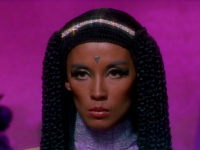
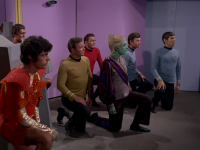
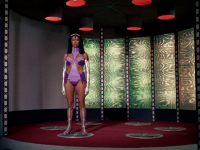
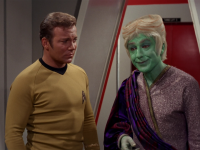
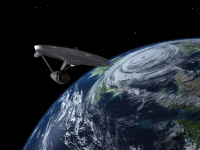
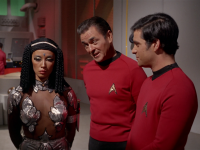
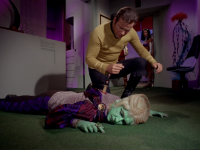
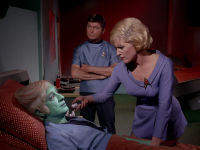
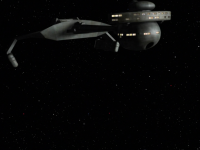
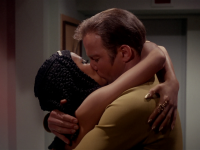
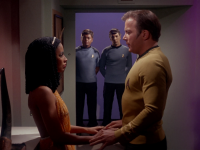
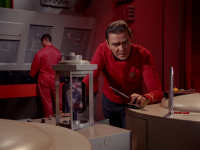
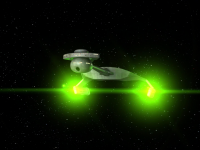
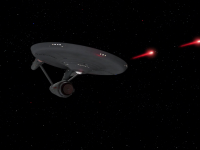
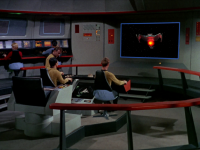
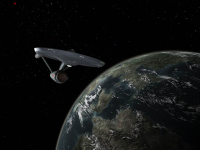
Star Trek TOS - 3x13 - Elaan of Troyius
Originally Aired: 1968-12-20
Synopsis:
Kirk is distracted while the Enterprise is threatened. [Blu-ray] [DVD]
Filler Quotient:
2, filler, but an enjoyable episode nevertheless. You can skip this one, but you'd miss out on some fun.
- There's no essential plot or exposition in this episode that renders it unskippable, but it's definitely a fun ride!
Problems
- At one point Elaan says: "If I have to stay here for ten light years, I will not be soiled by any contact with you." That's great Elaan, but a light year is a unit of distance, not time.
Factoids
- This episode's title "Elaan of Troyius" deliberately resembles Helen of Troy. An earlier version of the story was even named "Helen of Troyius." Both stories are about a woman whose marriage is motivated by the threat of war. In essence, this episode is Star Trek's version of Shakespeare's plays "The Taming of the Shrew" and "Antony and Cleopatra."
Remarkable Scenes
- Scotty: "Captain, you'll not be using the warp drive? All the way on impulse? That'll take a great deal of time!" Kirk: "You in a hurry, Mr. Scott?" Scotty: "No..."
- Uhura offended that Elaan disliked her quarters.
- Kirk, regarding Elaan's desire to throw things: "If that's the only way you can get gratification, I'll arrange to have the whole room filled from floor to ceiling with breakable objects."
- Kirk trying to teach Elaan manners.
- Elaan: "I will not go to Troyius, I will not be mated to a Troyian, and I will not be humiliated, and I will not be given to a green pig as a bribe to stop a war!"
- Kirk: "Mr. Spock, the women on your planet are logical. That's the only planet in this galaxy that can make that claim."
- Elaan using her tears on Kirk to seduce him.
- Crichton killing himself.
- Kirk and Spock discovering that dilithium crystals are abundant in this system and that's why the Klingons want it so bad.
- Kirk using the dilithium in Elaan's necklace to repower the engines, outmaneuver the Klingons, and save the day.
My Review
This episode strongly resembles Journey to Babel although lacks some of the terrific details and layers that made that episode shine so bright. Nevertheless, Elaan of Troyius still stands out as one of Star Trek's better stories. The character of Elaan was both well conceived and well acted. Her outrage at being little more than a bribe to stop a war was certainly understandable and her childish behavior was consistent with what one would expect from an over-privileged elitist.
It was amusing to see her demean just about everyone around her, going so far as to explicitly refer to everyone around her as "inferior" which is a distinct irony given that her people don't even possess warp drive. The fact that her people lack warp drive is an odd detail, as it would seem someone in the Federation broke the Prime Directive long ago, since Elaan's people clearly have knowledge of the inter-stellar nations which do possess warp drive and the Federation is more than happy to engage in diplomatic missions with this warp-incapable species.
I was sad to see that her people are yet another alien race which looks exactly like humans, although I was glad to see the Troyians sport a unique look. I enjoyed Petri's character just as much as I enjoyed Elaan's. Both were stuck up and self righteous in their own charming ways such as when Petri after having been stabbed resolved himself to have nothing further to do with the mission even if it ended the ceasefire, or when Elaan asked Kirk to completely obliterate Troyius with the Enterprise so there would be no need for the marriage.
And yet both of them had an innate understanding of the larger issues plaguing their people and how they must personally sacrifice in order to serve the greater good. Petri got over his disgust for Elaan and Elaan resigned herself to a life of "only responsibilities" and "obligations." Elaan and Petri faced death together at the hands of the Klingons and that trial by fire ultimately helped bring them and their people together perhaps once and for all.
Adding to the intrigue of the episode was the amusing detail of Elaan using her tears to seduce Kirk. Perhaps someone should have let Elaan know that Kirk needs no magic potion to fall for the hot alien woman of the week! In any event, I was kind of annoyed that no one briefed Kirk on the danger of her tears, but regardless of whatever plot contrivance it took to get Kirk hooked on Elaan, the drama induced by this trope was fun. By the end of the story, Kirk had to deal with a lot more than his annoyance with the guests aboard the Enterprise and the looming threat of an armed conflict with the Klingons. He also had to allow his heart to be broken by seeing to it that Elaan was married off to another man, for the greater good of the Federation.
The battle with the Klingons was certainly among the finest of the episode's many highlights. Everything from Kirk's bluff to the open combat to finally Kirk's daring maneuver using Elaan's dilithium necklace was terrific tactical fun. The only detail I felt was missing from the episode was a more firm geo(astro?)political basis for the territorial conflict between the Klingon Empire and the Federation. It certainly makes sense that the natural resources in dispute are a fine basis for such a conflict, but we see very little in the way of setup or consequences for the skirmish that takes places in this story. Does open combat with the Klingons abrogate the Organian treaty? Why were the Klingons willing to risk the treaty over a single planet's natural resources?
With a tighter story and more attention to detail on the larger scale political motivations of the nations involved, this episode easily could have been worth as many points as Journey to Babel or perhaps even a perfect score. Although what we got instead was certainly a fun ride.
The following are comments submitted by my readers.
- From Orion on 2012-02-11 at 2:21am:
This one is very entertaining. It's hard to believe it's a Season 3 episode. Elaan is a strong guest star; much more interesting than we are used to. Of course, being filmed in the 1960s, we still get some sexism in there (Kirk finds another way to slap a woman, and he comments how Vulcan is the only place where women are logical).
The space battle feels a little confusing and takes up more time in the episode than is needed. But hey, this is season 3 and my expectations are low. Good episode.
For those who are watching TOS on Blu-Ray, this is the episode that has been enhanced the most. The long battle with the Klingon ship has been completely redone. Also, the planet (from orbit) has been replaced by a very lush and detailed-looking one. - From Glenn239 on 2012-11-16 at 1:20pm:
Great episode - '8' The retelling of The Taming of the Shrew, Trek style. Lines like, "Vulcan is the only planet in the galaxy where the women are rational". Pure comedy gold.
The third season had its moments, and this was one of them. This time around the Klingons are thrown in to the plot create the dramatic background for Kirk and his latest (but well acted) tart. The Klingons look a bit tacked on, but it worked and serves to underscore how much better some of the earlier episodes might have been had more use been made of them. Think of it - The Apple? Klingons. Return of the Archons? Klingons. They're like the ranch dressing of plot devices.
- From Alan Feldman on 2013-01-19 at 10:37pm:
Elaan of Troyius
I can't believe the opening shot of the Dohlman -- scanning slowly from toe to head! She looks pretty good.
I found it painful to watch Kirk explaining a fork and knife and such to the Dohlman.
Why the incredibly abrupt change of her from super brat to totally smitten? It takes like 3 seconds. Did I miss something?
Kirk also did a quick switch, "curing" himself of the tears-spell: still under the spell in the transporter, but cured, once back on the bridge. But at the end he didn't look quite cured to me. He looked a little bit struggling in his mind with the whole thing. He just didn't seem quite back to normal. Maybe it's just me.
How can Petri be up and about so soon after having been stabbed in the back? Not only is he up and about; you'd never know he was critically injured!
The combat part was pretty good.
I'm sorry, but the head of the Klingon ship looks ridiculous to me. It looks like it's wearing a hat.
AEF
- From Chantarelle on 2013-06-18 at 8:50am:
Thanks for the review. I'm very new to the Star Trek world and was curious whether my opinion matched other peoples. Your review matches exactly what my brain thought, just a lot better worded :-) - From Scott Hearon on 2014-04-12 at 7:57pm:
I'm sorry, but I give this one a 4/10.
There are definitely some strong elements to the plot, but I thought that their execution left much to be desired.
Firstly, unlike some viewers who find Elaan "hot" or "charming," I found her infuriatingly annoying. Arrogance is never funny to me, and it's even less humorous when someone is so arrogant as to start attacking and stabbing people. That's not cute. That's flat-out crazy.
On top of this, Kirk's method of going all Dr. Phil on Elaan was foolhardy at best and outright irresponsible at worst. He was charged with getting Elaan to her destination in a more congenial, enlightened state; so what does he do? He charges right in a starts berating her and literally manhandling her. Not a very diplomatic approach, and it clearly failed miserably.
And then, for no obvious reason, Elaan suddenly lightens up and decides to accept her fate. Sure she had seen some of the trouble that she caused, but it certainly was no worse trouble than she had already been causing everyone from the moment she beamed aboard the ship. The shift was extremely abrupt. The shame is that it didn't have to be. If Elaan had been given more time to explain her situation, essentially being "gifted" to another group of people, we might have been able to empathize with her a little more. Yes, this notion is brought up, but it was not explored in the depth that it could have been.
I know Kirk is the star of the show, but I almost feel as if Spock would have been the better choice to deal with such an emotional hot-head like Elaan. Without someone reflecting her own agitation and fury back at her, she probably would have calmed down more quickly.
Finally, Kethinov's observation about the Troyians technology is dead-on. How, if they only have "nuclear" power, are they even embroiled in a war with a distant planet and civilization? And how, exactly, do they even pretend to superiority over groups of people whose technology and power must far surpass their own? It didn't jibe.
I will say that the way that the Klingons were incorporated into the story was well-done. It's one of several interesting ways that the Federation and the Klingons continue their Cold War chess match. - From Peter on 2015-01-09 at 4:57pm:
Not the best episode, but I was intrigued to see this again recently on TV here in the UK by one thing in particular - we often hear of the 'first interracial kiss on TV' between Nichelle Nicholls and William Shatner (though I understand there's some disagreement about it being the first) - and here we are, just a few episodes later, and isn't it happening again? Only this time it's between a white man and a woman of Vietnamese/French ancestry. Is it not also worthy of comment? Star Trek was truly ground-breaking in many ways for its time. - From Mal on 2015-06-20 at 8:40am:
Yes, Star Trek had the first black-white kiss and the first Asian-white kiss all thanks to our resident horn dog, James T. Kirk.
It was also said, "She looks pretty good." That my friend is an understatement akin to saying the surface of the sun is kind of hot. She was stunning, sexy and sultry. That face, that body, that voice! France Nuyen was the most beautiful and sexy guest star of the show IMO with Barbra Luna coming in a close second. If you count recurring characters, then Nichelle Nichols comes in a solid third.
As for the actual episode, it was not one of the all time greats but it was solid. Considering he was under a spell Shatner's performance was reserved, almost understated at least by his standards. Compare that to how he responds to being under a similar love spell in 'A Private Little War'.

Star Trek TAS - 1x11 - The Terratin Incident
Originally Aired: 1973-11-17
Synopsis:
A strange flash of light paralyzes the entire Enterprise crew and all organic matter begins to shrink. [Blu-ray] [DVD]
Problems
- Arex claims his eyes can't reach the optical instruments at his station. But there are no optical instruments at his station... Now if he had Sulu's job, or Spock's job, I might have some sympathy for him.
Factoids
- Starfleet uniforms are made of organic matter called xenulon.
Remarkable Scenes
- The crew of the Enterise shrinking.
- The little crew trying to operate the ship's equipment.
- Sulu breaking his leg by falling from his station on the bridge.
- Chapel nearly drowning in an aquarium and Kirk saving her using a string like a rope.
My Review
This episode is remarkable in the fact that the story could not have been done in the live action series because the special effects wouldn't have been up to the task. Additionally, the science behind the crew shrinking is extremely good, especially by TAS standards. It was fun watching the miniature Enterprise crew struggle to operate the ship's equipment. Only the resolution of the plot was a bit contrived. Once again the transporter is the miracle cure, which is annoying. Even more annoying is Kirk's hesitation in rescuing the Terratins. Overall, a great episode though.
The following are comments submitted by my readers.
- From tigertooth on 2017-03-19 at 11:29pm:
This is another poll that clearly got spammed (or maybe a bug caused a bunch of zero votes to accumulate). The other TAS episodes have a few dozen votes total, but this one has nearly 200 votes, and 3/4ths of them are zeros!
If you took away the 144 zero votes (as of this writing), the fan voting average would be 6.7 instead of 1.46. So these fraudulent votes make the average useless.
If there's any way to eliminate the bogus zero votes, that would make the fan voting averages much more useful data. Thank you.

Star Trek II: The Wrath of Khan
Originally Aired: 1982-6-4
Synopsis:
Exiled by Kirk, Khan returns to seek revenge on the man who banished him and his followers to a dying planet 15 years ago. [Blu-ray] [DVD]
Problems
- How could Chekov remember anything about Khan? And how could Khan remember anything about Chekov? Chekov wasn't aboard ship in TOS: Space Seed...
- Why didn't McCoy do an immediate medical scan of Chekov and Terrell as soon as they mentioned having alien creatures placed in them?
- How are they talking during transport?
Factoids
- This film establishes that starfleet has kept the peace in the Federation for about 100 years.
- This film was nominated for the 1983 Hugo Award for Best Dramatic Presentation.
Remarkable Scenes
- The simulation at the beginning.
- Kirk to Spock: "Aren't you dead?"
- Khan sticking the little alien parasites in Chekov's and Captain Terrell's ears.
- Spock and Saavik speaking to each other in Vulcan about Kirk.
- Chekov under Khan's control.
- McCoy: "Who's been holding up the damn elevator?!"
- Spock: "The needs of the many outweigh the needs of the few."
- The overview of the Genesis Device.
- McCoy: "According to myth, the earth was created in six days. Now watch out, here comes Genesis! We'll do it for you in six minutes!"
- Khan: "Ah Kirk, my old friend. Do you know the old Klingon proverb that tells us revenge is a dish that is best served cold? Well, it is very cold in space."
- Khan attacking the Enterprise.
- Kirk using the Reliant's access codes to drop the shields on Khan's ship.
- Captain Terrell killing one of the people down on the planet. I love the vaporization effect.
- Kirk: "Khan!!!"
- The revelation that David was Kirk's son.
- Kirk declaring that he made it through the training scenario by cheating.
- Kirk egging Khan on.
- The battle in the nebula. Wow!
- Spock Vulcan neck pinching McCoy and mild melding with him.
- Genesis device exploding.
- Spock: "I have been and always shall be your friend."
- Spock's "death."
My Review
This film is a wild ride and a fan favorite. One of my favorite details is how well they handle the aging actors; everybody was getting old in the 1980s. One of the first things the film does is have all the characters lament about their ages. Gives it a sense of realism. Just about everything in this film is spectacular. I only take off points for the fact that Spock's death was contrived in that it's incredibly obvious that he will be brought back to life. The film would have been far more moving if it weren't for the blatantly obvious setup for his resurrection in the next film. Besides that, there are a few other problems as well. For example, there's the obvious problem with how Chekov would have remembered Khan and visa versa. And then there's the Genesis device. It is, quite literally, a plot device. Plus, this film implied that the Federation will abandon all its research on Genesis due to the events of this film. Why would they do that? Clearly the Genesis device did exactly what it was supposed to do! Finally, Khan's overzealous devotion toward killing Kirk was a little overdone. Especially with regards to the Shakespeare references. That said, these things do little to trample on such a great film. With a little more polish, this film could have earned a perfect score.
The following are comments submitted by my readers.
- From Greg Bonkowski on 2006-05-04 at 6:53pm:
Simply the best Trek film ever!!! Khan!!!!!!!!!! - From jaylong on 2007-04-13 at 2:59am:
"he tasks me..."
love it - From JR on 2008-07-22 at 11:31am:
"How could Chekov remember anything about Khan?"
I don't see this as a problem. He could have read about it somewhere, or maybe the other people at the Enterprise at the time told him about it after he came onboard. I assume the events in Space Seed were logged and submitted to Starfleet, and their computers already had a file on Khan with pictures. Now, Khan knowing Chekov, that's the real problem. - From Lennier on 2009-02-15 at 3:31am:
"Space Seed"'s stardate is 3141.9.
"Catspaw" (an episode with Chekov) has a stardate of 3018.2.
I like to think that this means that "Catspaw" takes place before "Space Seed". Therefore, Chekov could very well have seen Khan, and vice versa. - From Kevin Lopez on 2009-04-06 at 4:43am:
it wasn't blatantly obvious that he was going to be brought back to life at the time: Nimoy was tired of playing Spock and wanted his character killed off. He later changed his mind and directed films III and IV. Your criticism is unfair. - From Kethinov on 2009-04-06 at 9:24am:
I stand by the critique. It's clearly a trap door. Whether or not Nimoy did or did not plan to ever play Spock again, it was clear the writers wanted the option of bringing him back conveniently. Sort of like how Data only "half" died in Nemesis. He could easily be brought back via B4. - From S. M. Willis on 2010-01-06 at 12:54am:
Melville, not Shakespeare. And Milton. - From Jeff Browning on 2011-10-25 at 11:26am:
Having reviewed all of Voyager, most of TNG, and much of DS9, I am now turning to the Star Trek movies to revisit them as well. Of course, I saw them all in theaters as they were released, and have seen them again since then.
Annoyingly, Star Trek, The Motion Picture is not available on any streaming media accessible to me. If anyone knows how to find this film on the internet, please post a comment as well.
Several issues on ST: TWOK:
1. The Genesis device creates daunting scientific issues. First, there is the little matter of conservation of energy. In order for life to exist, energy must be inserted into the system. Living things do not live on nothing. Ultimately, the source of all energy for living things is light. Either animals eat plants (which are simply a form of light energy fixed into hydrocarbons), or animals eat other animals, who in turn eat plants. Ultimately we are all burning energy from light, in the case of Earth, the Sun. However, on Regula 1 we see a "Genesis Cave" which is filled with living things, all of whom are illuminated by a light source (which we conveniently never see). What is the source for this light? Regula 1 is an "airless, lifeless hunk of rock" according to the dialog earlier in the film. Similarly, when the Genesis device explodes in the Mutara Nebula, it forms a "Genesis Planet" which is clearly illuminated. In one shot we see a star behind the planet, a star which clearly wasn't there before. The Genesis device created a star? That would be a trick even greater than converting inorganic matter to living matter!
2. Another daunting scientific issue has to do with the nature of biological evolution. Star Trek seems obsessed with the concept of evolution, as I have stated in other posts, and has a very unscientific view of this concept. The Genesis device has issues in this area. Specifically, evolution would require a process of billions of years for life to develop which would be adapted to the particular conditions in which it exists. The Genesis device does not seem to involve any adaptation whatsoever. Instead, life simply occurs instantly which is perfectly adapted to the aesthetic and functional requirements of humans. Given that even on Earth life adapts in incredible diversity (from the ice worms that exist in sub-zero conditions in the arctic, to the bacteria that thrive in the incredible heat and pressure of the ocean near thermal vents), it seems remarkably convenient that Genesis device life would somehow adapt the environment to human life, rather than adapting the life to the environment.
3. Continuity issue: In TNG: Sarek, the Enterprise crew is shocked when Sarek displays emotion by weeping during a musical performance. Yet Lt. Saavik displays emotion by weeping openly during Spock's funeral, and no one seems all broken up about it. (BTW, according to iMDb, Kirstie Alley's performance as Lt. Saavik was her first appearance on screen anywhere.)
3. Continuity issue: When Dr. Marcus (the mother) gives her presentation to the Federation in support of the Genesis Device project, she states that she is hopeful that the Federation will "fund" the project. According to numerous episodes of TNG, the Federation has eliminated the need for currency. - From AnotherTrekFan on 2012-08-16 at 9:05pm:
@Jeff Browning:
1. Light source inside the cave is easy - Starfleet put it there. There's dialog that establishes Starfleet hollowed out the tunnels, so it's not a stretch to believe they hung some solar-analog light source inside the cavern.
Now for the star that suddenly appears, I had always taken it that the star was formed from the nebula via the device (which was intended to be detonated over a planetary body) being detonated inside the nebula. The scenes immediately following the detonation clearly show the nebula changing and contracting. Granted that further pushes the bounds of believability, but we are talking about a Sci Fi franchise that posits ubiquitous faster-than-light travel and near perfectly efficient energy generation after all. ;)
2. This is technobabbled-away in the next movie. There's some dialog in ST3 about the use of something caused "protomatter" which caused the quick developmental evolution of life on the planet.
3. Regarding Saavik's tears, it's established off-screen (and it might be non-canon) that Saavik is half-Vulcan and half-Romulan.
3(b). There are references to money throughout TOS, especially in "The Trouble With Tribbles" where the bartender, Jones, and Uhura all haggle over how much it will cost to buy a tribble. The removal of money obviously happened at some point between this movie and the TNG era, probably when replicator technology became mature and ubiquitous -- because why do you need money when you can just replicate everything? - From Strider on 2012-08-27 at 4:33am:
According to Nimoy, he was not at all tired of playing Spock. He simply appreciated the power of a good story, and was willing to walk away if he didn't get it. And of course, the hope implied by the Genesis planet. But he argued with writers time and time again, both in the series and the films, to make sure the stories were worth telling and that Spock's character was treated according to his character. He won some, he lost some. - From Glenn239 on 2012-10-22 at 3:48pm:
‘10’. Nothing better contrasts the problems with Roddenberry’s original vision for Star Trek with the franchise running on all cylinders (by discarding elements of that vision) than in watching ‘The Motion Picture’ and ‘Wrath of Khan’ back to back. Wrath is a more militarized, ‘Horatio Hornblower’ action oriented atmosphere where plot matters because the opponent isn’t some whizz-bang super entity. It just works…better. It’s the difference between a ‘5’ and a ‘10’
Some slight problems with some of the tactical elements, naturally. Enterprise should not be able to survive Reliant’s original point blank fire with the shields not fully deployed. Reliant’s fire is also not efficient – she’d have hit the warp engines and the bridge first. (Of course, that kills Kirk outright and disables the ship). When chasing Enterprise at the end, Reliant would have fired dozens of photon torpedoes to prevent it entering the nebula, not just one. And with the Genesis device, Khan has no motive to enter the nebula since he knows, with the power of that device, Kirk must come to him. Why do super-smarties never act super smartly in movies? Also, with Khan able to control Reliant’s crew there really wasn’t any need to for communications silence in the original ambush. Simply have the Reliant’s captain hail Kirk, maintaining all of Saavik’s regulations as he closed in for the kill. No yellow alert and, moments later, no Enterprise either.
This movie appears to be the origin of the (annoying) tendency in sci fi to present capital ship engagements as boring affairs where massive hulks, apparently incapable of movement, fire away at each other from spitting distance. Even in Sink the Bismarck the HMS Hood and the Bismarck had the common courtesy to be firing at ten miles distance! One slight downside to an otherwise worthy SF outing.
Star Trek #3 robbed Wrath of Khan of its full dramatic impact; the denial of Spock’s death would make this movie an ‘8’ and not a ‘10’. Yes, the writers were presumably leaving Nimoy the option of returning through several plot devices but at the time of Wrath of Khan Spock was dead. Leaving the theatre for the first time, the loss was real. They didn’t introduce the interesting Saavik for nothing, one assumes. (As soon as Nimoy signed on for III, Saavik was redundant and, apparently, Kirstie was sidelined by salary negotiations and replaced by a horrible substitute of the character that can only be explained by the producer’s complete indifference to Saavik if Spock were to continue). So I give it ‘10’ upon the memory of the original ending’s impact, not the campy plot of #3 that robbed Wrath of some of its power.
- From Scott Hearon on 2014-04-17 at 4:42pm:
It had been probably 25 years since I last watched this. It actually holds up quite well. I give it 8/10.
Not unlike the TOS episode Space Seed, this one combined some excellent action/adventure ideas with some strong characterization to create a fun film.
Sure, Khan's dialogue is a bit overblown, and there are certainly things to nit-pick, in terms of the science fiction, but it's overall a good film that has plenty of interesting shifts and turns throughout.
One thing that strikes me is how they story writers didn't manage to work in a face-to-face confrontation between Khan and Kirk. It probably would have felt contrived, the film may have been weakened by it, but it's something that almost seemed missing. - From as140 on 2016-06-03 at 11:38am:
"I only take off points for the fact that Spock's death was contrived in that it's incredibly obvious that he will be brought back to life."
But you are wrong on that point. They really intended to kill of Spock. They just kept this solution in case people demanded them to bring back Spock, which they did. - From steve mccarthy on 2018-02-10 at 11:09am:
My favorite of all the ST movies but i have 1 continuity nitpick. All of Khans survivors on the planet in the movie seem to be young in their 20s and 30's. Check Space Seed where his crew seem to be in their 30's possibly older already. If this is 15 years after Space Seed then they should all be in their 40s and 50's . Clearly, none are. Also, his first officer ( the blond guy who gets all the speaking time ) is way younger probably about 20. There were no children seen or mentioned in Space Seed and if he is Khans and McGyvers son he shouldn't be more than 14 and hes definitely older than that.

Star Trek TNG - 2x21 - Peak Performance
Originally Aired: 1989-7-10
Synopsis:
A simulated war game turns deadly. [DVD]
Problems
- Antimatter is pretty nasty stuff to be letting young Wesley tinker with as if it were every day chemistry class chemicals.
- It makes sense that Worf would have the ability to fake out the Enterprise computer... but the Ferengi ship?
Factoids
- Armin Shimmerman, who later plays Quark in DS9, plays Bractor in this episode.
Remarkable Scenes
- Kolrami had such wonderful arrogance.
- Worf and Riker discussing the wargame and Riker recruiting him.
- I love the strategema side plot.
- Picard: "It is possible to commit no mistakes and still lose."
- Picard: "And Data, will you leave your hesitation and self doubt here in your quarters?"
- Data over analyzing Riker.
- Picard fooled by the simulated Romulan ship.
- I love how Picard goes from being amused to serious in a split second. One second he is complimenting Worf for fooling their sensors again. The next second Picard is spouting desperate defensive orders because that the Ferengi ship wasn't a ghost.
- Data "busting up" Kolrami.
My Review
An action packed episode filled with effective dialog, great side plots, and a fun ending. Only the technical problem regarding Worf faking an incoming ship to the Ferengi stains the episode. Otherwise one of TNGs more memorable installments and I dare say would have been a worthy season finale. The episode after this one was entirely unnecessary...
The following are comments submitted by my readers.
- From DSOmo on 2007-07-02 at 12:55am:
When Wesley gets his experiment (the antimatter) out of its storage bin, he is very careful. Later, when he and Geordi place it in the warp engines, Geordi urges caution. Yet, when Wesley beams it over to the Hathaway, he beams it onto a small tabletop. Since the container is round, it rolls to a resting place (it is a nice effect). If this thing is so unstable, why beam it onto a tabletop and take the chance it will roll off? - From JRPoole on 2008-02-20 at 3:50pm:
This is a solid episode, but not one of my favorites. Aside from Worf's perplexing ability to fake out the Ferengi sensors--why hasn't he been doing this all along to every body the Enterprise meets in battle?--there aren't many real problems. But something just isn't right here for me.
Maybe it's just my predisposition to turn up my nose at any Ferengi episode, but the Ferengi presence here seems rushed. I know they're driven by profit, but I don't really buy their willingness to potentially start a war over the Hathaway. Again, maybe that's just my anti-Ferengi bias. I've always thought them to be a silly, over-drawn, stereotypical species, and here is one of the worst offenses this side of their initial appearance.
I love the sub-plot with the Stratagema game. I find the finger-interface and the game display to be ridiculous, though. - From KStrock on 2009-01-24 at 11:55pm:
Starfleet doesn't conduct military routine exercises? What about Section 31's activities? I find that hard to believe given the (fairly recent) wars with the Klingon Empire and the brutal war with the Romulans that lead to the establishment of the Neutral Zone.
Also, I find Picard and Riker's distaste for the whole exercise as "unnecessary for an officer's makeup" bit out of character. Both men surely would see value in having their crews trained for battle stress. - From Yaspaa on 2010-05-07 at 10:42pm:
I wasn't keen on Pulaski at the time. On watching the episode now (after not watching an episode in 9ish years) she is, dare I say, a better more enjoyable character to watch. Both Pulaski and Crusher have the old hippocratical oath
caring tendencies. Pulaski is more abrasive however, making her more interesting, purely due to the friction her personality can generate. - From THoyt on 2011-04-12 at 9:09pm:
The Ferengi attacked and gave Picard "10 of your minutes" to surrender the Hathaway. The Hathaway had no real weapons to speak of, and the crossover relays between the Enterprise's real weapons systems and simulation systems were "fused", rendering them unable to fight back against the Ferengi. How did they manage in 10 minutes to have 4 very real photon torpedos ready to fire at the Hathaway? And if indeed they were able to get weapons online, why not just fight the Ferengi and send them running? - From CAlexander on 2011-04-18 at 2:39pm:
- I pretty much liked the plot about Riker getting his own command, picking the best crew, and cheating like heck to try to beat the Enterprise.
- I was guessing from the start that the battle would be broken up by a real enemy. Maybe because that was exactly the premise of an old scenario from Star Fleet Battles (a Star Trek wargame). I wonder if the writer of this episode read that scenario.
- The subplot with Data was sort of peculiar. Pulaski wants to bring Kolrami down a peg, and she assumes that since Data is a Deus Ex Machina who can do anything, he's bound to win. When Kolrami wins, she thinks the plot just isn't supposed to be written that way.
- It is remarkable about how petty everyone is towards Kolrami beating Data. Nobody is impressed by his incredible accomplishment. They just want to wipe that smirk off his face. When Data can't win, but manages to upset Kolrami, everyone cheers.
- As KStrock mentions, it is very hard to believe the comments about the crew not needing to practice war maneuvers because Starfleet is not a military organization. Of course it is! I'll assume that Picard was really just being diplomatic, what he really thought initially was that the specific test Kolrami planned, spending a great deal of time preparing for a brief, totally uneven matchup, was stupid and a waste of time.
- In response to THoyt: It was established in the first Ferengi appearance that they have starships equal in power to Federation starships. The Ferengi made what was effectively a sneak attack on the Enterprise, and the Enterprise shields "can't take another hit" and the weapons are scrambled. Presumably 10 minutes was enough to get a few torpedoes online, but not enough time to give the Enterprise a reasonable fighting chance against the Ferengi.
- I agree that Worf's ability to fake out the Ferengi was hard to believe, not a very satisfactory conclusion to the problem. But then again, those TNG Ferengi are so stupid, maybe they don't know how to read their own instrument panels properly.
- From g@g on 2012-03-03 at 2:10am:
Agree about the main technical problem.
Otherwise, plenty of good stuff in here. The strategist was a pretty neat and memorable guest character. Also, Warf has an especially great and useful role to play (again, just like in Emissary) and some good lines to go with it(Data: "That would be unfortunate." Warf: "*Very* unfortunate. We will be dead").
Data's little crisis of confidence subplot was great... I loved Picard's reaction to having to "handhold an android," and likewise Data's reaction to Picard. Also, it was great to see Pulaski finally come around a bit towards Data and "anthropomorphize" him like everyone else - what I really mean is show him some understanding, compassion even.
Besides the main tech. problem, my other questions would be:
1) Data's tactic of playing for a draw seems a bit obvious to have such devastating consequences on a grandmaster. But he's Data, so maybe it was the semi-obvious tactic combined with his mad processing powers.
2) Shouldn't the Ferengi's brazenly firing on the Enterprise have some kind of serious longterm consequences?

Star Trek TNG - 3x10 - The Defector
Originally Aired: 1990-1-1
Synopsis:
A Romulan defector leads the crew into a deadly face-off. [DVD]
Problems
None
Factoids
None
Remarkable Scenes
- Picard and Data on the holodeck. When Picard interrupts, the characters nearly attack him, so Data freezes the program. :)
- Romulan standoff at the beginning.
- The closeup of the Romulan scout ship at the beginning. Romulan architecture is so beautiful.
- The Romulan scout ship exploding beside Picard.
- The defector and Worf insulting each other.
- LaForge using figures of speech on Data, confusing him.
- Picard's tension regarding what to do with the defector.
- Data attempting to console the Romulan defector.
- Romulan warships decloaking and attacking the Enterprise.
- Klingon warships decloaking and outmatching the Romulans.
My Review
An exciting Romulan episode. Lots of what Picard called "chess moves". In the end I really felt sorry for the defecting admiral. I enjoyed his final act, a letter to his family. That letter symbolized his belief that one day there would be peace with the Romulan Empire and the Federation. He risked his life hoping to preserve peace and thus his people. Even though he didn't fully trust the Federation at first, he still defected. A solid TNG episode.
The following are comments submitted by my readers.
- From DSOmo on 2007-07-22 at 2:22pm:
The defector orders a glass of water from the food dispenser. He specifies "twelve ahgians." The computer replies that it is calibrated for the Celsius metric system. The Enterprise plays host to hundreds of races. What happened to the Universal Translator? - From JRPoole on 2008-04-06 at 9:31pm:
This is, in my opinion, one of the finest episodes to this point in the series. The Romulans are a much more interesting, well-written and developed race than the Ferengi, and the episodes that focus on them are generally better as a result. The defector character is nuanced and well-acted, and his plight is endearing. My only quibble with this episode is the way the Klingon aid is handled. I realize that it was meant to build suspense, but the effect is rather cheap and the climax suffers a little as a result. Still, this is top-notch trek. - From paidmailer on 2009-09-26 at 9:36pm:
Another great neutral zone episode. Two things I can add:
-In the beginning , the character on the right of Data is played by Patrick Stewart.
-Problem: Why did nobody search the romulan defector?
- From thaibites on 2010-12-20 at 12:39pm:
Finally, a good episode! This one has it all - action, intrigue, suspense, wits, Romulans. It shows what TNG was capable of doing, but up until this point, rarely delivered. I especially liked how the Klingon situation was handled. They throw you one little hint that makes you scratch your head and say, "Whatever..." And then it all falls into place at the end. I really enjoyed this one! - From CAlexander on 2011-04-19 at 1:44am:
A superb episode. It really catches the tension involved in Jarok being a defector. And this episode shows the Romulans at their finest. I think the ending is well done. - From EvanT on 2011-06-24 at 10:12pm:
"twelve ahgians."
I can see two explanations for this:
1) The computer really had no idea the Celsius equivalence of the anghian (lack of information about Romulan culture)
2)This signifies that the defector is all alone on an alien ship (he can't even have a glass of water) He's truly alienated (isn't this the same scene where he thoughtfully studies his suicide pill?) - From Inga on 2012-01-15 at 4:06pm:
I really liked to see Klingon ships and the Enterprise lined up against the Romulans - From Ggen on 2012-03-13 at 10:39pm:
A rather excellent episode revolving around an excellent guest character (the defector). Through him, we get an inside look into Romulan culture and sensibilities - which, at least in this case, prove to be more rational and sophisticated than previously depicted - and even a sneak peek at Romulus itself (or its holographic recreation). There is of course also the issue of loyalty and betrayal, and the odd matter of betraying out of one's personal interpretation of patriotism (planeterism?).
Lots of great lines strewn along the way, as the defecting Admiral has a rather lyrical bent.
Question: Riker suggests the defection is a ploy to draw the Federation into the neutral zone, and Picard finishes his sentence, "Then they will have a legitimate excuse to respond with force." *Why* would the Romulans need "an excuse?" In front of what interstellar authority? The implication, perhaps, is that Romulan internal affairs are quite a bit more complex and less monolithic, and their society less thoroughly militarized than it appears... (This, of course, is reinforced by the defecting Admiral's personal beliefs and actions.)
- From Matt N on 2013-06-01 at 3:32pm:
I loved the use of the Klingon music from the old Star Trek films when their ships appear. - From Lloyd on 2016-07-12 at 7:20pm:
I found it unlikely that the Holodeck would have exact specifications for an area of Romulus, yet the computer cannot convert Celsius to the Romulan unit of measure for temperature. - From tigertooth on 2016-09-29 at 1:26am:
It's curious how many 0 votes this episode got. Yesterday's Enterprise and Deja Q also got a surprisingly high 0-vote total despite being well-liked episodes otherwise. Hmm.
Anyway, one aspect that they didn't explicitly touch upon was the fact that Jarok clearly viewed this as a suicide mission. He surely intended to kill himself regardless of the outcome. And it seems likely he was driven to that partially by his demotions. I feel like as much as he loved his daughter, he was so dispirited and humiliated by being pushed to the side that he was trying one last gasp at being important. Sad that his ego overtook his love for his family and his home. - From Mike on 2016-11-26 at 6:37pm:
I'm also surprised by the number of low ratings this episode got from so many fans. I tend more toward the webmaster review and other comments here about the excitement of the plot and the character of Admiral Jarok.
I like the hesitation he shows in revealing too much about Romulan technology and tactics to the Enterprise. A lifetime of loyalties would be hard to overcome, even if he's defecting in order to prevent the war he believes is coming. It's also a nice touch having him miss Romulus and Data taking him to the holosuite to see it. In hindsight, his statement "I have sacrificed everything...it must not be in vain" has even greater meaning. It's not just his career, and never seeing his home and family again. He is preparing to sacrifice his life.
Re: Ggen, I would think interstellar opinion in the ST universe still counts for something, and the great powers would need to legitimize or gain sympathy for actions that would otherwise be naked aggression. An unjustified Romulan move against the Federation might cause other neutral worlds to sympathize with or even support the Federation. And within the Romulan Empire, the civilian government would no doubt need reasons to support this move, as their internal politics and civil-military relations are shown in several episodes to be complex. It's definitely not a military dictatorship. - From Keefaz on 2016-12-22 at 11:50pm:
The voting for this episode has clearly been hacked for some pathetic reason. Probably best ep to this point. - From Charles Gervasi on 2017-03-19 at 10:34pm:
It's seemed odd to me that relations between the Federation and the Romulans was so bad they could not even deliver a message. - From tigertooth on 2017-04-25 at 2:18am:
One thing I caught this time around: when Jarok blows up his ship, he expresses disgust that the Federation was eager to pick apart the Romulan craft for its technology, implying that Romulans wouldn't act that way.
Then when Tomalak thinks he has the upper hand on the Enterprise, he gloats about how he's going to pick apart the starship for all its technology!
Jarok's position was obvious puffery - who wouldn't want to look at an adversary's tech? But it was amusing to see the hypocrisy revealed.

Originally Aired: 1990-2-5
Synopsis:
Q is condemned to live as a mortal. [DVD]
Problems
None
Factoids
- The opening scene where Q appears nude has an interesting story behind it. The production crew went to great lengths trying to make John DeLancie appear as though he was naked whilst preserving the essential clothing. But after some frustration, John just stripped nude and cleared the scene in one shot saving everybody some camera trouble and providing a good laugh.
Remarkable Scenes
- Q's appearance. John DeLancie is such a great actor.
- Q: "What must I do to convince you people!" Worf: "Die." Q: "Oh very clever Worf. Eat any good books lately?"
- Every moment of Q in this episode is great.
- Q describing sleep.
- Data to Q regarding his becoming human: "You have achieved in disgrace what I have always aspired to be."
- Q's solution to the asteroid. "Change the cosmological constant of the universe." Duh...
- Beverly and Q.
- Guinan and Q.
- Data mimicking the term "little trained minions" Q used to describe the crew.
- Q: "It's difficult to work in groups when you're omnipotent."
- Data saving Q's life.
- Q to Data: "If it means anything to you, you're a better human than I."
- The two Qs.
- Q's celebration in the end.
- Data laughing.
- Q in the end.
My Review
A race that doesn't looks exactly like humans! Yay! :) I love the show's initial dilemma. A decaying moon orbit on an alien planet and the Federation steps in to assist. This premise by itself is good, but the added appearance of Q makes it even better. Not only that, but a helpless and powerless Q adds new flavor. This is truly a recipe for what is indeed a great episode with a phenomenal ending.
The following are comments submitted by my readers.
- From Vlad on 2006-05-22 at 1:41pm:
If there was a voting pool for the funniest Star Trek episode ever, this should take first place! I laughed so hard my stomach hurt. Q minus his powers was more irritable than an Andorian and more fun than a Ferengi. And again, as it was the case with "The Survivors", we learn a little something about what makes us human with the help of a superbeing... as unlikely as that may seem.
Oh, and Corbin Bernsen's otrageous appearance as Q at the end was an added bonus. What an amazing actor he is!
- From DSOmo on 2007-07-23 at 5:26am:
- When Worf takes Q to the brig, Worf has to press a button on a panel beside the door before it opens. Later in the episode, Data simply walks through the doorway. Why the difference?
- When Q hurts his back in Engineering, Data taps his communicator and calls for a medical team. Note: He TAPS his communicator. If badge tapping is simply habitual, why is Data tapping his badge? He is an android. Data doesn't do things out of habit. Data always "does things by the book." If the book says that a badge tap is unnecessary, Data would not tap his badge.
- Dr Crusher fixes Q's back with a tool that looks exactly like a hypospray. But it doesn't make a hypospray sound. Maybe the hypospray is a mulipurpose machine. Then again, maybe the prop department didn't have time to make another medical device. - From JRPoole on 2008-04-14 at 1:21pm:
This is one of the top 10 episodes of all time. Q is hilarious, the writing is crisp, the Calamarain are interesting, Guinan's response to Q is great, as is Picard's, and this is all-around top-notch. - From CAlexander on 2011-04-20 at 11:55pm:
There were definitely a few jokes I liked, but in general I found Q's complaints about humanity tiresome and overly exaggerated. - From Jeff Browning on 2011-10-21 at 9:22am:
Sooooo, what about the Prime Directive? If the idea of the Prime Directive is to allow a sentient species's society to evolve naturally, wouldn't preventing natural catastrophe be exactly the type of interference to short circuit evolution? Indeed, this exact point is made in TNG: Pen Pals where there is a huge debate over saving a species whose planet is threatened by geological activity. Why no debate here? Perhaps the Enterprise folks have decided to Hell with either Prime Directive. - From Ggen on 2012-03-16 at 7:57pm:
Solid episode. Another excellent Q edition. Love the premise of Q becoming human and stumbling through all the physiological and psychological pitfalls. And a nice little ironic reversal with Q suddenly helpless and at Picard's mercy.
The other story arc, with a Japanese-like alien race ( I think they were even played by Asian actors ), worrying about a moon-related Tsunami, was also nicely done. Same for the rather nondescript aliens seeking revenge on Q.
As one would expect in any good Q episode, this one is chock full of witticisms and clever lines. One of my favorites is Picard's "It's a perfectly good shuttlecraft." The Mariachi sequence at the end is ridiculously appropriate, though the final "Engage" cigar gag was just a little bit much.
- From vote oh bummer! on 2021-07-24 at 9:50am:
Great and fun episode. I guess showing some orphans or grieving friends and familiy of the 18 people Q got killed last time around would have ruined the good times.

Star Trek TNG - 3x15 - Yesterday's Enterprise
Originally Aired: 1990-2-19
Synopsis:
An Enterprise from the past mysteriously appears. [DVD]
Problems
None
Factoids
- Worf's love affair with prune juice begins here.
- This episode scored third place in the viewer's choice awards.
Remarkable Scenes
- Worf laughs at the thought of any human woman not being "too fragile" for him.
- The transformation from the starship Enterprise into the warship Enterprise.
- Tasha Yar's appearance.
- Picard not wanting to be specific of which ship he commanded: "This is Captain Picard of the Federation Starship... er... a Federation Starship!"
- Guinan's intuitions.
- The Enterprise D operating on such a nicely superior level of efficiency in the alternate timeline.
- Likewise I love the retro feel of the Enterprise C.
- Picard and Guinan arguing over which history is the "correct" history.
- Guinan freaking out over Yar.
- Guinan explaining Tasha's death to Yar.
- I like how the writers gave Yar a better send off in this episode than in Skin of Evil.
- Picard: "Let's make sure that history never forgets the name. Enterprise."
- The battle between Enterprise D and the Klingons.
My Review
The idea that a ship from the past entering the future and instantly changing history is fascinating. This episode has everything a great Trek episode needs. Excellent continuity, a genuine and interestingly new dilemma, action, and excellent character development. Tasha Yar's guest appearance was wonderfully appropriate and Guinan's involvement in the story was a rare treasure. Truly one of TNG's finest moments.
The following are comments submitted by my readers.
- From DSOmo on 2007-07-24 at 6:59am:
- The major plot oversight in this episode concerns the personnel aboard the Enterprise during the alternate future created by the Enterprise-C. In the alternate future, the Federation and the Klingon Empire have been at war for twenty years. In war, people get killed. In fact, Picard says the Klingons have destroyed half of the Federation's fleet. Since people get killed in war, people get promoted quickly. It is inconceivable that Riker, Data, and Geordi would still be serving with Picard. They would have their own commands fighting the Klingons. Of course, this is a television series. The viewers want to see the same set of core actors from week to week.
- Picard has an odd sense of three-dimensional space in this episode. He meets with Guinan on the spacious observation lounge. He meets with Riker and Yar on the spacious observation lounge. However, when he meets with his senior officers, five in all, he crams them like sardines into his ready room.
- At the beginning of the episode, emergency teams beam over to the Enterprise-C. Dr. Crusher determines to take the captain back to the Enterprise-D. Dr. Crusher taps her badge and calls for transport. She then puts her tricorder away and reaches up to tap her badge again. At this point a befuddled look comes across her face and she puts her hand back down to her side. I guess she realized she didn't need to tap her communicator to shut it off.
- After Crusher leaves, Riker and Yar find a survivor in the wreckage. The survivor is buried under a bunch of rubble on a darkened main bridge. Riker and Yar dig him out. What's the first thing they do for him after he's out? They shine flashlights on his face! - From CAlexander on 2011-04-21 at 2:14am:
One of the great Star Trek episodes. I'd like to add one more Remarkable Scene:
- Picard discussing how the war is going badly, and Federation defeat is inevitable.
- From Percivale on 2011-09-05 at 5:02pm:
A perfect Star Trek episode - worth a 10.
I feel that the ingenuity, energy and skill that went into this script surpasses any of the TNG movies (and most TOS movies) and feels much more epic.
Wouldn't it have been great as a film? The only important characters left out of this are Wesley and Worf. I don't know (and frankly don't care) what could be done with Wesley, but there's an obvious role for Worf - as a Klingon commander attacking the Enterprise, of course!
I especially love how they let Guinan really shine in this one. It shows the strength of her character and the depth of her relationship with Picard - even in a depressing alternate universe - and we are even left with another tantalizing clue as to the nature of her species. I don't think there is another episode where we are shown quite as clearly why she is on the Enterprise.
But the interesting cinematography, the dramatic tension, the moving ending - Man, I could watch this one over and over again (and have). - From Jeff Browning on 2011-10-21 at 12:31pm:
I agree generally that this is a fabulous episode. For one thing Denise Crosby is terrific. Perhaps because she was unhappy in her role in season 1, she seemed to be lacking in that season. Her performances were rather wooden, I thought.
One logical issue: when the Enterprise D is holding off the Klingons, it takes the Enterprise C friggin' forever to go into the temporal rift! What's up with that? At the distance they were from the rift, they should have been through in a couple of seconds. As it is, it takes several minutes. Of course this adds to the tension, but it still creates a logical problem. - From Sean on 2012-01-07 at 1:20pm:
As I write this, there are over 700 episodes of Star Trek and eleven movies, and "Yesterday's Enterprise" still stands as my favourite episode of all time, twenty years after it first aired on television. To me, this episode is a perfect representation of what Star Trek is about: hope for the future. In this timeline, Picard is still as loyal and reflective as his normal counterpart, but he's a man who's been turned bitter by decades of war. I love seeing his slow turn from stubbornly refusing to sacrifice the Enterprise C ("Every instinct is telling me that this is wrong, it is dangerous, it is FUTILE!") to slowly realising that Guinan has introduced an incredible idea: that this ship has altered history - badly ("I've weighed the alternatives. I will follow Guinan's recommendations").
Ultimately, Picard puts the needs of the many (the billions lost in the way) above the needs of the few (the crews of the Enterprise C & D). It's Star Trek at its very best. The fact that the crew all accept this is just beautiful - there's no dumb mutiny by a character who's looking out for his own skin, everyone realises that by sacrificing themselves, they are saving billions of lives and creating a brighter future for humanity. Even in this dark version of the future, the crew stays true to Roddenberry's vision of a united humanity. Even Riker, who clearly disagrees with Picard's decision, speaks to him with respect and once Picard makes his decision, that's it.
What truly makes this episode so perfect, though, is the performances. As I've already mentioned, Patrick Stewart is in fine form, as are all the other regulars. Tricia O'Neil gives Captain Garrett a tough, strong personality without ever making her annoying. Whoopi Goldberg is suitably spooky, yet Denise Crosby steals the show by giving Yar the send off she deserved - particularly the scene where she requests the transfer to the Enterprise C. Seeing her explain to Picard that she's "supposed to be dead" always moves me.
Of course, I'd be lying if I said I didn't enjoy the space battle, which to this day is impressive to look at, hardly aging at all. I love how the ultimate fate of the Enterprise C - it's final stand and it's destruction by the Romulans - is left to our imagination.
Others may complain that it should have been a two-parter, or that Worf should have been on board the Klingon battleships, but I disagree. Having only one episode gives it a quick, almost panicked pace - after all, the Klingons are on their way! And we don't need to see the Klingons, or Worf, or any other part of this dark world, it's so much more interesting to see the story at the intimate level of just one starship. Often the best way to tell a large story is to just tell a small part of it.
"Yesterday's Enterprise" is Star Trek at its best. My favourite episode of not only The Next Generation, but all of Star Trek. "Let's make sure, history never forgets the name... Enterprise." - From meinerHeld on 2012-02-10 at 6:36pm:
Keith: "I like how the writers gave Yar a better send off in this episode than in Skin of Evil."
Three cheers for that one! - From Ggen on 2012-03-21 at 6:21am:
This was a rather excellent episode. In fact, of all the time travel episodes throughout Trek, this has got to be one of my favorites, for several reasons: For one thing, this episode accomplishes so much more than just the typical temporal parodox. 1) It is also a "mirror universe" episode of sorts, because the alternate militarized timeline is so fundamentally different from the norm. [And rather awesome to observe, I might add. I've long wondered about the straight-up military dimension of Starfleet - nice to finally see it on display] 2) It is very much so a Tasha Yarr episode, and a damn proper one at that. Tasha's oddly timed and oddly executed first death is rather gloriously redeemed here. 3) We're introduced to the mysterious and unique Al-Aurian "perceptions beyond linear time," which is a neat concept and a useful plot device. 4) Finally, this time travel episode is the only one I know of where someone (in this case Picard) asks the crucial question, "Who's to say *this* history is any less proper than *that* one?" This typically unexamined question has been perpetually in the back of my mind throughout the rest of Trek, causing me to cringe every time I heard the words "polluting the timeline."
I also loved the high stakes of the final scenes - revealed when Picard admits that the Federation is doomed to lose the war within 6 months, failing some radical change of events.
I don't know if I entirely follow how all of the events tie together to the very beginning and the very end, when the Enterprise (in "present" time) stumbles onto the space-time anomoly, but in this case I'm willing to just assume it makes some sense.
Details
- Warf calling prune juice a "warriors drink," and being sort of chauvinistic and piggish.
- Alternate Picard's jargon: "miltary log," "combat date," "battleship." - From Mike Chambers on 2013-11-16 at 7:05am:
One of the best TNG episodes ever filmed, without a doubt. However, one major problem I noticed.
- Since the Enterprise-C traveling into the future caused such a radical change in the timeline, do you really think the Enterprise-D would have still been at the exact position in this new timeline that they were at in the old timeline? That is, at the site of the temporal distortion at that particular moment in time. I'd say the chances are practically zero percent.
Granted, there wouldn't be much of an episode if they weren't. It's just something I was thinking about while watching. - From tigertooth on 2017-05-01 at 2:30am:
This is great. I loved the instances of Picard arguing against the logic of the plot. NOT GOOD ENOUGH, DAMNIT! And also when he and Yar have the scene in the Ready Room. He tells her it's illogical for her to go, which it is! But I still completely dug it.
I guess I view it as all the characters having a less defined version of the El Aurian senses. Guinan can sense the anomalies far more than anyone else, but the others sense it, too. That's the only reason I can imagine for Picard and Yar's actions. And it works for me.
I will say the death of Captain Garrett was not great. The shot of her wide-eyed with shrapnel in her forehead was more comical than anything else. The Riker death scene was only better by comparison. Overall the director did a great job, but that was a clunker. The casting of Castillo was questionable, too.
One other quibble: right after Riker was killed, it probably would have made more sense for Picard to talk about surrender terms with the Klingons if for no other reason than to stall them while the Enterprise-C got through the rift. But the awesomeness of Picard's "That'll be the day!" and vaulting back to tactical? Those far outweigh the logic issue.
But overall this was great - a terrific sendoff for Yar, a fascinating look into a possible military Starfleet, some juicy moral conundrums... what more could you ask for? - From Steve R Mohns on 2018-05-08 at 10:05pm:
I love that at the end of the episode they are heading to "Archer 4".

Star Trek TNG - 3x17 - Sins of the Father
Originally Aired: 1990-3-19
Synopsis:
Worf defends his late father. [DVD]
Problems
- In the original airing of this episode, the lighting and perspective of the Klingon ship were both a bit off. This error was fixed for the Blu-ray remastering.
Factoids
- This is the first Star Trek episode in which we get to actually see the Klingon homeworld.
Remarkable Scenes
- Kurn. Has everybody on edge. He is the very model of a modern Klingon.
- Kurn patronizing Worf.
- Kurn: "If it were a Klingon ship, I would have killed you for offering your suggestion."
- Kurn's reaction to human food.
- Worf confronting Kurn.
- Worf confronting the Klingon High Council.
- Worf: "It is a good day to die, Duras. But the day is not yet over." The first time the classic Klingon phrase "it is a good day to die" was ever used on screen.
- Picard trying to find a way to clear Worf's name.
- K'mpec urging Worf to dissolve his challenge.
- Picard holding his own against Klingon assassins.
- Kahlest insulting K'mpec's weight.
- K'mpec: "Kahlest, it is good to see you again." Kahlest: "You are still fat, K'mpec." Kahlest exits...
- Picard standing up to the chancellor of the Klingon Empire in defense of Worf, knowing that he may be about to start a war...
- Worf's discommendation.
My Review
A soap opera episode and a continuity goldmine. First, we get mention of Riker's experience aboard the Pagh. Then we meet Kurn, son of Mogh. Worf's long lost brother! Then we get to hear about Worf's past and about his father. This is also a milestone TNG episode which will have a serious impact on Worf's character in the coming years. We even get to see the great leader of the Klingon Empire who presumably forged the alliance with the Federation. Marvelous!
The following are comments submitted by my readers.
- From DSOmo on 2007-07-25 at 8:10am:
- Someone needs to replace the light bulbs in the transporter room. When Kurn beams aboard the Enterprise, the transporter platform is very dark. Maybe he called ahead to tell the transporter chief he wanted to make a dramatic entrance ;)
- Picard replicates a variety of foods for Kurn to sample. One of them is roast turkey. Why would the replicators aboard the Enterprise replicate bones? Doesn't this seem like a waste of enegy? Picard must be a real stickler for authenticity ;) - From thaibites on 2011-02-05 at 5:05am:
To say that this episode is a soap opera brings dishonor to this episode. A soap opera is where some slut is having an affair with her boss, while her Mom is banging some guy upstairs, and then the boss wants to bang the Mom, but the Mom is now depressed because blah, blah, blah...
This episode is intense and obviously had a lot of energy put into it. I love how the Klingon homeworld is shown as a dark, sterile, foreboding place. The lighting is great! For me, this is the best episode of TNG so far, chronologically speaking. It's flawless. - From CAlexander on 2011-04-22 at 2:12pm:
This becomes a really superb episode once the main plot starts. No wonder Klingons became popular, they had some strong episodes in TNG. It also adds a lot of dimension to both Worf and the Klingons to see that not all Klingons are as rigidly obsessed with honor as Worf – that he has essentially overcompensated for his Federation upbringing by trying to become the perfect Klingon. - From Jeff Browning on 2011-09-28 at 2:48am:
Tony Todd who played Kurn, Worf's younger brother, also appeared in several other Star Trek episodes, two TNG episodes where he reprises the role of Kurn (as he does in one DS9 episode) plus one other DS9 episode (The Visitor) where he played the older Jake Sisco. This DS9 episode is arguably the best Star Trek episode ever. Certainly, Todd's performance was a major factor in that. Todd also plus the Alpha Hirgen on Voyager. - From Jeff Browning on 2011-09-28 at 4:47pm:
Tony Todd who played Kurn, Worf's younger brother, also appeared in several other Star Trek episodes, two TNG episodes where he reprises the role of Kurn (as he does in one DS9 episode) plus one other DS9 episode (The Visitor) where he played the older Jake Sisco. This DS9 episode is arguably the best Star Trek episode ever. Certainly, Todd's performance was a major factor in that. Todd also plus the Alpha Hirgen on Voyager. - From John on 2011-11-23 at 2:33am:
That I really like this episode. I tend to like most Klingon episodes, but this one in particular because it's the first time we get to meet Worf's brother Kurn, played so well by Tony Todd.
There's only one thing about this episode that confuses me. It's really a nitpick, but... when Picard first finds out the story behind why Kurn is there, he orders a course change to the first city of the "Klingon Imperial Empire". As opposed to the Klingon "non-Imperial" Empire. If it's an empire, then it's imperial. What's up with the redundance?
Other than that I think this episode is great. - From Ggen on 2012-03-22 at 4:21am:
Another excellent episode. There are almost two separate halves here, each interesting in its own way: first Kurn as exchange commander, and then Warf's legal drama on the Klingon homeworld.
Kurn is a great character, with the tension on the bridge practically dripping off the ceiling... And the heartfelt scenes of loyalty between both Warf/Kurn and Warf/Picard were great. And finally the legal drama was excellent, with all its open court and behind-the-scenes elements.
I'd imagine this is how many of our earlier courts operated, complete with stabbings in the halls. Unfortunately, I also strongly suspect that our modern courts aren't a heck of a lot better, not when there's a "powerful family" involved, and there's a perceived threat to "national security." There are backroom deals, plea bargains, and all sorts of extralegal, purely political considerations. See the mock "trial" of MLK's assassin, James Earl Ray, for a very prominent example. - From Daniel on 2014-07-02 at 10:04am:
I too loved this episode for many of the same reasons as others do. I like the introduction of Kurn and the seeding of a future storyline with Worf and the Klingons. I do have one nitpick about one particular scene... When Wesley Crusher is at his post to navigate and Kurn is in command, Kurn gives the coordinates and speed, then says "Execute" - which is the Klingon version of Picard's "Engage"... Now, any other Starfleet officer would have simply replied, "Aye, Sir!" And obeyed the command. But, Wesley, upstart brat that he is, replies very vehemently "Engage!" Thus correcting his commanding officer's choice of words in pure spite. No one seemed to notice this. If Kurn had noticed Wesley's smart-ass response, he would have killed him, as any Klingon would do. If Picard or Riker had noticed Wesley's contempt of his commanding officer, they'd have scolded him and possibly reprimanded him. Yet, somehow, the boy wonder gets away with being insolent. Doesn't seem right! What about the rigid Starfleet regulations and code of honor? Since when is it okay for a Federation Starship crew member to correct his superior officer... And spitefully too, since the correction is unnecessary? - From Axel on 2015-03-03 at 2:13am:
John's comment made me laugh only because I thought the same thing. THe first time I saw this episode, I had to rewind and listen again because I thought I misheard. But "Imperial Empire" doesn't make a lot of sense. Was that in the script or was it just a flub-up?
That redundancy aside, this episode was awesome with lots of great plot twists. The Worf-Picard relationship evolves a lot in this one, and will continue to do so in "Reunion" and "Redemption" as they discuss Worf's family honor and their mutual struggles to balance between Federation and Klingon interests and cultures.
On a side note, Tony Todd is one of the better guest actors in Star Trek. He does a great job as Kurn in TNG and DS9, and also portrays an older Jake Sisko in DS9: The Visitor. - From Captain President Obummer I. on 2021-07-25 at 5:51pm:
The scenes where Kurn tries to anger everyone but Picard are too funny.
But I don't buy the whole klingon plot, are Klingons so dishonorable that there would be enough support for such a romulan traitor for a civil war?

Star Trek TNG - 3x21 - Hollow Pursuits
Originally Aired: 1990-4-30
Synopsis:
Lt. Barclay's Holodeck obsession threatens the ship. [DVD]
Problems
None
Factoids
None
Remarkable Scenes
- The opening scene where Barclay's kicking everyone's ass.
- Wesley starting the "Broccoli" fad.
- Picard's resolve toward helping Barclay.
- Geordi being nice to Barclay after Picard's lecture.
- Barclay showing up "just about" online.
- Wesley overwhelming Barclay.
- Troi, the "Goddess of Empathy."
- Barlcay finding a lead on the mystery.
- Picard slipping up and calling Barclay "Broccoli" and Data trying, then aborting his attempt to make Picard feel better about it.
- Guinan: "The idea of fitting in just repels me."
- Guinan: "If I felt nobody wanted to be around me, I'd probably be late and nervous too."
- Geordi walking in on Barclay's holodeck fantasy.
- Barclay describing his anxiety.
- Barclay freaking out when first encountering the real Troi then bailing out the first chance he got.
- Riker, Geordi, and Troi walking in on Barclay's program.
- Geordi: "Commander, I don't think there's any regulation that--" Riker: "Well there ought to be."
- Riker meeting his double. Troi and Geordi finding it funny.
- Troi meeting her double. Riker and Geordi finding it funny.
- Barclay sleeping in fake Beverly's arms.
- The Enterprise hurtling toward its own doom. The engineering team trying to make sense of it.
- Barclay contributing to solving the mystery.
My Review
Meet Lt. Barclay. On the holodeck he's arrogant and confident. In the real world he's a nervous wreck. Beneath both personalities he's a genius just waiting for attention. The ending to this episode was highly satisfying. Barclay proves himself under pressure and breaks his holodiction. But saves one of this programs before erasing the rest. So we're left open for more holodiction Barclay episodes in the future...
The following are comments submitted by my readers.
- From DSOmo on 2007-07-29 at 1:26am:
- The engineers get contaminated because a seal on one of the medical containers is broken. The engineers contact the invidium as they carry the tissue sample from the transporter pad to an antigrav unit. Why are Geordi's top engineers carrying medical containers? Isn't that a job for the medical technicians?
- After the engineers load these precious medical samples on an antigrav unit, Geordi tells Barclay to fix the antigrav unit. Geordi says it has an intermittent problem. Is this a standard procedure on the Enterprise? Does Starfleet have a regulation, "Whenever you encounter a problem with a piece of equipment, put a lot of really important stuff on top of it and then get someone to fix it?"
- When Geordi faces the problem of the ship "flying apart," he calls his team of senior engineers together to solve the problem. This is a sound approach. If you have a staff of highly trained individuals, why not consult them? In previous shows, however, Geordi has always tackled the problems alone or with the help of a holographic representation.
- Barclay enjoys a holodeck-created Ten-Forward. He walks over to Troi and she says, "I feel your confidence, your arrogant resolve. It excites me." At this point the companel beeps and someone says, "Lieutenant Barclay report to Cargo Bay 5 now!" Barclay responds by telling Troi, "It'll have to wait till later, darling." He quickly adds, "Be right there." So what did the guy at the other end of the conversation hear? In response to his command that Barclay report to the cargo bay, did the man hear Barclay tell him in loving terms that it would have to wait until later?
- Geordi originally discovers Barclay's fantasies by strolling into the holodeck. Later, Riker, Geordi, and Troi do the same thing. They simply walk up to the panel, Riker punches a few buttons, and the door to the holodeck pops open. Shouldn't there be an etiquette involved with entering the holodeck? These holodecks function as recreational areas for the crew. Even Geordi admits that what people do on the holodeck is their business. Isn't it an invasion of a person's privacy to allow others to walk into that person's fantasy?
- Picard must have one of those screen savers that blanks the screen until some activity occurs. Just after he tells Geordi to make Barclay his "project," Riker and Geordi leave Picard's ready room. Picard reaches over and turns his display panel toward him and studies it - except the panel is blank before he turns it! - From djb on 2008-04-04 at 9:47am:
I watched this episode over a month ago, and I JUST today got that the episode's title is a pun. Hollow = Holo --> Holodeck. Very clever. - From Orion Pimpdaddy on 2009-06-07 at 4:16am:
What a refreshing episode! Barclay feels real; I sometimes have to look away from the TV when he is having his awkward interactions with the crew.
And who can forget the Goddess of Empathy? - From thaibites on 2011-02-25 at 2:15pm:
This is a lame and unbelievable episode. Geordi says it all early in the episode when he wonders how a guy like Barclay makes it through Star Fleet Academy. The truth is he wouldn't. Which means he wouldn't serve in Star Fleet, and he would never serve on the flagship Enterprise. This whole episode was a fantasy from the beginning. It could never happen. Barclay's a loser and that's all. - From CAlexander on 2011-05-01 at 6:19pm:
An excellent episode. It is totally effective at portraying Barclay's character.
- The characters wonder how he made it through Starfleet thus far, and this is never directly explained to the viewer. Presumably his intelligence offset his lack of confidence until he got on to the Enterprise, which, as the flagship of the Federation, was just a bit too stressful for him. Then he started spending too much time on the holodeck, reducing his performance, lowering his confidence further, encouraging even more holodeck abuse, until he is the nervous wreck that LaForge can't tolerate anymore. Quite realistic.
- Star Trek is full of characters who are psychologically flawed, but usually they are unbalanced in the arrogant, overconfident direction. This episode shows someone flawed in the opposite way.
- Echoing DSOmo, the scene with the antigrav unit bothered me too. It is really weird – "The antigrav unit isn't working correctly. These containers we've precariously stacked on the antigrav unit are extremely important. Activate the antigrav unit." The scene would have worked fine if it had just been executed a little bit differently.
- From Nicolas on 2011-08-07 at 2:41am:
It should be standard enough to do a background check on the parties involved in serious accidents, just in case. Doing so would have saved them some time. - From TheRealProj on 2011-12-23 at 7:22am:
Ugh. Wicked gay episode. Another throwaway that belongs somewhere in season 1 or 2. - From Ggen on 2012-03-28 at 11:42pm:
Another poignant and thoroughly excellent psychological episode, this one with a healthy dollop of humor on the side.
I'll touch on the lighter aspects first... the humor here is excellent. Some of the lines from Barclay's fantasies are perfect. I especially enjoyed Troi as the "goddess of empathy," and Troi as the seduced counselor. "I feel your arrogant resolve - and it excites me!" Hah, that's great, made even greater by the next line, "Please report to Cargo Bay 5." Not even 1 or 2, but *5* . Hah.
Beyond the humorous scenes, Picard's slip of the tongue among them, this was a brilliant depiction of, and commentary on, social anxiety. I love how you can absolutely see Barclay's effect on others, you can *see*( how tense he makes the people around them (equally brilliant was Guinan's acknowledgement that there's a bit of a feedback loop here, the more uncomfortable Barclay makes others, the more uncomfortable he gets, and so on). Barclay also just lays it out to Geordi, explains quite effectively what its like, "afraid of forgetting a name... not knowing what to do with your hands... the guy who ends up in the corner trying to look comfortable examining a potted plant." That's great.
I also appreciated how serious the whole thing became, first threatening to end Barclay's career, and later threatening to put the entire ship in jeopardy - though of course Barc came through in the end. Might as well mention that the technical problem (the contamination) and the technical solution were both pretty neat.
So, I thought this was thoroughly excellent. I've seen some of the other Barcley episodes, both TNG and Voy, and I believe this was the best one, possibly because it's the first. In later episodes, the actor playing him gets a bit too comfortable in the discomfort, if that makes any sense... the stuttering etc starts to seem more predictable, more rehearsed. Here the performance is entirely convincing... (I wonder if they didn't have him improv. some of those lines to get the desired effect...)
- From Arianwen on 2012-12-17 at 11:20pm:
thaibites - it is perfectly possible to succeed, and succeed spectacularly, while still having difficulty with your personal life. Social anxiety and academic /career excellence are not mutually exclusive. - From Damien Bradley on 2015-05-14 at 8:33am:
A few thoughts...
- Did anyone else catch the reference to the "flux capacitor" during Barclay's fake counseling session? Awesome! Wesley called it a flow capacitor in the preceding scene, but Barclay said "flux" instead. :)
- I like what someone else said about Geordi having a team of engineers he heads up. I would have loved to see some recurring characters (Sonya Gomez?) that way. But why, oh why, do they all have to be dudes? And with exception of Geordi, white dudes? Come on!
- I loved the continuity with Booby Trap when Geordi mentions he "fell in love" on the holodeck. I wish there had been more offhand references to other episodes like this!
- How many holodecks are there and how do people reserve time on them? With a thousand crew members, it seems weird that one lieutenant seems to be able to use them whenever he wants. It seems holo time would be scarce and in high demand.
- It also seems there would already be strict regulations around simulating existing people, *especially* superior officers. Everyone seems so surprised as if no one has ever thought of creating a holodeck program where you can punch out your commander or ravish your counselor.
- It's kind of fun to see Troi lose her poise. We see it in The Loss as well. I'm surprised that she was surprised at her own representation, though. She would have certainly sensed Barclay's lust toward her, and expected it once she saw he was simulating crew members. Then again, Trek writers conveniently forget about her empathic abilities all the time, so no huge surprise. - From Azalea Jane on 2021-08-25 at 6:15pm:
This episode highlights one of Troi's big problems: nobody on the writing team seems to know what a qualified counselor would act like, so they make this parody of a counselor whose empathetic powers short-circuit when it's convenient for the plot.
For one, "holodiction" would already be a thing. Treating it might be an emerging field given how relatively recent an invention they are, but either way, Troi would have approached Barclay's issues *much* differently if any of the writers knew a thing about psychology. She certainly would not have done what she did in their (real) session. She looks like an absolute dummy in this episode. Being clueless about how to help Barclay, seemingly being *surprised* he lusts after her, losing her cool at seeing her holo-version... gah. Troi is such a tragically wasted character. I still like her in theory, and sometimes she's written well and her character utilized effectively. But not here.
I like how Barclay kind of disrupts the status quo in this show. So far we mostly see crew getting along. But on a real ship, we'd have characters/situations like this constantly, and not just among the lower decks. In reality our main cast would probably have some awkward conflicts with each other, as we see more realistically in DS9 and onward.

Star Trek TNG - 4x12 - The Wounded
Originally Aired: 1991-1-28
Synopsis:
A renegade Federation captain must be stopped. [DVD]
Problems
- Marc Alaimo played Gul Macet in this episode. He later goes on to play Gul Dukat in DS9. They're virtually identical characters, why did the name have to change? Granted Dukat sounds cooler, that's no excuse...
- Maxwell says O'Brien was his tactical officer on the Rutledge. So O'Brien goes from being a high ranking officer on the Rutledge to a chief petty officer on the Enterprise? Isn't that a demotion? Not impossible a situation, but certainly unlikely and annoying when no explanation is given.
Factoids
- This is the first episode to feature Cardassians, a race which will become majorly important later in TNG and in DS9.
- In the Ten Forward scene, the Cardassian orders Kanar. In the coming years, we will find out that it is the favorite drink of Cardassians. Virtually every Cardassian we ever see drinks it at some point.
Remarkable Scenes
- O'Brien and Keiko discussing food.
- first sighting of a Cardassian ship and the ensuing battle.
- The Cardassians trying to be friendly with an abrasive O'Brien.
- Picard carefully handling Macet's transponder signal request.
- O'Brien carefully discussing Cardassians with Keiko, trying to understand, but not wanting to reveal his hate.
- Data: "It appears to be a Cardassian supply ship." Macet: "How would you know that?" Picard: "We are able to make that determination." I love that enigmatic response...
- Picard backing down and giving Macet the transponder frequency he asked for.
- Watching the battle between the Phoenix and the Cardassians on the computer.
- Picard discussing anger with O'Brien.
- O'Brien describing the horrors of killing a man to the Cardassian in Ten Forward.
- O'Brien: "It's not you I hate, Cardassian. I hate what I became, because of you."
- Macet chastises his officer for breaking into the Enterprise computer. All his arrogance gone; seems he's been completely humbled after seeing his warships destroyed.
- Seeing the Nebula class starship. Beautiful design.
- Maxwell justifying his mass murder and Picard's responses of rationality.
- O'Brien's chat with Maxwell getting him to see reason.
- Picard digging into Macet about how Maxwell was right all along about the secret buildup.
My Review
Including O'Brien and Keiko as major characters in this episode just one episode after their wedding was perfect. It shows us that the writers aren't going to just brush these great characters aside because their 15 minutes of fame are over. That said, this is a major character building episode for O'Brien. We learn tons of great things about O'Brien and we also get a great introduction to the Cardassians and their deceptive and warlike nature. Well done.
The following are comments submitted by my readers.
- From DSOmo on 2007-08-20 at 7:34am:
- When the Enterprise first locates the Phoenix, Picard orders the con to lay in a course for the Phoenix at warp 6. After the Phoenix destroys the warship, Picard asks how long till they intercept, and Data replies, "At our present speed of warp 4 ..." When did the Enterprise slow to warp 4?
- At one point O'Brien enters a turbolift with two Cardassians. As it travels, one of the Cardassians asks O'Brien to have a drink with them. When the turbolift reaches its destination, O'Brien mouths off to them and heads for the doors. The doors on the turbolift wait until he approaches before opening. Compare this to the operation of the turbolift doors in other episodes. As soon as the turbolift reaches its destination, the doors open. They do not wait for the person to approach. This is normal operation for turbolift doors. - From Rob on 2008-04-14 at 12:13am:
The only part I don't like about this episode (and it's so minor it shouldn't matter, but it's distracting) is the design of the Cardassian armor/outfits. They are fugly. I'm so glad that they are changed by the time they become a major baddie on DS9... especially those utterly ridiculous helmet-thingies they wear. - From JRPoole on 2008-05-06 at 2:12pm:
This episode is a perfect 10 until Maxwell shows up. I love the idea of a renegade captain, but Maxwell is written and acted so broadly that the character doesn't really rise above cliche. Parts of his interaction with O'brien are still moving, and Picard's chilly exchange with him after bringing him into his ready room is awesome, but overall, he's not one of the most memorable guest characters.
Nearly everything else about this episode is great, though. Our first introduction to the Cardassians is a good one, and I love the way that Picard handles the tense situation. Even though Maxwell is right, and the Cardassians are up to something along the border, he knows that boarding the ship would lead directly to war, something he wants to prevent.
The plot of this episode is crafted exceptionally well, with no easy answers and a lot of gray area to explore. Despite his violent actions and the coming court martial, Maxwell has in effect been a peacekeeper. He killed nearly 700 Cardassians without real provocation, but his actions ultimately led to Picard sniffing out the plot, which undoubtedly prevented an eventual Cardassian attack. We can posit that the Cardassians, knowing that the Federation's Star Fleet is reeling following the Borg incident, have beefed up arms along the border for a foray into Federation territory. Picard's frosty little speech to Macet at the end of the episode put the dampers on this plan, making Maxwell a sort of hero in disgrace since his outlaw actions led to this chain of events.
Macet himself, like several other Cardassian characters we'll see later, is a well-drawn character. I get the feeling that Macet, like Picard, wants to avoid war--I tend to take his speech about some people needing war at face value--but he still is required by duty not to spill the beans about the border ramifications to Picard.
Finally, this episode, like a lot of great Trek episodes, studies the nature of command very well. Picard's interactions with O'brien and Maxwell are indicative of his command style, as his handling of the incident of the Cardassian attempting to access the computer system. Macet's handling of this incident is interesting as well, and the actor playing the busted Cardassian is great. He implies with his eyes that he was acting on Macet's orders and is bewildered by Macet's reaction, but his sense of allegiance makes him follow orders. Contrast this with Picard's speech about Maxwell earning his crew's respect and allegiance.
All in all, a great episode. I rated it an 8, but this one is not far from being a 10. - From CAlexander on 2011-04-22 at 2:55pm:
A tense, exciting episode. The plot, and the performance of Picard, are awesome. I tend to agree with JRPoole that the characterization of Maxwell is not very convincing and is a weak point in an otherwise superb episode. - From Nadrac on 2012-05-14 at 11:18pm:
As an even bigger fan of ds9 i am quite enjoy to see familiar faces "back", happy for change to dukat i would have never taken him seriously with that helmet ;) - From Jake on 2012-09-20 at 3:41am:
I wonder if the writers planned to have O'Brien in DS9 way back when and gave him more development in this episode and the last because he would have a larger part in the Cardassian arc in DS9. This episode feels like a DS9 prequel on my rewatch.
- From Praelat on 2013-11-27 at 6:42pm:
Regarding the Macet-Dukat change: At the time of this episode, Gul Dukat would be commanding Terok Nor, supervising the Cardassian operations on Bajor. He would have no business chasing the Phioenix. Making Macet and Dukat the same character would make no sense.

Star Trek TNG - 5x18 - Cause and Effect
Originally Aired: 1992-3-23
Synopsis:
The Enterprise is trapped in a time warp. [DVD]
Problems
None
Factoids
- Kelsey Grammer plays Captain Morgan Bateson in this episode. Grammer is well known as Dr. Frasier Crane on the TV shows Frasier and Cheers. He also plays the voice of Sideshow Bob in The Simpsons.
Remarkable Scenes
- The opening scene. Wow! :)
- Data's fast shuffling.
- Riker and Worf's suspicions that Data is stacking the deck.
- Worf getting emotional at the Poker game.
- Watching the collision and the Enterprise explode never got old.
- Beverly, Worf, and Riker predicting the hand Data will deal.
- Beverly knocking over her wine glass over and over again serving as a bad omen.
- Data replaying recordings of the disaster.
- Data stacking the deck with threes.
- Data realizing Riker's suggestion is correct.
My Review
Dr. Frasier Crane is to blame when weird stuff starts happening to the Enterprise... This episode is a TNG classic and truly memorable. Some people object to its repetitive nature, but I think it was well done. Nicely repetitive but not overly so. The only improvement I can think of is to perhaps cut one of the repetition scenes so that some time could be spent exploring Captain Morgan Bateson and his crew's culture shock as they come back to their lives in the Federation. Saving that, an exceptional episode.
The following are comments submitted by my readers.
- From Pete Miller on 2006-04-23 at 3:38am:
problem: How the HELL can casualty reports be coming in from all over the ship a mere 2 seconds after impact?? A little ridiculous.
Some of the stuff in this episode is just chilling. Like hearing Picard order all hands to abandon ship, while he's sitting there at the table
I love how they refuse to reveal the actual year at the end. Picard just craftily tells him to beam aboard, but doesn't say "well its actually ____ A.D." I thought I could finally know, but I guess we're just damned to deal with their stardates.
Wonderfully directed, Jonathan, wonderfully directed - From DSOmo on 2007-09-30 at 7:15am:
- At the end of the show, Worf checks with the nearest starbase and discovers that the Enterprise has been stuck in the loop for more than seventeen days. If that is true, the crew hasn't been repeating the same fragment of time. If they were repeating the same fragment of time, the ship's chronometer would line up with the starbase's chronometer, since the entire universe would get reset at the beginning of each loop. Instead, the crew of the Enterprise must have been repeating the same actions, and somehow everything on the ship - including the crew's memories and the ship's chronometer - got reset at the beginning of each loop.
- The episode never adequately explains where the other ship came from. The show implies that the USS Bozeman has been caught in a loop for eighty years. If so, how did the Bozeman get started with its loop? According to Geordi, the Enterprise began its loop when the ship exploded. The captain of the Bozeman made no mention of any explosion before seeing the Enterprise. He simply said the time-space distortion appeared and was followed by the Enterprise. The Bozeman could have jumped forward in time eighty years when it entered the time-space distortion. It could have exited the distortion and collided with the Enterprise. That would explain the lack of explosion for the Bozeman. If that is true, Picard should be treating the Bozeman the same way he treated the Enterprise-C in "Yesterday's Enterprise." Just after the Enterprise-C came through the temporal rift, Picard realized that disclosing information to the crew of the Enterprise-C could fundamentally alter history if the Enterprise-C ever returned to its own time. In this episode, Picard's behavior is quite the opposite. He immediately invites the captain aboard for a conference. - From djb on 2008-04-16 at 10:05am:
I love this episode, and always have, and the one thing I think that's lacking was already brought up: what the deal is with the other ship and why it's 80 years off, where the enterprise is only 17 days off.
- From online broker on 2009-10-04 at 9:17pm:
I love this episode, its my favourite of TNG, and has been since I was 12 and saw it on TV. I always thought it is called "Deja Vu"! - From musterpuffer on 2010-03-04 at 9:11pm:
One of my favourite episodes ever, I love the repetitions which are slightly different from time to time. Jonathan Frakes is such a talented guy!
I think Data should have found the way out of the loop though: At one critical point they discuss whether to change course or not. Picard speculates that altering course might have caused the problem in the first place. But, the single reason the discussion arises is because they have become aware of the loop by now - hearing the echos etc. The very first time around there was no loop and no echos or other pointers so therefore there would have been no reason to change course. From which they might have concluded that there was no course change in the original timeline. But then the episode would have been a lot shorter so it's not meant as a criticism! Great stuff. - From Jason on 2011-01-06 at 4:06am:
My question: how can the crew program the number 3 (recognizing Riker to be correct in his strategy for avoiding the collision) when they have no tangible memory of these (for them) still future events? The crew has no idea what is coming through the rift and yet they retain memory of who had the correct strategy of how to avoid it? Seems far-fetched and certainly not adequately explained
Otherwise an excellent episode and a season (and series) highlight - From CAlexander on 2011-03-07 at 6:27pm:
When I think of my favorite TNG episodes, this always comes to mind first. Really skillfully done.
In answer to Jason's question: Seconds before the Enterprise is destroyed the last time, Data realizes his strategy was wrong, looks at Riker's 3 rank buttons, and sends the message to the next iteration. This is clearly shown, but easy to miss since it happens so fast and with no verbal explanation. - From Zaphod on 2011-04-12 at 1:27pm:
I don't like this episode, not just because it indeed is very repetitive, but because of a couple of other reasons too:
1. Timeloops dont make any sense and the technobabble explaining them is complete bullshit, period.
2. Moreover there is no believable explanation for why they have memories of past runs through that loop. Dekyonparticles interfering with their brains or what? Where did I hear that before? ... Ah, that's it! I bet Geordi is wrong and the midi-clorians told them what happened last time! That's where the whispering came from too! Midi-clorians, Dekyon-Particles, both just pathetic excuses for magic mumbo jumbo, nothing more. Star Wars was about magic, at least before George Lucas screwed it, so at least they have an excuse.
Doesnt make sense at all. If I want to watch magic mumbo jumbo then Star Wars does a better job.
3. Why do they remember some unimportant things like the cards they got dealt but not important ones like using the tractor beam doesn't work? Very easy answer, plot convenience, that's why.
4. The story they repeat over and over again ... *headdesk* ... it's just boring as hell!
You might argue: "But the Enterprise explodes!"
Sorry, still boring, taking into account the poor special effects of that explosion and the annoyingly stupid explosion sound they play every f***ing time when a ship blows up in Star Trek. - From Zaphod on 2011-04-12 at 1:57pm:
@ Jason:
Since CAlexander didnt really understand your question, here's the explanation:
They altered the dekyon grid last time they went throught the loop and that alteration manipulated Data (his Brain seems to be sensitive to these dekyon field emissions) into unknowingly placing that 3 everywhere he went this time. - From Zaphod on 2011-04-12 at 4:20pm:
Sry, it's me who didnt understand Jasons question. ^^
He asked for the message, I explained the delivery method. CAlexander is right of course. - From Robert Koenn on 2011-04-19 at 11:39am:
I only rated this a 6 as I found the episode beginning to get repetitive and a bit boring as a result. Certainly there were minor differences each time which managed to hold my interest a bit but I told my wife, one more repetition and I'm giving up on it. Now at the same time I did find the idea somewhat interesting although flawed a bit but then while being fairly good technically ST still deals with some of these things as magic rather than technology. The crew interaction was good and that also kept me from turning it off. Still, one more time through this loop would have been it for me. - From Rache on 2012-05-03 at 8:29pm:
My favorite TNG episode too! - From Keith on 2013-08-21 at 8:46pm:
Love the episode, but absolutely hate the poker. Once a pair of queens is showing everyone should have folded, looking at the cards there is no conceivable way that Worf or Data should have stayed in for as long as they did, that is lousy poker, and while Riker may have wanted to bluff Crusher should have bet whatever the limit is before the last card giving him a possible straight. Finally, poker in general in STNG is silly. Poker only works if there are stakes or consequnces to betting, i.e. losing money, if played for points nobody folds and it is just a silly game of luck. - From Daniel on 2014-05-03 at 10:10pm:
This episode brought about two questions for me; one purely hypothetical. First - Riker orders all crew to be ready at the escape pods, then Picard orders all hands abandon ship. Now, admittedly, there is no time for anyone to actually escape the ship. But, suppose a few crew members did manage to escape in time. What would happen to them in the repeating time loop? Would they be out of the loop and adrift in their escape pods? (Just a hypothetical.) The other question for me regards the habit that Riker has of putting his foot up on the console and assuming a pose like that. Like when he is standing next to Data at the helm and props his leg up on Data's console. Is it okay for a Starfleet officer to use ship equipment as a footrest? - From tigertooth on 2017-07-04 at 2:31pm:
I loved this back when it first aired and have considered it my favorite episode since. Watching it now, it didn't hold up for me. Without the mystery, it loses the effect.
I found it funny how useless they made Nurse Ogawa seem. She has to call Dr. Crusher away from her off-duty hours just because Geordie comes in feeling dizzy?
Also, I know why it had to be this way, but the reactions of Picard and crew when the impact is 30 seconds away seem awfully slow. If they'd fired up the tractor beam a few seconds sooner, they might have deflected the Bozeman successfully.
And Riker's solution seems pretty goofy, really. You couldn't control how the decompression would move the ship. I'm not even convinced that it would move the ship very much. That said, why not do both? Use the tractor beam *and* blow the shuttle bays!
Finally, I get why the writers went with "three" as the message to be sent -- to add to the mystery. But I'd think Data might have sent "Riker" or "shuttle" or something instead. - From Chris on 2018-04-03 at 4:50pm:
Did I miss something? The Bozeman apparently is stuck in the 24th Century from here on out?
Since that seems to be the case, They would've done well to keep Grammer on as a semi-regular who was re-learning updated Ster Fleet protocols and tech! Or perhaps as a history teacher? He's a great actor and his cameo in this episode was wasted I think...
I liked this episode when I first saw it, but thank god for Netflix to allow me to kick through the repetitions! ;-)
Also, 10 'right arrows' on your keyboard allow you to skip the main intro after the set-up intro!
Personally, I think the message I might have sent to myself if I were Data, would have been simply "Wrong". Three or 3 would have simply been way too arcane a reference to have figured out so abruptly or quickly. In fact, by this point, I'm thinking that once the drama began to unfold, and them all having a good idea that bad things were afoot, whatever command Picard designated as make-it-so, would've been the incorrect one.
My guess is that they figured they could only send a single character and not a word... I don't recall them specifying.
Why was 'Sideshow Bateson' unaware of what was happening to his ship and crew who surely must've been getting the same deja vu feelings!
Made me think of the Darmok episode or others, where the Enterprise crew is filled with geniuses compared to the boobs in the rest of Star Fleet who no matter how much time they have, are unable to figure things out for themselves! It's a little irritating.
Still, a great episode!

Star Trek DS9 - 1x01 - Emissary, Part I
Originally Aired: 1993-1-3
Synopsis:
On a distant outpost at the edge of the final frontier, an untested crew embarks on an unprecedented journey. [DVD]
Filler Quotient:
0, not filler, do not skip this episode.
- Not filler by virtue of being the pilot.
Problems
- This episode heavily retcons the Trill species originally introduced in TNG: The Host. Most notably, they look completely different on TNG, sporting the built up forehead instead of DS9's spots.
- Also why did the Federation know so little about the Trill in TNG: The Host? Dax seems to have served the Federation for a long time. And Sisko seems to have known him/her for decades. Maybe Sisko had some kind of insider knowledge of the Trill through this friendship that most Federation citizens don't normally have access to?
Factoids
- This episode introduces a new uniform style.
- Cardassian architecture maintains a tradition that the Prefect's office is in a central and higher location in bridge or ops settings, so that all under his command must look up with respect.
Remarkable Scenes
- Seeing Sisko as first officer of the Saratoga fighting the Borg.
- Viewing the destruction of the Saratoga from the escape pod.
- The first sight of DS9, orbiting Bajor.
- The DS9 intro, my favorite of all the Star Trek intros.
- O'Brien and Sisko discussing the poor state of the station.
- O'Brien asking Sisko if he had ever served with Bajoran women. O'Brien remembered how feisty Ro Laren could get. ;)
- Kira's adversarial first meeting with Sisko.
- Odo's first scene; a shape shifter!
- Odo's first line to Sisko: "Who the hell are you?"
- Picard: "Have we met before?" Sisko: "Yes sir, we've met in battle."
- Picard disturbed, trying to ignore Sisko's angry attitude.
- Quark complaining that he can't run his establishment under Federation rules, and Sisko telling Quark that he'll bend the rules because the station is owned by Bajor, not the Federation.
- Sisko's meeting with the Kai. Opaka: "Ironic. One who does not wish to be among us is to be the Emissary."
- Sisko's first orb experience, freaking out about meeting his wife again for the first time.
- Jennifer: "Do you use this routine a lot with women?" Sisko: "No. Never before. And never again."
- Opaka's confidence in Sisko.
- Bashir's first scene... trying to seduce Jadzia.
- Sisko's first discussion with Dax.
- Bashir's faux pas with Kira.
- Sisko's first use of the nickname "old man" for Dax.
- Dax having an orb experience, flashbacking to Curzon's death.
- Dukat's first scene.
- Dax discovering the wormhole.
- Odo sneaking aboard the Cardassian shp, as the bag for the Cardassians' game winnings.
- The first sighting of a runabout class vessel.
- Morn appearances; 1. When Sisko enters Quark's Bar for the first time. 2. gambling with the Cardassians at the Dabo table. 3. In the crowd Odo is moving when the station is attacked.
My Review
Probably the most remarkable first episode for a Star Trek series ever. This is a complex episode with oodles of internal continuity and nice small details. It opens with an absolutely stunning flashback scene of Sisko fighting the Borg as first officer of the Saratoga, in which Sisko's wife, Jennifer dies. There are some small things I liked a lot about this scene. The whole scene was perfectly tied into the look and feel of TNG. They could have inserted the whole scene into TNG: The Best of Both Worlds and it would have fit in seamlessly. That said, this episode plays well into modern (season 6) TNG as well, since it picks up on the story displayed in TNG: Chain of Command. Cardassia has withdrawn from Bajor, and they need help from the Federation. So Sisko is assigned to take command of the ore processing slave labor station in orbit of the planet, which they planned to convert to a center of interplanetary operations to oversee the rebuilding of Bajoran society. Since the station is under Federation control, despite now being owned by the Bajorans, it has been designated Federation Deep Space Station 9, or Deep Space 9. This premise is complex, but not overly so. Additionally, the smaller TNG continuity bits are great. O'Brien gets promoted to Chief of Operations of DS9, so both O'Brien and Keiko move the DS9 show on which O'Brien becomes a main character! Also, Sisko's confrontation with Picard adds some flare to the episode. Finally, this episode ends with a marvelous cliffhanger; Sisko trying to investigate the Celestial Temple on behalf of the Bajorans. But to do so he must elude the maliciously close-by Cardassians.
The following are comments submitted by my readers.
- From Captain Keogh on 2013-05-05 at 5:45pm:
The one problem I have with this episode is the beginning, very trivial, when the USS Saratoga is hit by the Borg vutting beam, it hits the sensor dome, but when Sisko asks for the damage report, the tactical officer says it hit Decks 1-4, I will be looking forward to any insight into this. - From James T Quark on 2015-08-16 at 2:28am:
A good start. On my first viewing I had hoped that the whole "spiritual / emissary / religious" aspect wouldn't be a pivotal plot point, but I sure was wrong!
As well, I'm not too fond of the whole Bajoran back story ie the Cardassian Rape of Bajor, so one might as "why watch?" Simple.
The stories are excellent. If you can tolerate the religious overtones and perhaps skip over a few of the less important "Oh those poor, unfortunate Bajorans" episodes, this is a great series.
While TNG will always be my favorite ST series, this would a close second, or maybe even first if they had made the Bajorans a stronger species, and not so deluded by the wormhole aliens magical powers. Imagine the series if it wasn't Bajor that was invaded and occupied but a race like the Romulans or the Klingons! Now THAT would be some good, albeit most likely DARKER, Trek.
All in all, a very good addition to the franchise and a must see for any Trekerie! - From Allen on 2021-04-17 at 9:50pm:
Odd how I found this site. I was looking for the propose of the chest/crest rise on the cardassian uniforms. It lead to here. Very thoughtful comments about DS9. I'm revisiting DS9 shows because I missed some of them on the first broadcast. Due to comments. I might have to re-watch the first.
I was there from the beginning of Star Trek. I was a kid when I watched the first Star Trek show on our B&W TV in the 1960's. Some of them were scary to me, being at that age even though I knew it was just a show.
It was the right time for it. The "space race" was happening then.
I am not a "Treky" I don't go to the conventions. I just like watching most of what has been produced on the original Star Trek story and all of the other SyFy built after it.
Here's a question. Would "Star Wars" have happened had Star Trek not have? - From Kethinov on 2021-04-19 at 3:05pm:
Glad you found it! I would guess that Star Wars would not have happened without Star Trek becoming such a cult success in the 60s, since pop culture phenomenons tend to build off of each other. I would also guess that Star Trek would not have been revived had Star Wars not been so successful.
Regarding DS9, it remains my favorite Trek show even decades later. Like all Trek shows, the early seasons are rough, but the last few seasons of DS9 are Star Trek at its finest with deep, nuanced writing that remains unrivaled to this day. I recommend to you and anyone else reading to give it a go. It aged well in a way that much of the rest of Trek before and after did not.

Star Trek TNG - 6x18 - Starship Mine
Originally Aired: 1993-3-29
Synopsis:
Picard is trapped on the ship with interstellar thieves. [DVD]
Problems
None
Factoids
- Tim Russ, who plays Devor in this episode, goes on to play Tuvok on Voyager.
Remarkable Scenes
- I like the teaser of this episode, where Picard is micromanaging so many different things.
- Data attempting smalltalk.
- Picard granting Worf to be excused from the reception, but not Geordi. Picard: "Worf beat you to it."
- Data mimicking Hutchinson.
- Picard walking into a wall while he's attempting to leave Hutchinson's reception.
- Picard Vulcan neck pinching Devor.
- Riker unleashing Data on Hutchinson.
- Riker: "I have to admit, it has a certain strange fascination. How long can two people talk about nothing?"
- Picard pretending to be the barber who never shuts up.
- Picard killing the invaders of his ship en masse.
My Review
I like this episode quite a bit. The humor regarding Hutchinson and Data is slapstick but still tactful. The terrorist threat aboard the ship during the Baryon sweep is original, interesting, and thrilling. Most interesting though was Picard the killer! Picard murdered at least half a dozen people in this episode in defense of his ship; setting them all up to die one by one! This of course is the best part of the episode. Picard's tactics and trickery were superb and fun to watch. The episode maintained a consistent level of excitement all throughout and a fun level of humor at the beginning. The technobabble was borderline annoying, but served mostly as a successfully exploited plot device, so I don't dislike it too much. A great episode.
The following are comments submitted by my readers.
- From djb on 2008-07-20 at 8:36am:
I've seen this episode many times, but I just got what might be a little joke at the end. This bit of dialogue between Picard and Worf:
"I only wish I'd had the opportunity to use it on a horse."
"Of course."
Reminds me of Mr. Ed.... - From JRPoole on 2008-09-22 at 10:17pm:
Not so much a problem as a WTF moment: Data mentions that ther are several Terralians living on the Enterprise, and that Terralia is one of only a few inhabited planets without any atmosphere whatsoever. How in the world can someone from a planet with no atmosphere exist in the first place--perhaps an underwater civilization? In any case, it's hard to believe they could function on a ship.
This episode is pretty incosequential in the long run, but it's a perfect 10 from an entertainment stand point. As mentioned in the review, Picard the killer is cool in James Bond mode here, and there is some serious McGuyver action with Geordi's visor being turned into a weapon. Come to think of it, Spock was doing that sort of thing long before McGuyver anyway.
- From JRPoole on 2008-09-23 at 1:56pm:
An afterthought:
With the obvious exeption of the Borg conflict episode and the occasional random death-of-an-entire-civilization plot, this episode has to have one of the highest body counts ever recorded in a Trek episode. Picard kills pretty much all of the thieves and even indirectly blows up their shuttle. Plus, "Hutch" is gunned down and presumably dies as well.
The slapstick stuff with Data and Commander Hutchinson is funny and well done. I also love the way Troi rolls her eyes when Picard excuses himself from the reception. - From Mark McC on 2009-02-08 at 1:58pm:
Some on the production team was obviously a fan of the Bruce Willis move, Die Hard, and decided to make Die Hard in Space! There's a whole raft of similarities, the staff/crew are both held hostage at a social function while our lone hero runs around the building/ship causing mischief. In both, what we assume to be terrorists actually turn out to be mercenaries doing it purely for profit.
Even the scene where Picard pretends to be Mott the barber is a reversal of the movie scene where Alan Rickman, the leader of the bad guys, fools Bruce Willis by pretending to be a clueless hostage escaped from his captors.
I enjoy Trek for the range and depth of social and moral questions it explores, but sometimes an all-out entertainment episode like this is a breath of fresh air.
Data and Hutchinson's slapstick is the icing on the cake, the comic timing and quick repartee between the two is fantastically done. 9/10 - From Markus on 2009-11-09 at 8:33am:
Didn't they forget to save Picard's fishes from the sweep? - From Inga on 2012-03-20 at 5:01pm:
Is it me, or did Picard use a Vulcan nerve pinch on Devor? - From Bronn on 2012-12-25 at 8:22am:
Picard executing the Vulcan nerve pinch is actually a subtle, but nice, continuity nod. Remember that he's been in a mind meld with both Sarek and Spock, by this point. He should possess quite a bit of Vulcan knowledge. - From dronkit on 2014-03-09 at 3:19am:
A barber without hair? lol - From Autre31415 on 2014-08-31 at 11:28pm:
Also ironic about the Vulcan nerve pinch Picard performs is that it was on a future Vulcan! - From tigertooth on 2018-02-27 at 3:17am:
To dronkit's point: the real Mott is bald, too!
The Baryon sweep was such a great gimmick to bring tension and to force everybody to be in the same spot on the ship.
I loved how after the sonic pulse that knocks out everybody but Data, the first thing Data does is calmly collect the bad guys' weapons. A detail like that could easily have been missed, but it was done perfectly.
I also liked how you think the B plot is just going to be comic relief, but then they end up being part of the A plot. It was timed well, too, as you couldn't have gotten much more out of the "small talk" gag.

Star Trek TNG - 6x25 - Timescape
Originally Aired: 1993-6-14
Synopsis:
The Enterprise is frozen in time on the brink of annihilation. [DVD]
Problems
None
Factoids
- This is the first TNG episode to feature a Runabout class vessel which are more commonly featured on DS9.
Remarkable Scenes
- Riker describing that his injury was the fault of Data's cat.
- Troi describing being seduced by an alien at the seminar.
- Picard: "There was no pause. He just kept talking in one incredibly unbroken sentence moving from topic to topic so that no one had a chance to interrupt it was really quite hypnotic."
- Everyone freezing in time except Troi.
- Troi freezing. I like the camera work.
- Picard's hand aging faster than the rest of his body.
- The sight of the Enterprise and the Romulan Warbird frozen in time.
- I love the eerie sights abord the ships, making it look as though the Romulans were trying to take over the Enterprise.
- Picard drawing a smiley face on the warp core breach.
- Time starting back up, the Enterprise exploding, then time reversing...
- The crew positioning themselves in key spots within the ship before they run time backwards to fix things.
- I like how Data has to step out of the way of one of the backward walking crewmen.
- The teapot scene in the end. Very well done.
My Review
This is one of the more unique TNG episodes, and certainly one of the most exciting. There's good continuity too with regards to Troi's acquired knowledge of Romulan technology from TNG: Face of the Enemy. The science of this episode is a little shady. For example, how can the life support systems of a slowed down starship support the normal-speed characters? It's best if you don't think about it too much I suppose. Time travel gives me headaches. While the excitement remains high, another detail I liked was the ending. In the end, no, it wasn't a Romulan attack on the Enterprise but in fact the Enterprise assisting a Romulan ship in need. They lost their ship, but the Enterprise saved most of the Romulan crewmembers and returned them to Romulus. A shame the Romulan Empire didn't seem to appreciative of this act. Nevertheless, the episode demonstrated the Federation's goodwill toward the Romulans despite past hostilities, and it presented a very unique and memorable story.
The following are comments submitted by my readers.
- From Pete Miller on 2006-05-22 at 1:42am:
One of my favorite episodes EVER. The whole concept was really cool, the story was engrossing, and I enjoyed the romulan-federation cooperation. The only thing keeping it from a 10 is that it's not profound or anything. Only episodes that move me deeply get 10's. But certainly a 9. - From Orion Pimpdaddy on 2006-06-04 at 8:52pm:
This episode is fun from beginning to end. The plot moves along nicely with enormous challenges for the characters involved, such as the warp core breach, Beverly receiving a point blank phaser shot from a Romulan, and the difficulties with working in a suspended environment. There are a lot of memorable scenes, such as when Picard draws the happy face. The science portion is also well explained.
Deserving of a 9. - From Orion Pimpdaddy on 2006-06-04 at 8:57pm:
Problem:
I could be wrong about this, but when Picard, Troi, Data, and Geordi first see the Enterprise and the Warbird frozen, their descriptions don't seem to match up with what is shown. The refer to a second beam, but there is only one beam visible. I don't think they are talking about the photon torpedos that the Warbird is firing.
Correct me if I'm wrong. - From Kethinov on 2006-06-05 at 4:56am:
I'm pretty sure the warbird was firing disruptors and that that's indeed what they were referring to, Orion. - From Evan on 2008-05-26 at 2:36pm:
I don't think there's an issue with the life support per se. What would it need to do? (1) Keep the Enterprise warm enough and (2) provide enough air. The first wouldn't be affected by time, and the second wouldn't matter so much because there would be plenty of oxygen in the spaces available to last for the "fast" characters' short visits. The bigger problem is where the O2 that they breathe come from, since the air molecules would also have been slowed. - From J Reffin on 2009-08-05 at 8:34pm:
A very fast moving episode packing a lot in to the time available.
One of the actors playing a Romulan can't help swaying slightly in the background when Picard is making a speech on the Bridge on the first visit (no - not one of the aliens). Must have been tough to hold a freeze pose for that length of time. - From Mike on 2017-04-24 at 1:53am:
This is one of my favorite episodes. It's just a classically well-done piece of science fiction. Like "Darmok" and the finale, this is TNG sci-fi at its best. This one comes down to the crew experiencing something entirely unexpected as a result of encountering a life form they had no idea existed.
While the plots of some episodes tend to crash in the final minutes, this one kept it together until the end. Yeah, there are some problems. For example, I don't know how they managed to save Geordi...granted, they said they were beaming him directly to sickbay, but quite a bit of time elapsed between the resumption of normal time and that, and he was seconds away from dying when they removed his armband. Overall, though, this is brilliant and one that doesn't lose its suspense with repeated viewing.

No fan commentary yet.